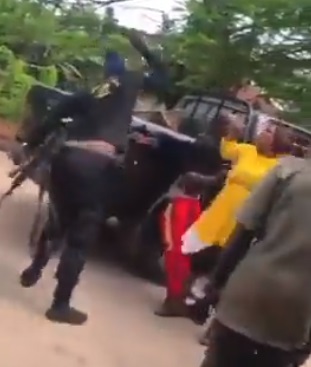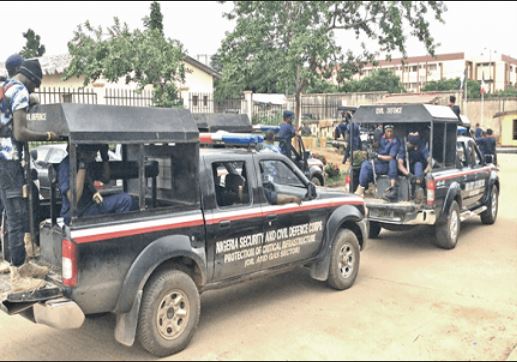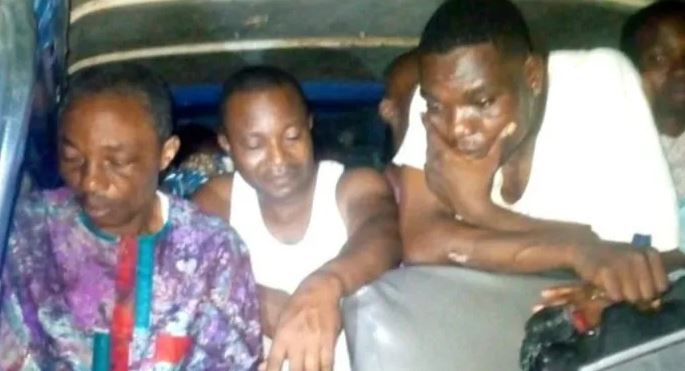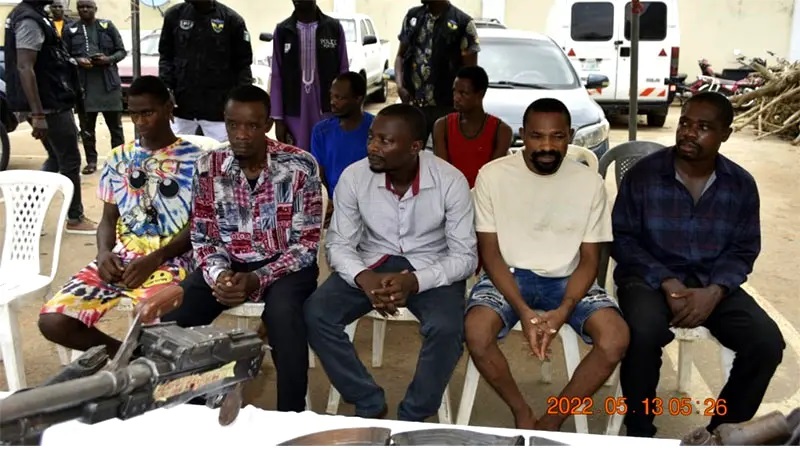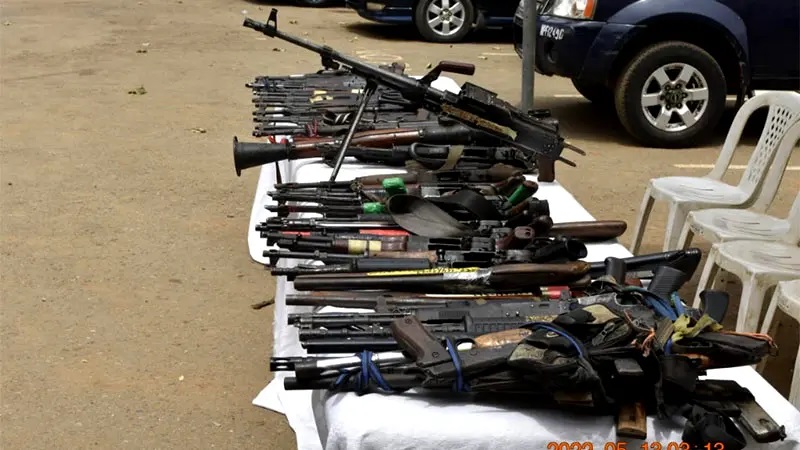
Michael Abiodun

In what is going to come throughout as a very stunning improvement, a Nigerian businessman has been overwhelmed to demise by one other man in Italy.
The Italian police have since arrested the person who brutally beat the Nigerian man, Alika Ogorchukwu to demise on a busy seaside city on Friday.
The incident occurred publicly whereas onlookers filmed how the aggressive man beat and strangled the physically-challenged Ogorchukwu to demise with none obvious try and intervene.
In keeping with Washington Submit, the video footage of the assault has circulated extensively on Italian information web sites and social media, attracting outrage as Italy enters a parliamentary election marketing campaign during which the right-wing coalition has already made immigration a difficulty.
“The murder of Alika Ogorchukwu is dismaying,’’ Enrico Letta, the head of the left-wing Democratic Party, wrote Saturday on Twitter, naming the vendor who died Friday. “Unheard of ferocity. Widespread indifference. There can be no justification.”
Proper-wing chief Matteo Salvini, who’s making safety a elementary level of his marketing campaign, additionally expressed outrage over the demise, saying “security has no color and needs to return to being a right.”
Studies revealed that Ogorchukwu, 39, was promoting items Friday on the primary road of Civitanova Marche, a seaside city on the Adriatic Sea, when his attacker grabbed his crutch and struck him down, in keeping with police.
The video confirmed the assailant wrestling the sufferer onto his again on the pavement as he fought again, finally subduing him with the load of his physique.
“The aggressor went after the sufferer, first hitting him with a crutch. He made him fall to the bottom, then he completed, inflicting the demise, hitting him repeatedly together with his naked palms,’’ the city’s chief commissioner, Fabio Mazza, informed a press convention.
Police investigator Matteo Luconi informed Italian information channel Sky TG24 that onlookers known as police, who responded after the suspect had fled and tried to manage assist to the sufferer.
However, police used road cameras to trace the assailant’s actions and detained a person recognized as Filippo Claudio Giuseppe Ferlazzo, 32. He was being held on suspicion of homicide and theft for allegedly taking the sufferer’s cellphone.
Luconi informed Sky TG24 the assailant received offended and aggressive following Ogorchukwu’s “insistent” requests for pocket change.
Police had been questioning witnesses and viewing movies of the assault. They mentioned the suspect has made no assertion.
Ogorchukwu, who was married with two kids, resorted to promoting items on the road after he was struck by a automobile and misplaced his job as a labourer as a consequence of his accidents, mentioned Daniel Amanza, who runs the ACSIM affiliation for immigrants within the Marche area’s Macerata province.
Amanza gave a unique model of what occurred, saying the attacker grew to become infuriated when Ogorchukwu informed the person’s companion she was lovely.
“This praise killed him,’’ Amanza informed The Related Press.
“The tragic reality is that there have been many individuals close by. They filmed, saying ‘Stop,’ however nobody moved to separate them,’’ Amanza mentioned.
Macerata was the positioning of a 2018 capturing spree concentrating on African immigrants that wounded six folks. Luca Traini, 31, was sentenced to 12 years in jail for the shootings, which Italy’s highest courtroom confirmed certified as a hate crime.
Civitanova Marche’s mayor, Fabrizio Ciarapica, met with members of the Nigerian neighborhood after tons of demonstrated on Saturday.
“My condemnation is not only for the (crime) but it is also for the indifference,’’ Ciarapica told Sky. ”That is one thing that has shocked residents.”
Even Time, the Great Destroyer, will have to trysmall before erasing MKO Abiola from the minds of Nigerians. MKO. Abiola. The Man. The Enigma. The Hero. Here is the gripping story of Mosudi, the child of poor Salawu who refused to bow before a crushingly violent Nigerian military, his former ally. A tiger of an ally.
★DEDICATION★
his piece is written in honour of and dedicated to all the unsung Nigerian protesters and innocent citizens who suffered terrible losses or lost their lives in the riots that engulfed our nation over the June 12 crisis. It is for these unknown legends that my pen is dancing.
INTRODUCTION
One thing that really got me interested in the late MKO Abiola was his smile. Dancing on his chubby cheeks, his smiles were so broad, so warm and so genuine. Inviting. He radiated happiness, joy and tranquility. They were just too charming to be faked. In the eyes of my mind, I can still feel the glowing warmth of his smiles beyond the grave and the cackle of his hearty laughter. But MKO was human like this writer and the Bashorun of Gbogbo Ibadanland, the Aare Ona Kakanfo of Yorubaland shed tears too. He felt pain, he felt betrayal, he knew hurt. He was human. He came, he saw and died in battle.
BIRTH, EARLY DAYS AND BACKGROUND

THE EARLY DAYS: A young MKO Abiola. Photo credits: MKOAbiola.org
He was born on a Wednesday in Abeokuta, Ogun State, the 24th of August in 1937. He stated that his parents were too poor to send him to school. His father, Alhaji Salawu Adelekan Alao Akanni Abiola was a small-time cocoa farmer while the mother, Alhaja Zeliat (Suliat) Wuraola Ayinke Abiola (nee Kassim) also tried to eke out a living from petty trading.
He was the 23rd child of his father and he was named Kashimawo meaning ‘Let us wait and see‘ because they thought he would also die like his previous siblings. I guess infant mortality has been an issue in Nigeria for quite a long time. But when he turned 15 and did not die, his overjoyous father properly renamed him Moshood. MKO was the first child of the man to survive infancy.
EDUCATION AND SCHOOLING
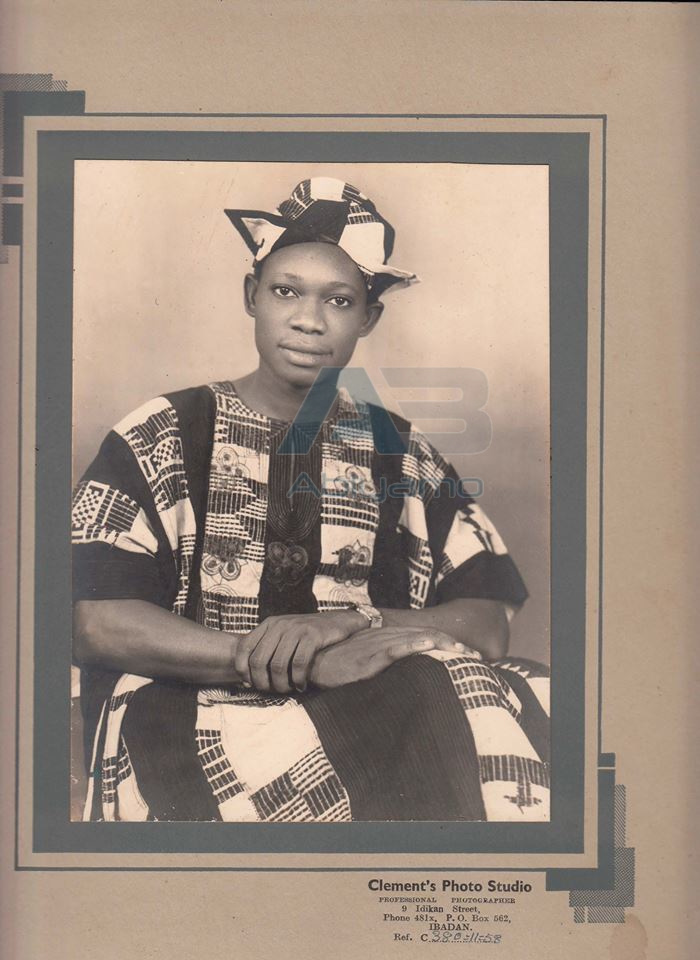
Although he was from a background of poverty, MKO Abiola was so brilliant in school that he got scholarship grants. Before then, he would gather wood and sticks from the forest at dawn and sell before going to school. He was just nine years old then. He would later see himself to the secondary school with the funds he made from his band. From 1952 to 1954, he was a schoolboy musician (he would later invest in Decca because of his love for music). For primary education, he went to Nawar-ud-Deen School, Abeokuta (1944) and later, the Africa Central School, Abeokuta (1945-1950
MKO Abiola attended the Baptist Boys High School (BBHS) in Abeokuta where he performed brilliantly where he later benefitted from the scholarship of the Nigerian Baptist Church from 1951-1956. MKO Abiola later said that if not for the Baptist Church, he would have been a poor vulcanizer labouring under the sun somewhere in Abeokuta. Olusegun Obasanjo was also in the same school with him and while Abiola was the editor of the school magazine (The Trumpeter), Obasanjo was the deputy editor (you go fear open letter from deputy editor na…lol).
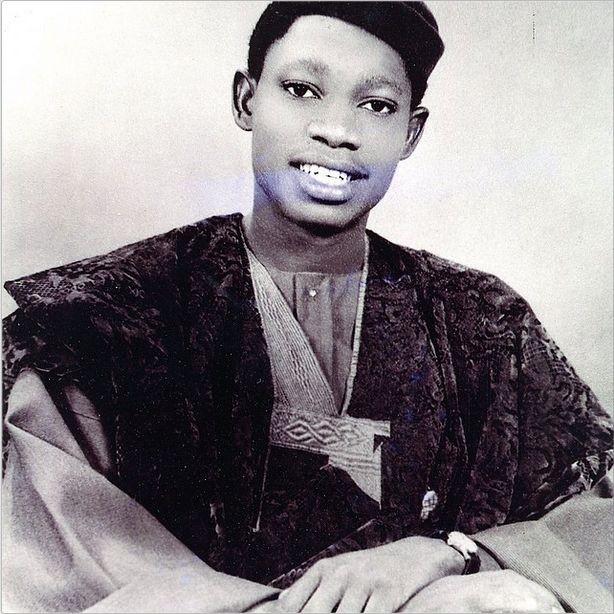
As a youngster.
Later, MKO Abiola attended the University of Glasgow in Scotland from 1961 to 1963 on the scholarship given to him the defunct Western Region government to study accountancy at the university’s Department of Management Accountancy. From 1963 to 1965, he attended the Institute of Chartered Accountants of Scotland. He later finished with the following qualifications: F.T.I.I., F.C.I.S, C.A., F. Inst.M., F.C.A., F.N.I.M.
During the 1962/1963 session, MKO won the 1st Prizes in Political Economy, Commercial Law and Management Accountancy. In 1964, he got a distinction in the F.T.II and in 1964, he bagged a distinction at the Institute of Chartered Accountants of Scotland. That was not all, he also bagged the Queen Elizabeth Prize in the CIS in 1964.
MKO had joined the pan-Nigerian National Council of Nigeria and the Cameroons at the age of 19 while still in high school.
EARLY CAREER, GOING INTO BUSINESS AND HOW HE MADE HIS MONEY
When MKO Abiola turned 15, he formed a music band singing agidigbo music with other young chaps (they called him the son of Salawu who goes about singing agidibo music) around and they would go round playing at events in return for food. Okay, he specifically played and was paid with 48 wraps of amala with stew and vegetable soup plus one naira and five kobo (ten and half shillings).
His family would eagerly wait for the balls of amala to feed. He would later increase his charges to two naira, twenty kobo (two guineas). As the leader of the band, MKO pocketed half of the proceeds with which he supported his family. And for the first time in his life, MKO Abiola was able to help those poorer than him. He had become a young philanthropist.
In 1956, he started work with Barclays Plc on Bank Road, Ibadan, Oyo State as a bank clerk (December 1956-December 1958). He finally ended with ITT ( International Telephone and Telegraph Corporation) Corporation where he really hit it big. Abiola worked with ITT from 1969 to 1988. The following is an overview of his career after he worked with Barclays:
-Executive Officer (Accounts) and later the H.E.O. (Accounts) at the Western Region Finance Corporation from December 1958- February 1961.
-C.A Student, Glasgow, Scotland from February 1961 – February 1966
– Senior Accountant, Lagos University Teaching Hospital (LUTH) and College of Medicine, April 1966 – June 1967.
-Divisional Controller, Pfizer Products Agricultural Division for West Africa.
-Controller, ITT Nigeria from August 1968 to June 1969.
-Managing Director, ITT Nigeria Limited from June 1969 to December 1969.
-Chairman and Chief Executive, ITT Nigeria Limited (assumed position in December 1970). He would later become the Vice President for ITT (Africa, Middle East and Europe).
-Founder, Chairman/Chief Executive, Radio Communications Nigeria Limited (assumed position in February 1974).
-Founder, Chairman/Chief Executive, Wonder Bakeries Limited (assumed position in January 1980).
-Founder, Publisher, Chairman/Chief Executive, Concord Press of Nigeria Limited (assumed position in March 1980).
-Chairman, Banuso Fisheries Nigeria Limited (assumed position in January 1983).
-Founder, Chairman/Chief Executive, Abiola Farms Limited (assumed position in February 1985).
-Founder, Chairman/Chief Executive, Concord Airlines Limited (assumed November 1987).
-Executive Vice- President of Alcatel International (assumed position in 1988).
HOW HE MADE IT BIG IN ITT
In the following sections, you will read how Abiola and Murtala Muhammed almost exchanged blows over money but after that saga, MKO got the money and excitedly, he went to report to his ITT office. On getting to the office, he met his white boss dead drunk. He then called on a photographer and they snapped the drunk dude. Abiola got the photograph and headed straight for the New York headquarters of ITT. On getting there, he flipped out the cheque of seven million naira, brandished it before their faces and told his superiors that unless the drunk guy in the picture was sacked and replaced with him, he would there and then tear the cheque into pieces.
Ehn! The eyes of his superiors lit up! Yeepa! We are talking of 3.5 million pounds here and they were not going to lose that because of one intoxicated mugu, not the money that they’d be trying to get for over three years. Sharp sharp, they recalled the white guy and MKO Abiola became the big boss. He had arrived.
BECOMING FRIENDS WITH THE MILITARY
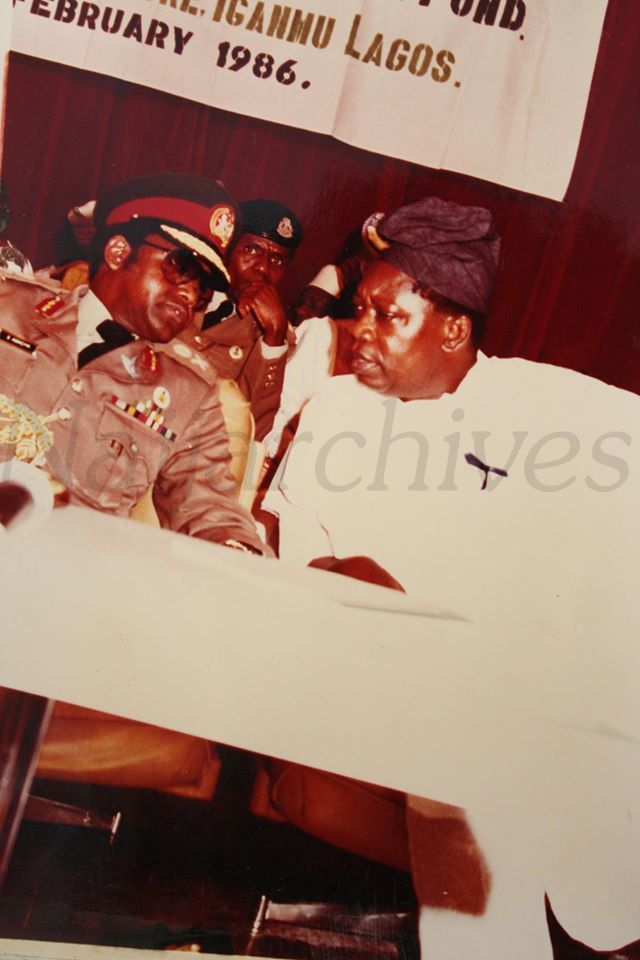
Sani Abacha General and MKO Abiola In February 1986 At Iganmu, Lagos
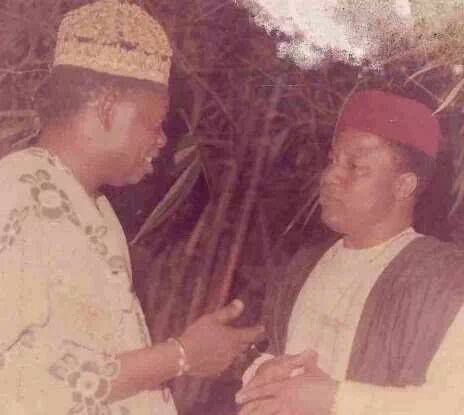
MKO Abiola’s foray into politics is a convoluted one in the sense that it did not actually start out with a clear political end in mind. An astute businessman and dedicated accountant, MKO Abiola’s early days were like that of any other entrepreneur –maximize profits and minimize costs.
However, when MKO Abiola became friends with the military boys, his fate took another turn, one that would eventually land the Bashorun six feet under. The late General Murtala Muhammed became friends with MKO under very funny circumstances which will be explained shortly. In the year 1975, Murtala Muhammed became the Federal Commissioner (Minister) of Communications under the Yakubu Gowon government.
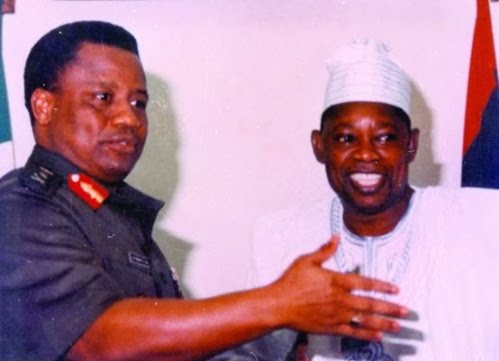
ALLIES: The khaki boy and the tycoon.
-Business had brought MKO Abiola and his military friend, General Murtala together. MKO Abiola was to execute communication contracts for the military in return for favourable business deals. The military boys on the hand, would also benefit from sweet deals and kickbacks (for your information, there was a Lockheed scandal involving the highest-ranking officers of the Nigerian Air Force under Gowon).
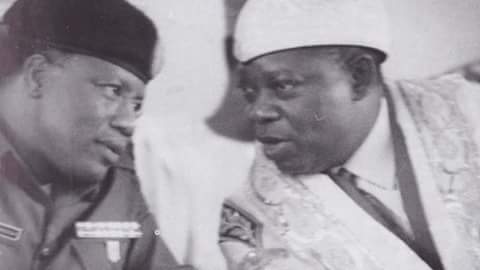
MKO Abiola and Ibrahim Babangida
But how did Murtala and MKO become friends? It was all about money o. Money would cause kasala. The Federal Government owed the company of their friend-contractor, International TT, the huge sum of N7,000,000 (seven million naira). For more than three and half years, they kept posting MKO Abiola and a dime was not paid to him. In trying to get his payment, MKO inadvertently clashed with his ferociously angry friend, General Murtala (who was then a Colonel in the Nigerian Army and was the Commander of the Signal Corps).
The clash with Murtala, a man known for his volcanic temper and the anger of a nuclear weapon almost led to the two men exchanging blows. Murtala shouted and Abiola shouted back. The government would either pay him or two deadi bodies go meet Baba God. He would not leave that place until they paid him the money shangiliti. An incorrigibly stubborn Murtala had just met an equally tenaciously unwilling Abiola. Iron had just met iron and one has to bend…

Lieutenant Colonel Murtala Muhammed, centre, with unidentified officers, near Benin, Nigeria, Sept. 23, 1967. (AP Photo)
STUBBORN: Murtala, shown in here in the middle in 1967. He and MKO almost exchanged blows over money. Photo credits: AP/UYI OBASEKI/NIGERIAN NOSTALGIA PROJECT.
At that point, Hassan Umar Katsina, the Chief of Army Staff came in and intervened. The matter was settled and a cheque was issued to a jubilant MKO.
An obstinate man of fire and steel himself, Murtala was impressed with the courage of this ‘bloody’ civilian who looked him in the eye and stood his ground. He was not even afraid of all the guns and soldiers. That was Abiola, he could be very fearless and stubborn, especially when it comes to what he strongly believed in. His courage would later lead to him giving the ultimate sacrifice for democracy to thrive in Nigeria.
After the all the fury, the encounter came to a mild end. Abiola got his money and the duo became nice friends. Abiola’s warm relationship had started, and ironically, same was the trip to his own early grave. The rapport with the military continued even after Murtala’s assassination in 1976. When Obasanjo came to power, it continued until Baba Iyabo handed over to Shagari and MKO attempted to mutate and go with the flow of the turbulent world of politics.
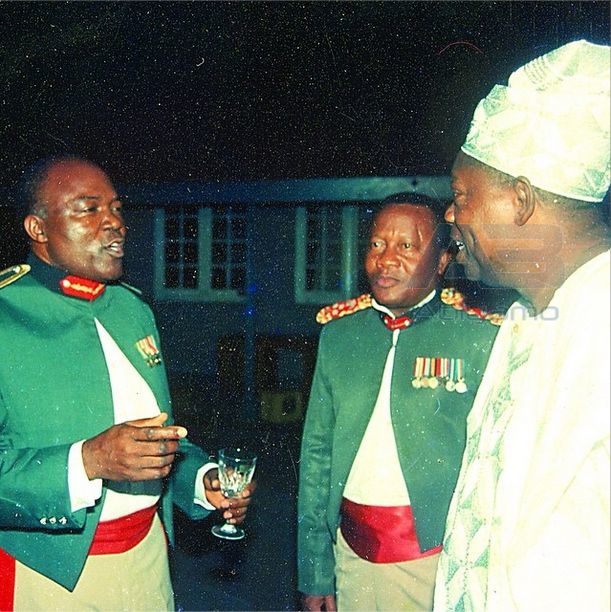
BUDDIES: MKO Abiola with Lt. General Jeremiah Useni at a ceremony for generals and top-ranking military officials.
After the saga of politics with Shagari and the rest, Abiola would later become very visible during IBB’s regime (MKO was accused of providing a hefty sum of $10million during the naming ceremony of his child to IBB who was a guest for the overthrow of the Buhari/Idiagbon regime which impounded a huge consignment of contraband newsprint that Abiola had imported into the nation).
He publicly supported IBB’s policies and did not even hide the rapport. In fact, he gave out his senior editor at Concord, Duro Onabule, to serve as IBB’s Chief Press Secretary. In 1993, MKO Abiola instructed Bayo Onanuga to apologize to Babangida for an article in 1992 (the edition was titled Has Babangida Given Up?) that was critical of the military president, see below:
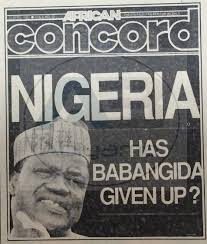
An irate Babangida had closed down the publication and demanded an apology before it would be reopened. But rather than apologize, Onanuga left Abiola’s media empire and alongside his friend Babafemi Ojudu (now a Senator representing Ekiti State Central) , Dapo Olorunyomi, Kunle Ajibade and one other staff member at the African Concord formed their own publication and named it TheNews.Onanuga is now the brain behind what many Nigerians now know as PM News, one of the hottest online news portals for Nigerians. Upon walking out on MKO and his military friend, Onanuga said:
Journalism is not meant to make the environment cosy for leaders of nations. It is meant to prod them to act in the interest of the larger society. It is meant to give them sleepless nights.
THE BUSINESS GURU
Abiola bestrode the business world like a colossus and here is a breakdown of his roles and positions:
-He was the Chairman and Chief Executive, ITT Nigeria Limited.
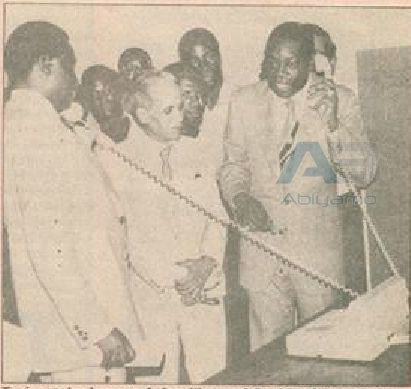
As the ITT boss.
-Founder, Publisher and Chairman/Chief Executive, Concord Press Nigeria.
-Founder and Chairman and Chief Executive, Radio Communications (Nigeria) Ltd.
-Founder, Chairman and Chief Executive, Wonder Bakeries Limited.
-Chairman, Summit Oil International Limited (this was the largest Nigerian-owned oil exploration company).
-Founder, Chairman and Chief Executive, Abiola Farms Limited.
-Founder, Chairman and Chief Executive, Concord Airlines Limited.
-Chairman, Decca WA Limited (later Afrodisia Limited).
-MKO Abiola was also the Chairman/Chief Executive of Low Priced Books Limited, African Economic Digest, Abiola Bookshop Press Limited, African Concord Limited and Abiola Bookshops Limited.
At a point in the 1980s, Abiola’s firms and companies employed over 5,000 people in Nigeria and all over the West African subregion.
ENTERING POLITICS

CHIEFTAINS: MKO Abiola talking with Chief Gabriel Igbinedion, Bamanga Tukur (current PDP chairman) at an SDP convention in the 1990s.
-MKO came into the public limelight in 1978 when he was appointed to the Constituent Assembly.
-The time came in 1979 when General Olusegun Obasanjo wanted to hand over to a civilian government, the field was suddenly opened to ambitious politicians like the late Chief Obafemi Awolowo, Alhaji Shehu Shagari and others. However, MKO Abiola, who entered partisan politics in 1978 when he joined the National Party of Nigeria (NPN), colluded with the military working towards the eventual defeat of Awolowo. MKO’s ambition to become the Chairman of the NPN would be frustrated by a combination of forces dreading his wealth and influential position, and also adding to the fact that MKO intended to use the chairmanship post to actualize his presidential ambition. When he could not achieve this, he stormed out of the NPN with fury.
NPN was the party of President Shagari and one of his ministers, Umaru Dikko (transport) even taunted Abiola that the presidency was not for sale. When MKO Abiola joined the NPN, it was the ruling party and they were in control of Kwara, Bauchi, Niger, Rivers, Sokoto, Benue and Cross River states. There were four other political parties making a total of five registered parties. These were the:
-Unity Party of Nigeria (UPN): This was Chief Obafemi Awolowo’s party and he had lost the presidential elections to Shagari. However, his party was in total control in the five Southwestern/Midwest states of Lagos, Ondo, Oyo, Ogun and Bendel.
-Great Nigerian Peoples Party (GNPP): This party was led by Alhaji Waziri Ibrahim and the party was in control of Borno and Gongola States.
– Nigerian Peoples Party (NPP): This party was led by the Owelle of Onitsha, Dr. Nnamdi Azikiwe and was in firm hold of Imo, Anambra and Plateau States.
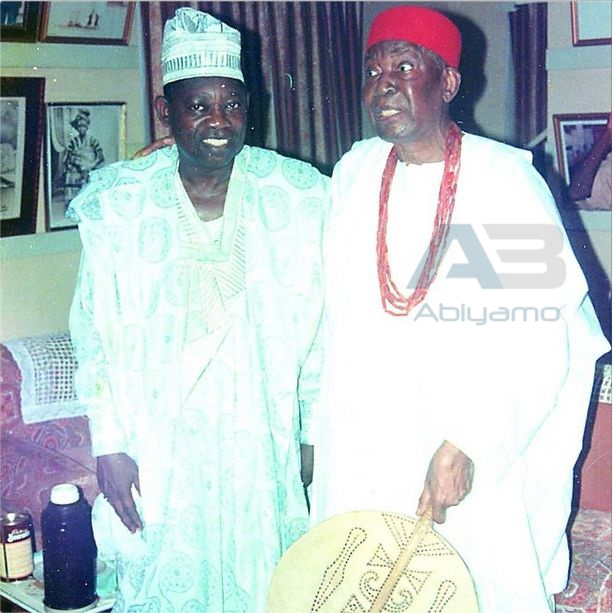
Nnamdi Azikiwe & MKO Abiola, his influence cut across tribal and religious differences.
– Peoples Redemption Party (PRP): This was the party of the late Mallam Aminu Kano and controlled Kano and Kaduna States.
– After MKO Abiola stormed out of the NPN, he retraced his steps back to the UPN, Awolowo’s party. He even went to Mama HID Awolowo and prostrated stating that he would not stand up until Mama forgave him for his sins. He was forgiven and later swept Ogun State with 97%, even trouncing Obafemi Awolowo’s records. Following Shagari’s victory, MKO had faded away from politics and continued making his money only for him to get involved in some clandestine activities with his military friends.
– MKO later became disgruntled and dissatisfied with his army friends in power. At a seminar of the Nigerian Army in Minna, Niger State in 1984 during the Buhari regime, MKO did not hold back its scathing criticism of the military government. He blasted:
If we are to turn our backs on our past mistakes, we must sincerely and vigorously pursue the idea of accountability of government to the people. Government by secrecy and concealment was largely responsible for the injustice, the corruption and the mistakes of the last administration. Now, we seem to be accepting that the ‘public’s right to know’ is inconsistent with military rule. I firmly believe that this is only a smokescreen. People’s right to know, which promotes accountability, does not relate to any specific form of government. It is rather a question of attitude. Any system that holds that the people are entitled to maximum information about how their governments operate, so that it can be more responsible and accountable to them, will welcome the idea of less secrecy and concealment…
Abiola and IBB’s friendship blossomed with time but as IBB was reluctant to vacate the seat of power even after MKO had given him the sum of $10 million to help overthrow the duo of Buhari and Idiagbon in August 1985, their relationship would become strained.
It became so bad that by March 1992, Abiola’s media outfit via its African Concord magazine was firing a salvo of criticism against the IBB regime. The military junta responded by closing down all of Bashorun’s businesses domiciled in Nigeria, both the media-based and the ones related to the media. Things had started falling apart. Their relationship would then assume a sweet-sour dimension.
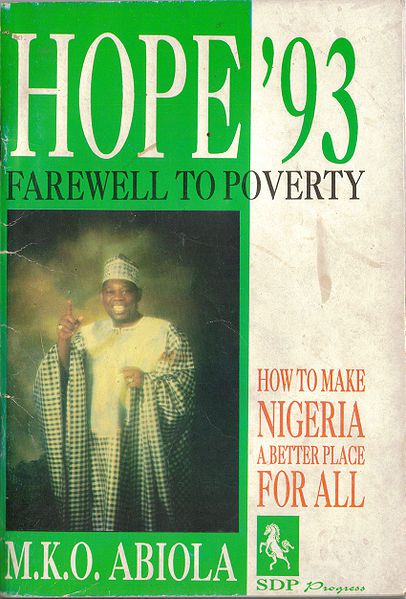
MKO ABIOLA THE SOCIALITE
The following are memorable pictures of MKO Abiola during his lifetime. He was a very sociable man, highly gregarious and leaving an imprint in the minds of those that met him.
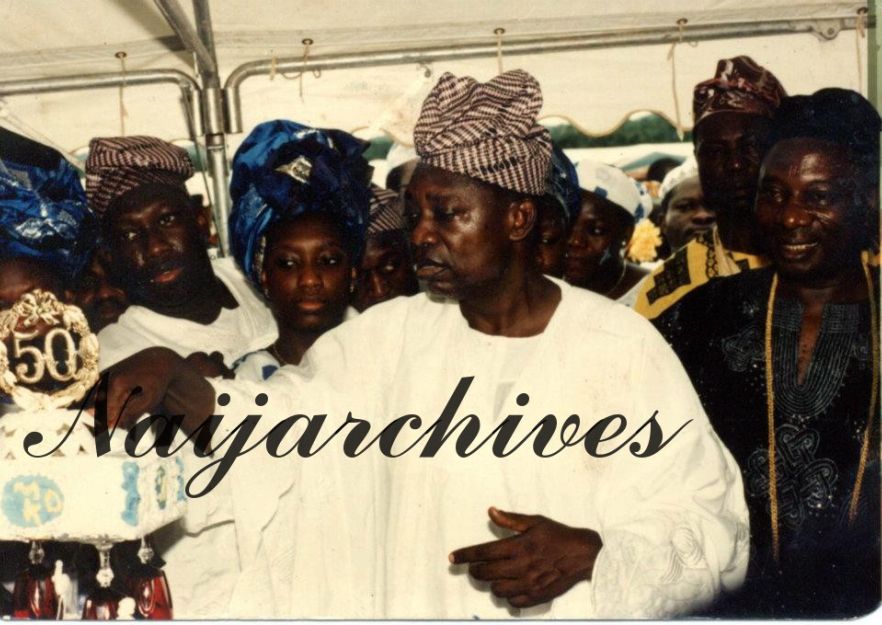
Cutting the cake as Abiola turned 50 in 1987, with him on that special day is the Soun of Ogbomoso, Oba Oladunni Oyewumi, Ajagungbade III. PHOTO CREDITS: Professor Oluwatoyin Kole, Florida, USA.
With Sir Shina Peters. The same SSP would later sing in 1998 for Abacha to continue in office.
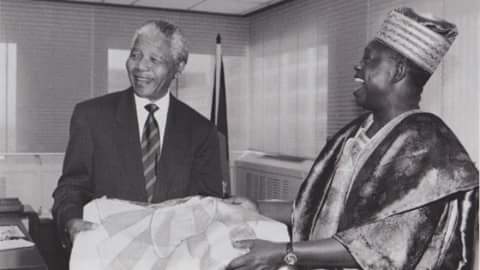
MKO and Mandela
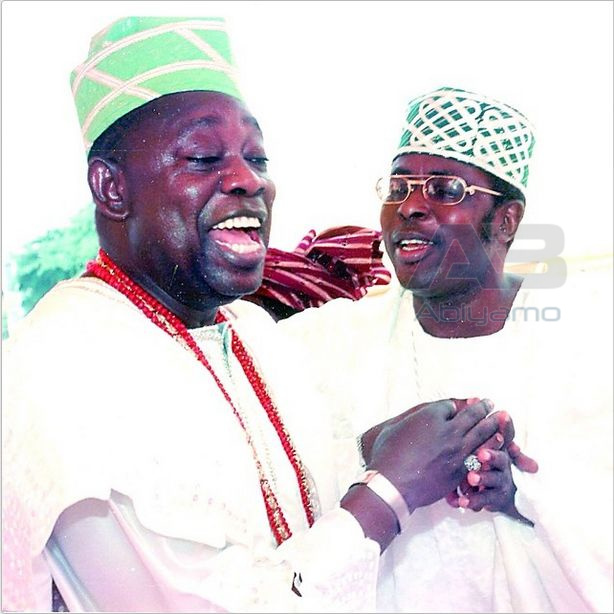
The Balogun MKO Abiola and The Akinrogun Olusegun Osoba, two prominent sons of Egbaland.
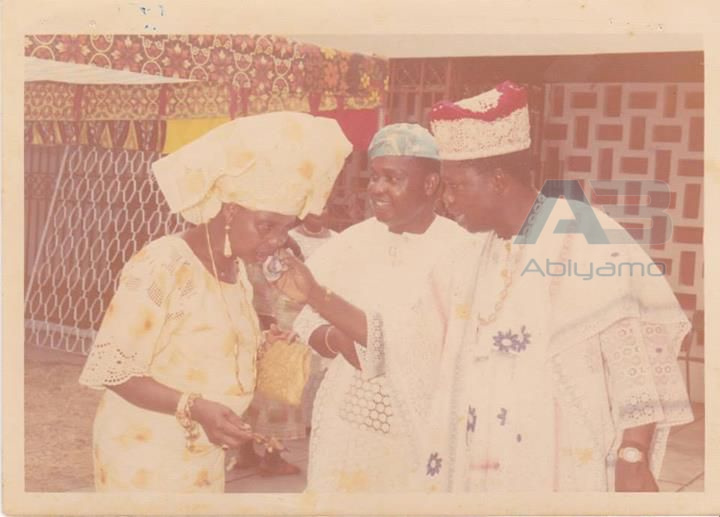
FAAJI: Wedding at the residence of Late Chief Olola Moyosore Aboderin off Marine Road, Apapa Wharf; Lagos, 1978. Photo credits: Ademola Oba-Gbadebo.

MKO Abiola with the Ooni of Ife, Oba Okunade Sijuwade, Olubuse II. Photo credits: Otunba RhodeIsland.
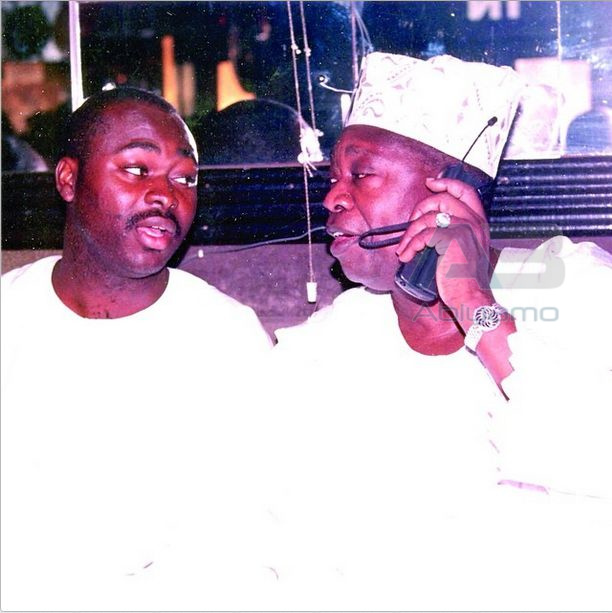
INSIDE NITESHIFT CLUB: MKO ABIOLA & his son-in-law FEMI KUKU at the nightclub where Abiola was hosted in March 1993.
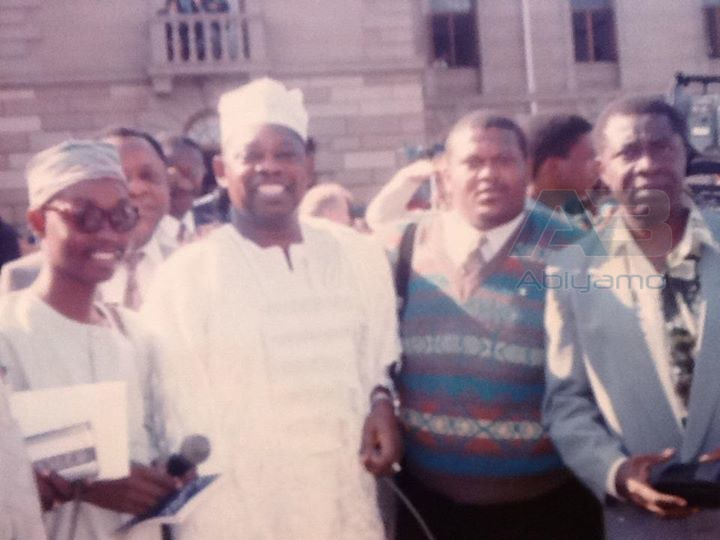
AT MANDELA’S INAUGURATION: Ogbonnaya Orji (Radio Nigeria), Yemi Fakayejo (Voice of Nigeria) & Chris Ngwu (NTA) with Chief M.K.O. Abiola in Pretoria, during the inauguration of Dr. Nelson Mandela as president in 1994. Photo credits: Adeyemi Fakayejo.
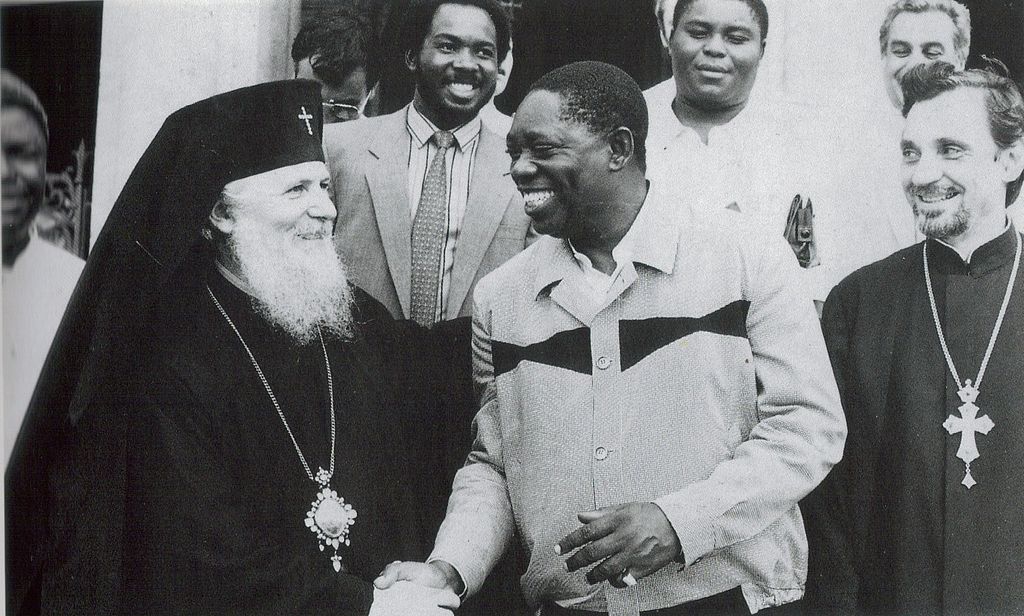
THE INTERNATIONAL MAN: Moshood Abiola with H.E. Pankratiy, Metropolitan of Stara Zagora and head of the Department for Ecumenical relations of the Bulgarian Orthodox church. Photo credits: Creative Commons.
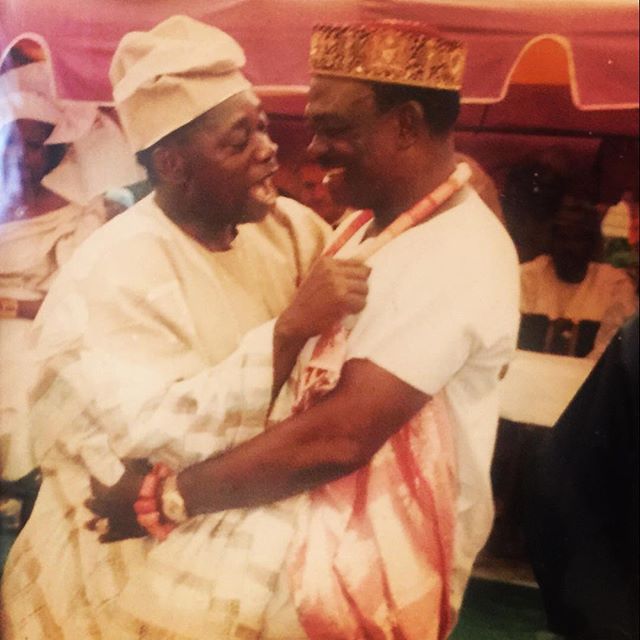
Bashorun Chief M.K.O. Abiola, embracing the Obarisi of Urhoboland, Olorogun James Ogboko-Edewor. Abeokuta meets Warri. Image credits: Moshood Edewor.
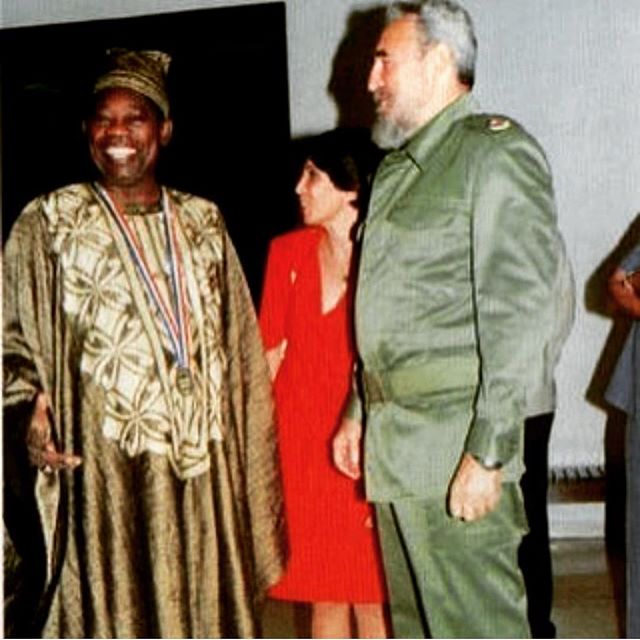
Fidel Castro and MKO Abiola

MKO Abiola with the late Alhaji Danjuma Haruna at an event. Photo credits: HONOURABLE MUHAMMED SANI IMAM

MKO Abiola with the late NF Aina. Credis: Sola Ige Jongbo.
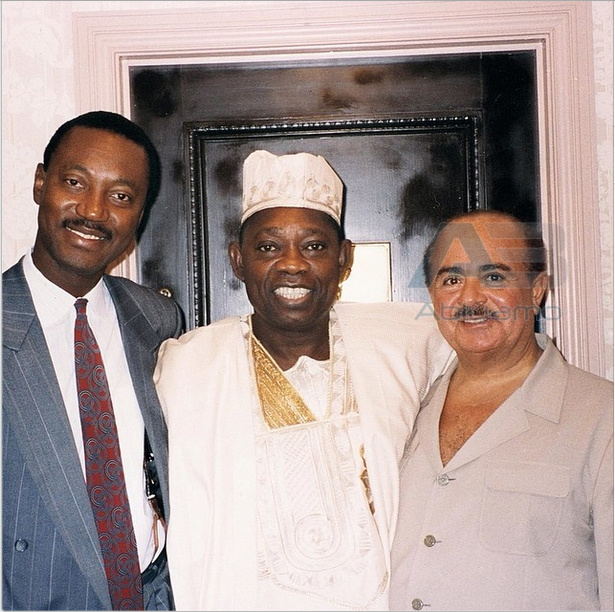
Dolapo Asiru, MKO Abiola and Adnan Khashoggi, a Saudi Arabian businessman who is best known for arms dealing. He is estimated to have had a peak net worth of around $4 billion USD in the early 1980s. He was reputed to be the richest arms dealer on the planet.
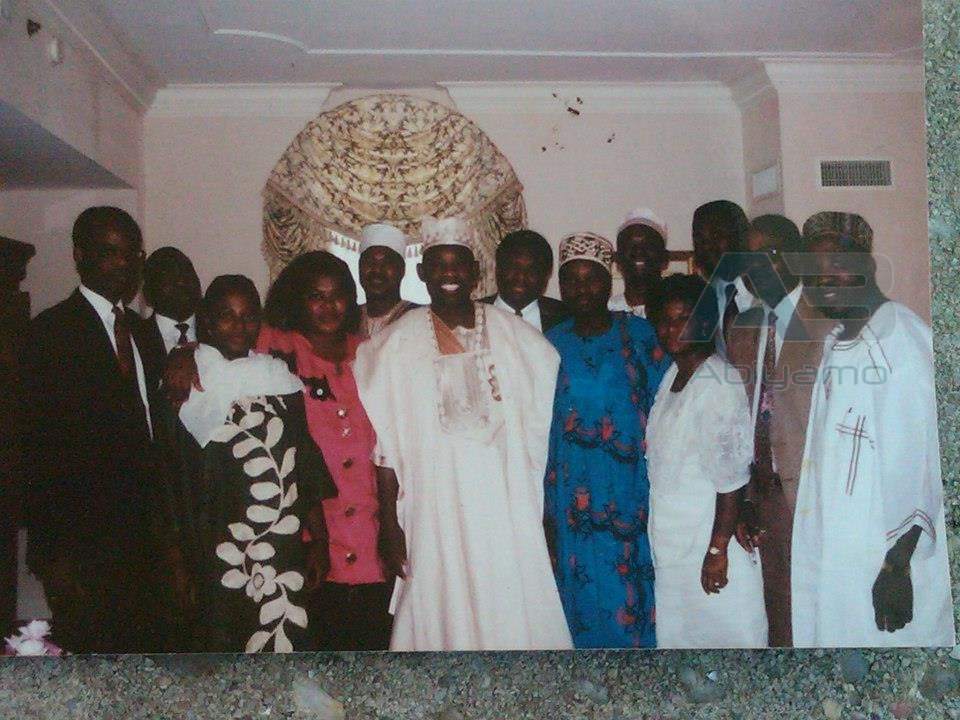
WITH SDP-USA: With Titus Folayan, Sola Ogunbode, Bukky Babalola (Oyingbo), The Princess, Jacob Sodiya, MKO Abiola, Abiodun Akinola, Diran Fadojutimi, Rose Ezidinma Ogbonna, Kunle Badmus, Muritala Akintunde, Muritala Akintunde (Olubadan) and Akib Abiola at MKO’s hotel suite on 16th and K Streets, NW, in Washington, DC, SDP-USA Executive, 1993. It was his first visit to the USA after having escaped Abacha’s cruelty. He would later return to Nigeria and be arrested. This is one of his last photos. Credits: Abiodun Adepoju.

MKO Abiola with Felix Jongbo. Credits: Sola Ige Jongbo.

MKO Abiola with Chief SK Babalola. Credits: Sola Ige Jongbo.

MKO Abiola with Chief Olumiluwa. Photo credits: Sola Ige Jongbo.

MKO Abiola with Ayo Adebowale. Credits: Sola Ige Jongbo.
MKO ABIOLA DURING AN ICAN CONFERENCE (see photos below: remember Abiola himself was a first-class accountant): Institute of Chartered Accountants of Nigeria (ICAN). At the conference, he was the Special Guest. All the credits for the pictures go to Rotarian Mr. Ademola Somorin, also of ICAN. Have a nice time with them!
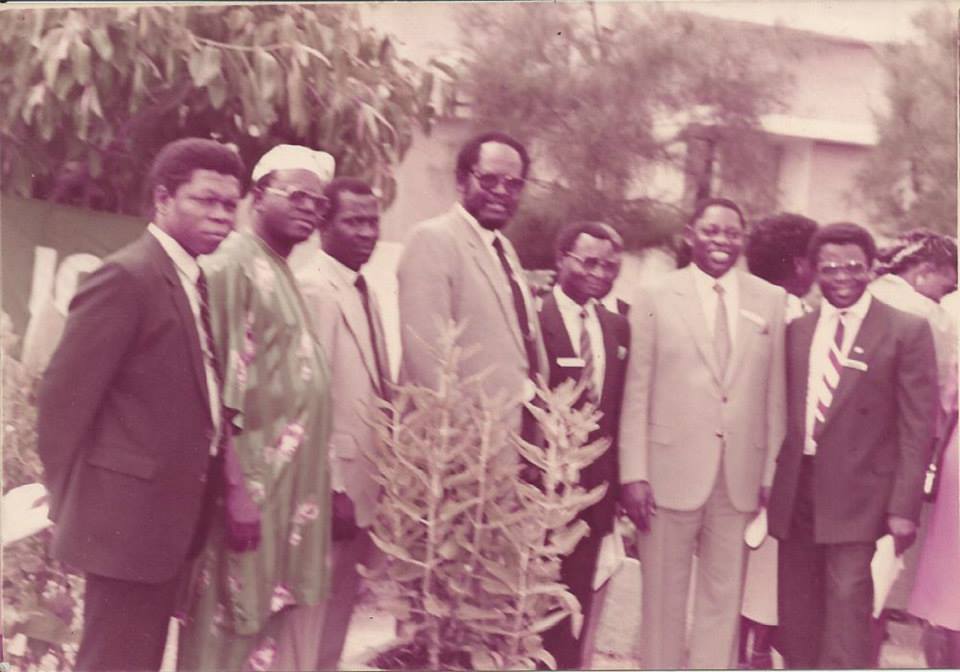
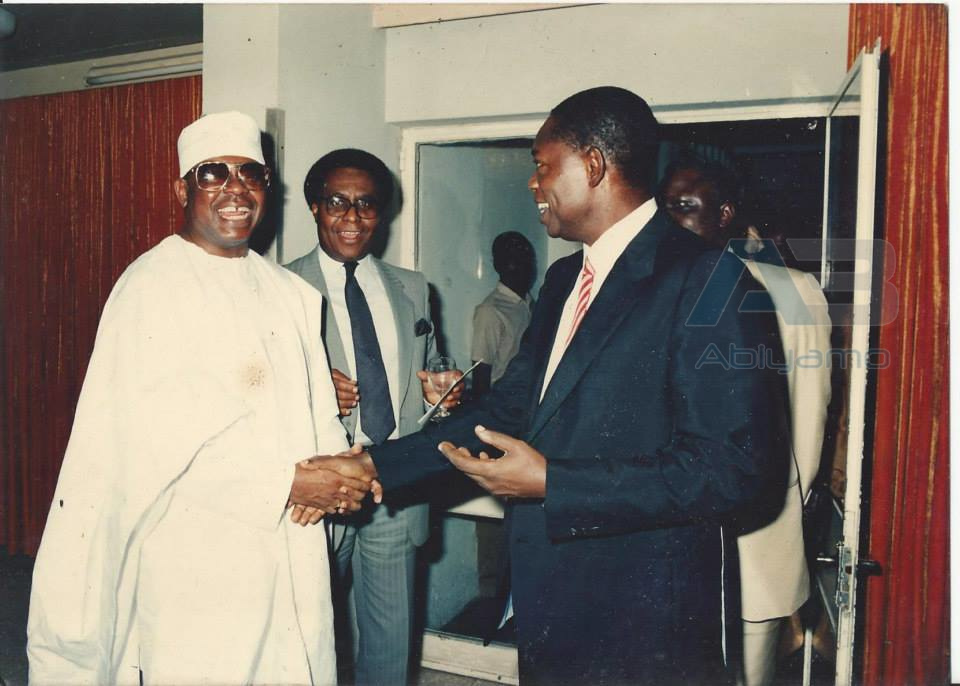
The special guests, Chief Subomi Balogun with late Chief M.K.O. Abiola.
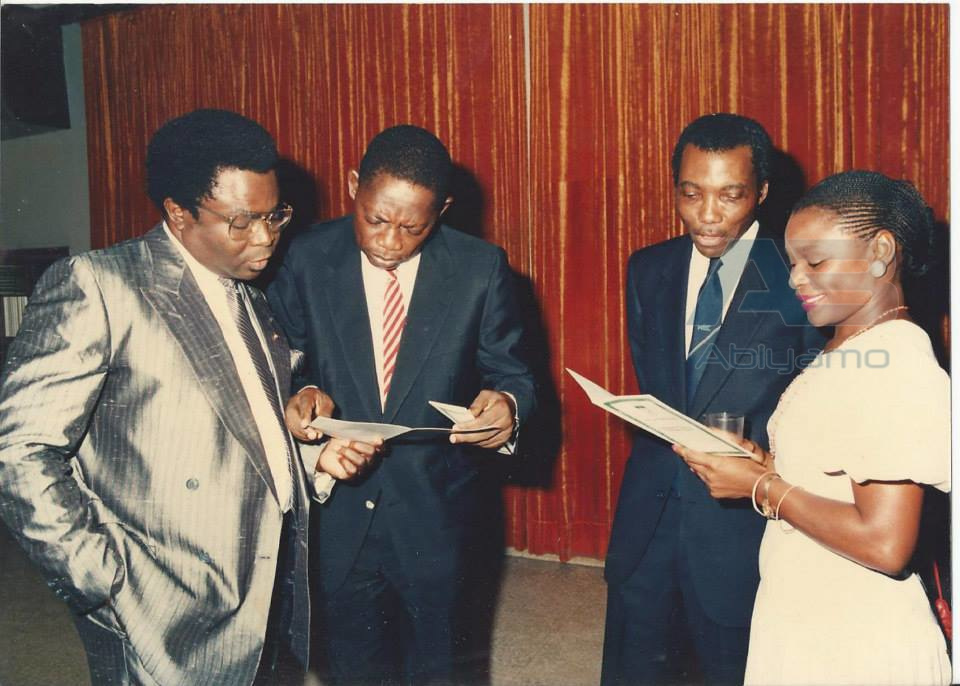
AT AN ICAN SEMINAR: From right to left, Ademola Somorin, late Chief MKO Abiola and some ICAN members at one of ICAN seminars.
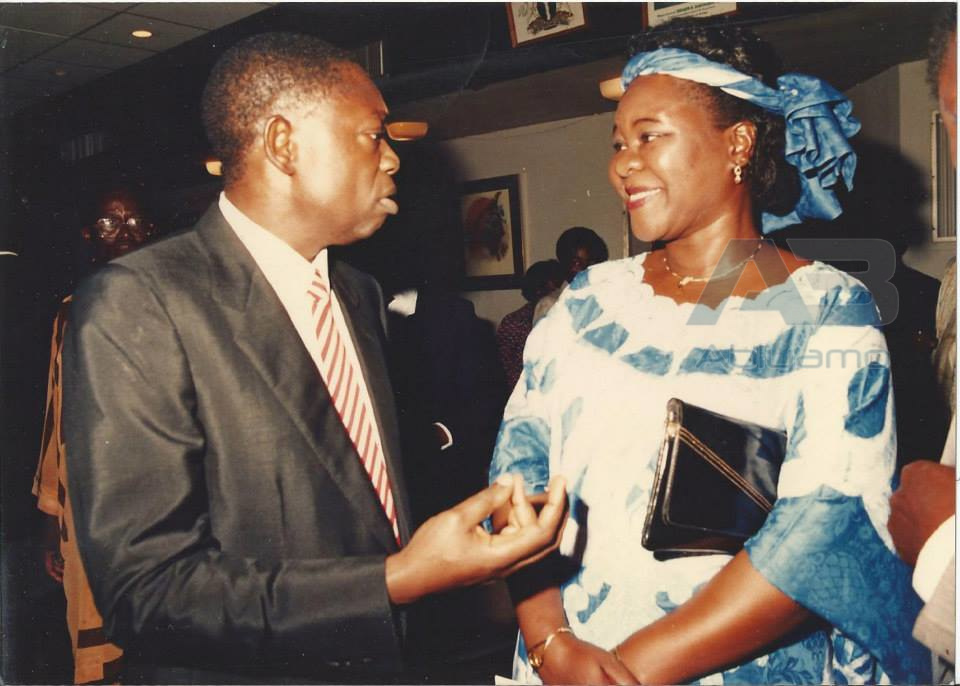
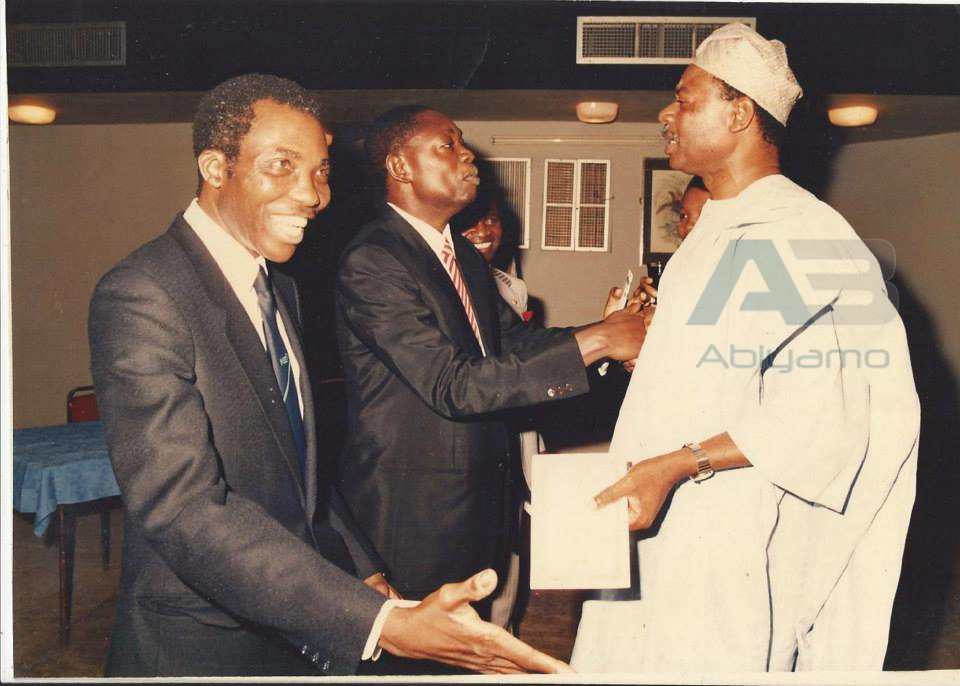
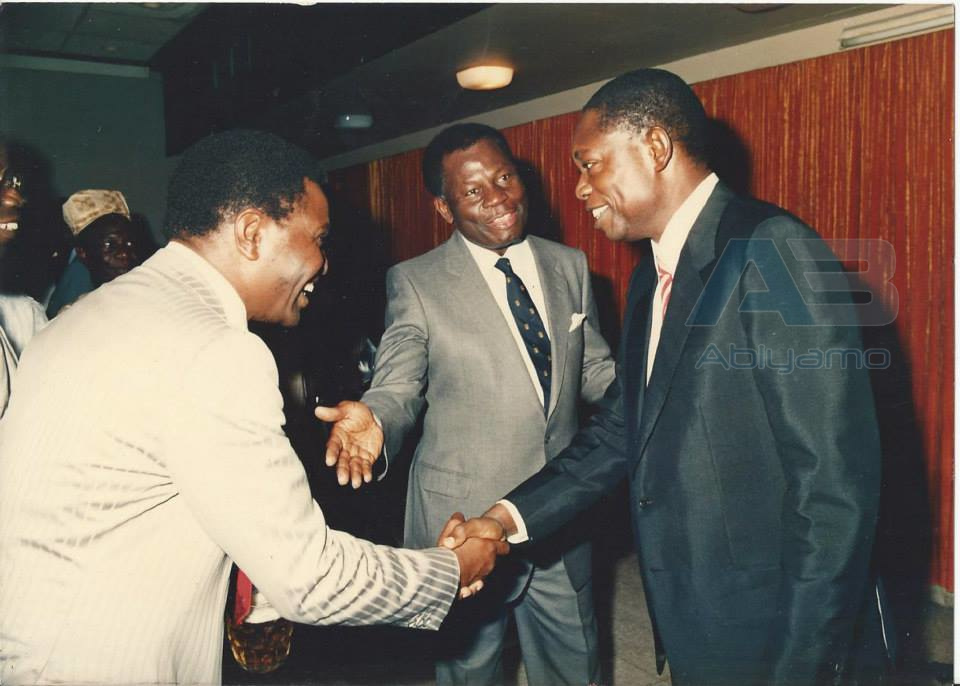

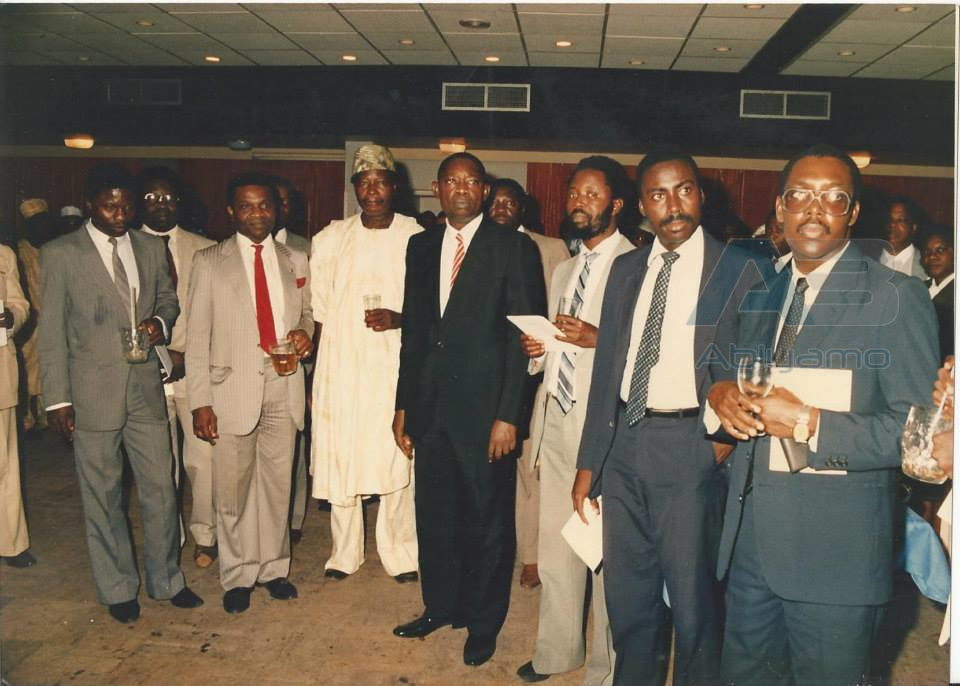
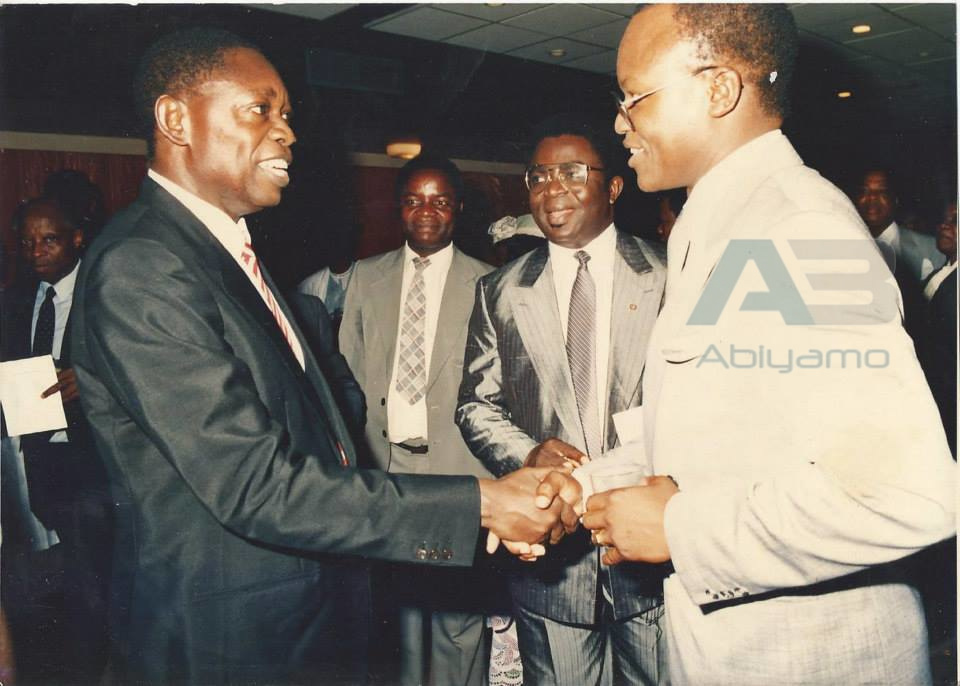
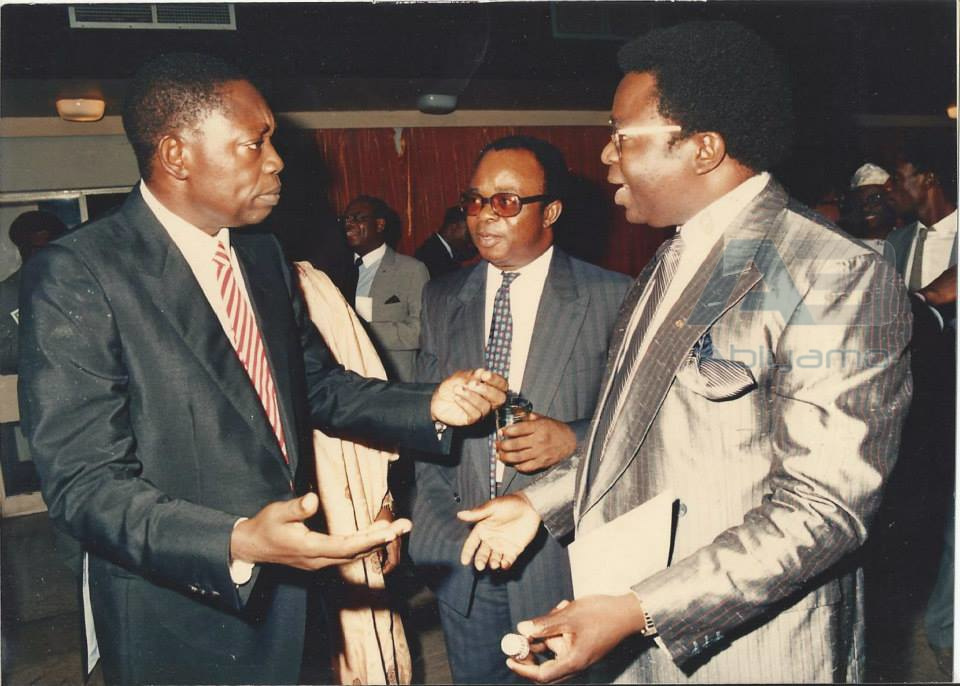
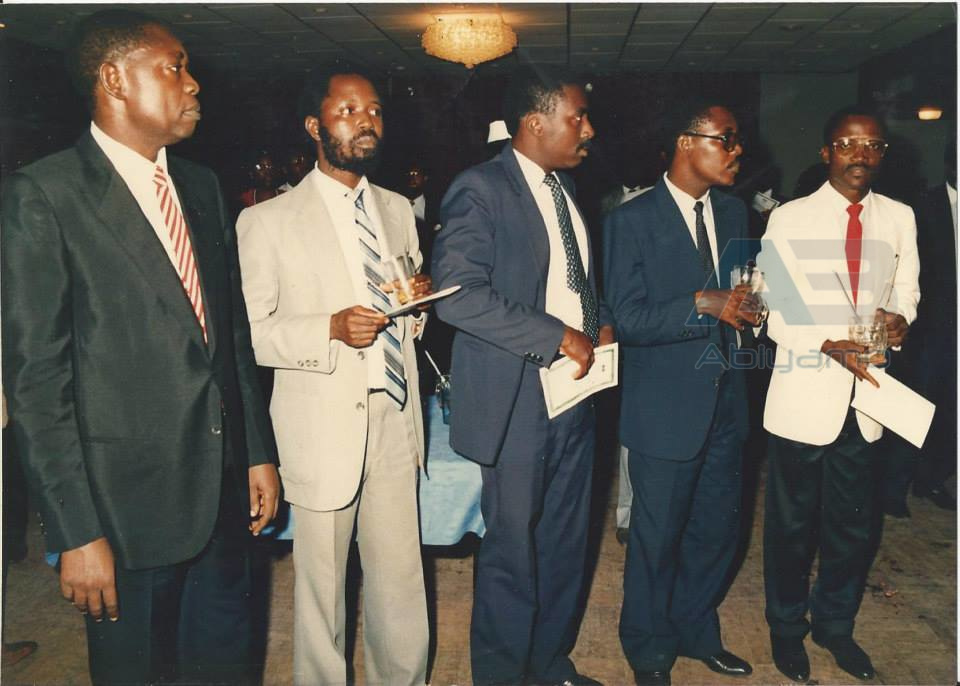
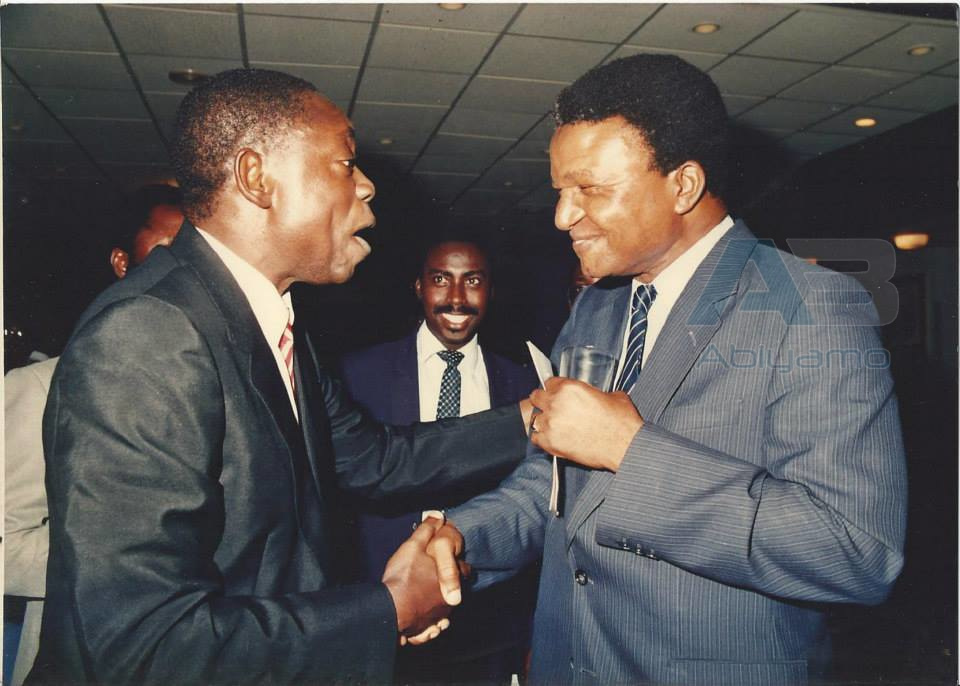
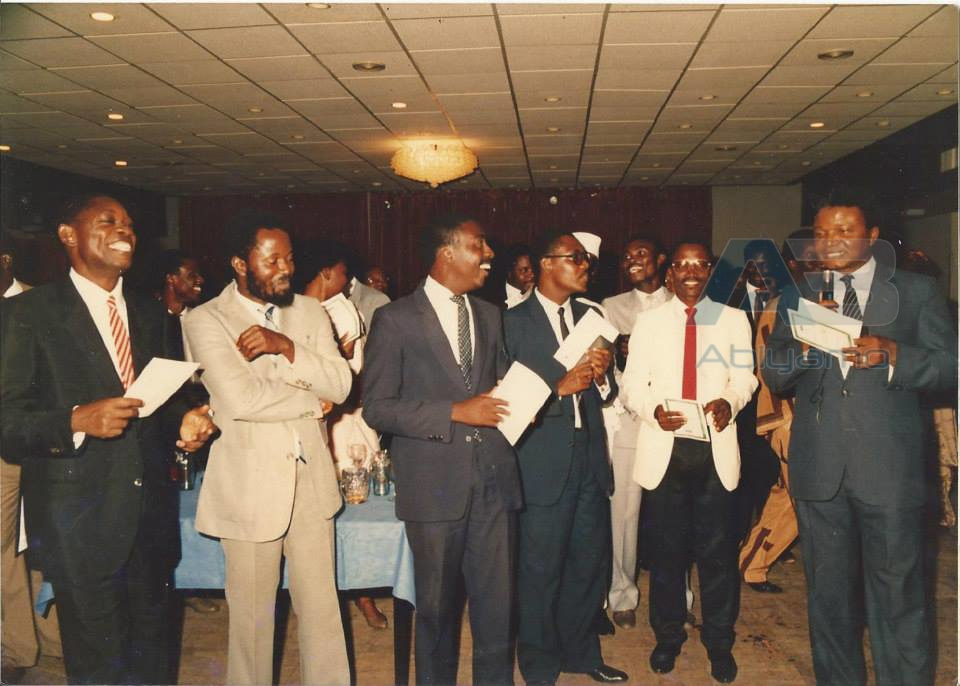
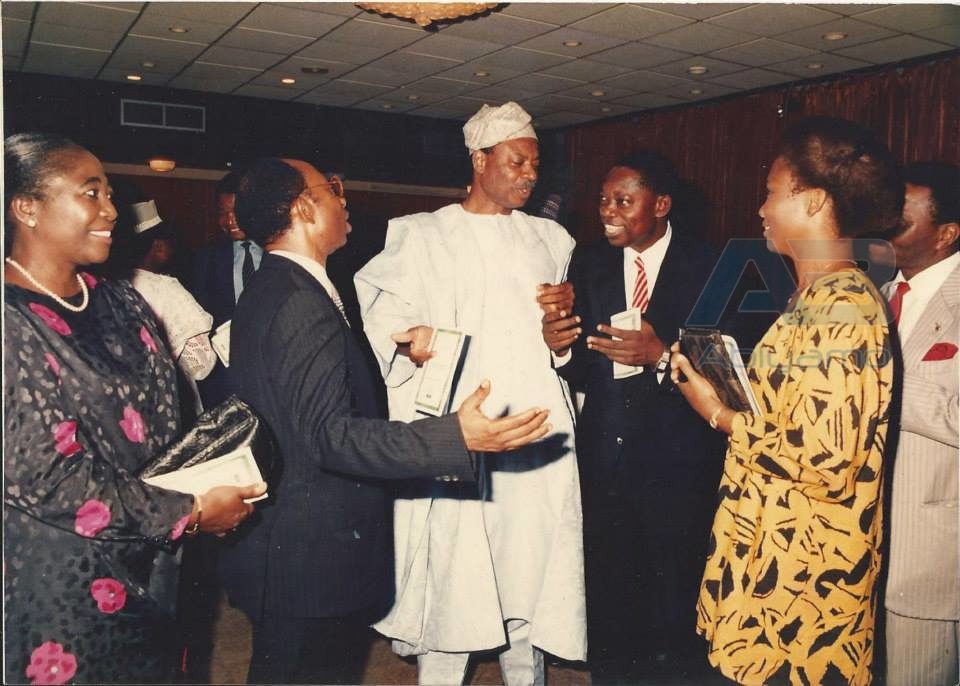
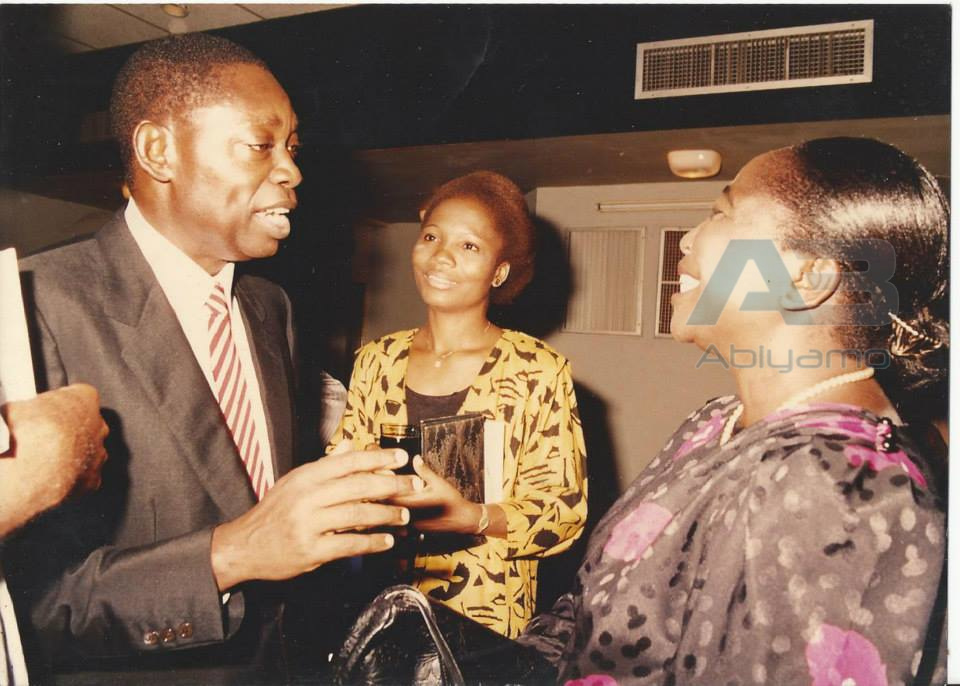
Below are more details on the photos above:
L-R: Mr. Ademola Somorin with late Chief MKO Abiola and past president of ICAN, late Chief E. Oke and an ICAN member.
Late Chief M.K.O. Abiola with some ICAN members.
Late Chief M.K.O. Abiola with past president Chief Omidiora.
Late Chief M.K.O. Abiola and some ICAN members.
With the special guest, late Chief M.K.O. Abiola, and Chief Hillary Onukogu.
The late Chief M.K.O. Abiola and late Prince Ashaye, past ICAN President.
MKO Abiola with guests at the conference.
THOSE SMILES AND HEARTY LAUGHTER SHA: MKO Abiola and some guests.
Late Chief M.K.O. Abiola and Chief Akintola Williams and a guest.
Late Chief E. Oke with Late Chief M.K.O. Abiola and Chief Arthur Mbanefo.
Late Chief M.K.O. Abiola and a past ICAN President.
THE GUY WITH THE CHARM: Late Chief M.K.O. Abiola and some guests.
HIGH SOCIETY: Late Chief M.K.O. Abiola with past president Arthur Mbanefo and Chief Nwokolo.
THE FOLLOWING WERE TAKEN AT DELE MOMODU’S WEDDING IN December 1992
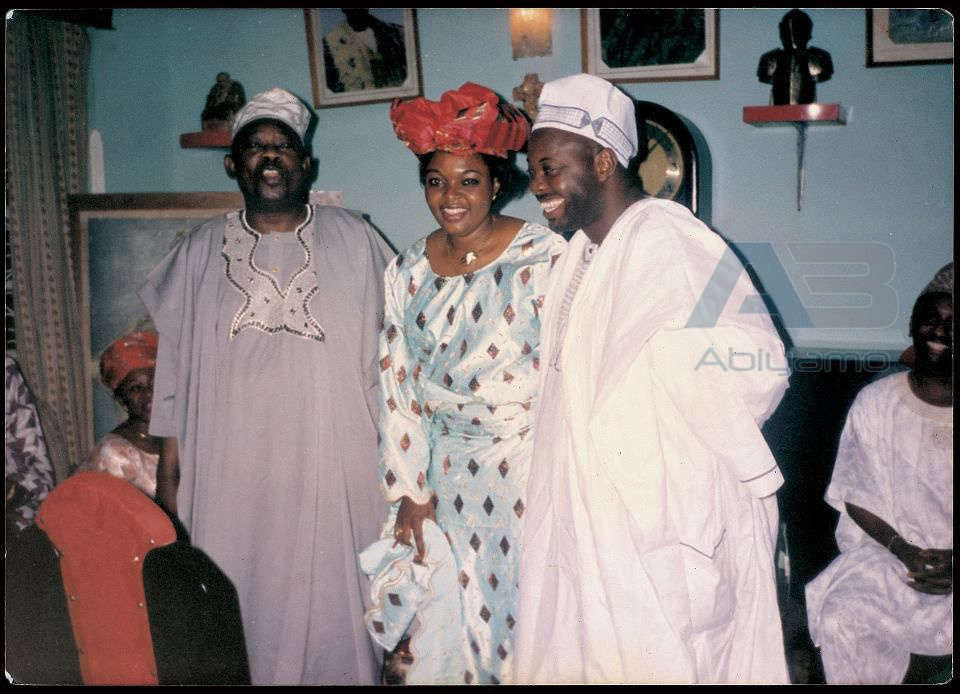
Here is the late Bashorun Moshood Olawale Kashimawo Abiola (MKO Abiola) at the wedding of the Ovation publisher and later presidential aspirant, Dele Momodu in 1993 at Ijebu-Igbo, Ogun State.

RUNNING FOR THE PRESIDENCY
–Following the cancellations of the presidential primaries of the National Republican Convention (NRC) and the Social Democratic Party (SDP was financed by the Federal Government and individuals like MKO Abiola, Francis Nzeribe and Major-General Shehu Musa Yar’adua), Abiola showed interest in running for the Presidency. NRC was also established by the government and was headed by Tom Ikimi (later Abacha’s foreign minister and now of the All Progressives Congress, APC).
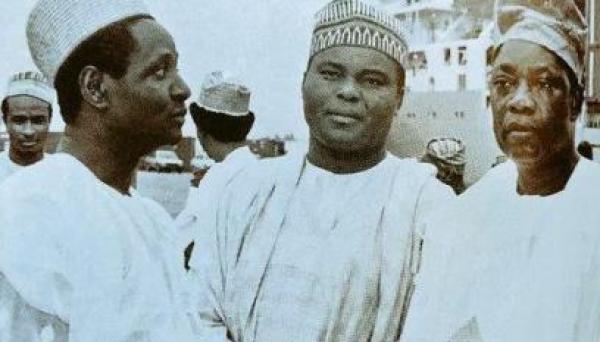
Throwback Photo Of Shehu Musa Yar’ Adua, MKO Abiola And Raymond Dokpesi
MKO Abiola had to slug it out with the party’s National Chairman, Baba Gana Kingibe and Shehu Musa Yar’adua. Yar’adua later did not contest but he placed his godson, Abubakar Atiku in his place (MKO Abiola was later fingered as being responsible for the military’s disqualification of the presidential candidates of the SDP and NRC).
The day came for the convention in SDP Convention in Jos, Plateau State but Kingibe lost in the first round as he could not muster enough votes to gain a majority. Thus, Kingibe, Abiola and Atiku Abubakar had to go for a second round, which Abiola won becoming the flagbearer of the SDP.
Then he started making a series of mistakes. One, MKO felt that getting the winning ticket was the main battle and he failed to consolidate his early victory. When it was time to conduct the election for the National Executive Council of the party, MKO Abiola exhibited immense political immaturity by not sponsoring even one candidate. Yar’adua did not even dull himself as he sponsored Tony Anenih (ehn, same Anenih) who later became the National Chairman of the SDP. Later on, MKO’s flaw would rear its ugly head when the same Anenih found no problems with accepting the annulment and Shonekan’s government.
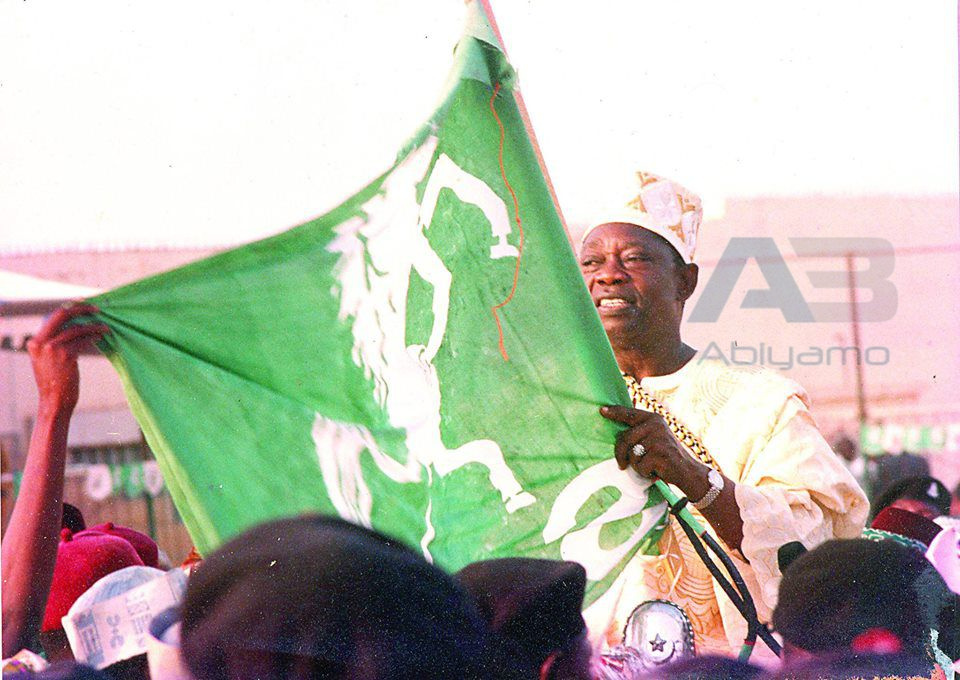
Bashorun MKO Abiola accepting the flag of SDP to be its presidential candidate in 1993.
Also, MKO’s choice to go for Kingibe as his running mate was also seen by some as a tactical error. That was because Yar’adua wanted that slot to go to Atiku so he could teach Kingibe a bitter political lesson. This makes more sense when you realize that virtually everyone in the party’s executive council were actually Yar’adua’s loyalists from the Peoples Democratic Movement, a creation of Yar’adua. Unfortunately, the same Kingibe would later serve in Abacha’s cabinet, eventually betraying MKO and leaving him in the cold.
-Less than two months after the death of MKO Abiola’s wife and lover of many years, Alhaja Simbiat Atinuke Abiola of cancer in London, IBB encouraged his friend MKO to run for the presidency. Instead of mourning his late soulmate, MKO Abiola was perhaps carried away by the false promises of his military friend called Babangida and the allure of power. IBB edged him on to spend billions of naira, but at the end of the day, he did the unthinkable by annulling the elections.
-On Saturday, 27th of March, 1993, MKO Abiola was elected by the Social Democratic Party, SDP, at the National Convention in Jos, Plateau State to become their presidential flagbearer following his return to partisan politics in 1992 and his subsequent victory at the presidential primaries of the SDP. One very interesting thing that must be pointed out here is that a man named Atiku Abubakar had to withdraw from the race to pave way for MKO who specially thanked him during his acceptance speech. Abubakar would later become Nigeria’s Vice President (1999-2007).
Sarah Jubril was also the only female contestant in the presidential race, so she has been on that stage long before now. As at the time MKO Abiola was made the presidential flagbearer of the SDP, he had already been conferred with over 257 chieftaincy titles from various parts of Nigeria in addition to being either the Patron or Grand Patron of more than 650 organizations that cut across various spheres of life, from economy to religion to sports and many more. Without a doubt, MKO Abiola was massively popular. His opponent was Alhaji Bashir Tofa, a wealthy oil-prospecting businessman from Kano. MKO soundly defeated Tofa even in his home base.
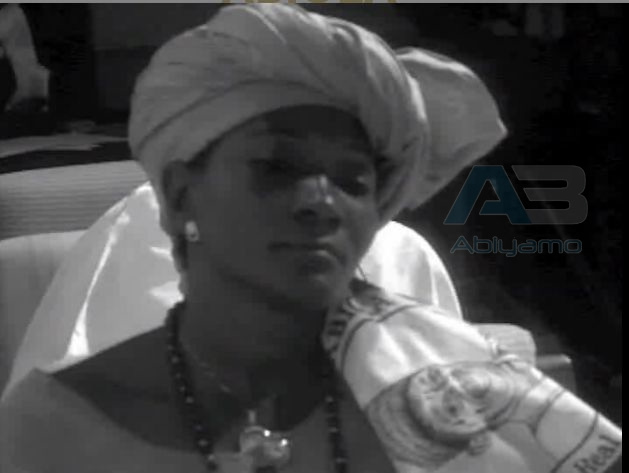
Sarah Jubril contested against MKO for the presidency of Nigeria in 1993.
When MKO and Tofa emerged as the presidential candidates of both parties, the TELL derided the outcome as a ‘a triumph of IBB’s men.’ In fact, Onome Osifo-Whiskey, who was the Managing Editor of TELL would slam it as ‘the triumph of money’. They went on to accuse the duo of being IBB’s henchmen who would later declare for IBB. Ebenezer Babatope, a politician and lawyer later made a transport minister, blasted MKO and Tofa as part of ‘IBB’s hidden agenda’ and that by June 1993, both of them would declare to all of Nigeria that IBB should be allowed to continue. Abiola did not find all these accusations funny at all. He fired a letter to the TELL editor in which he stated:
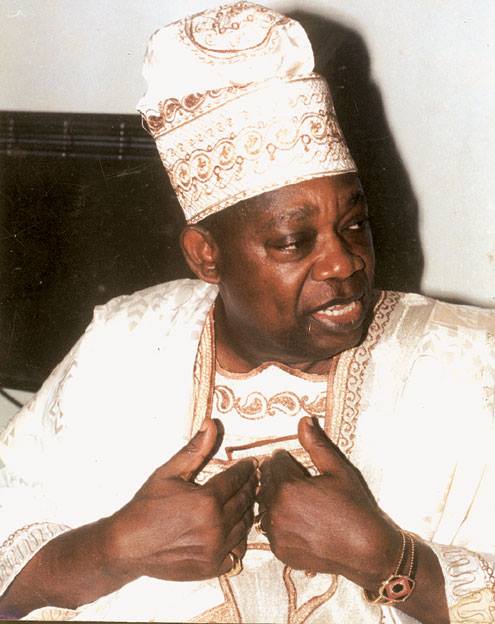
THE JUNE 12 ELECTIONS
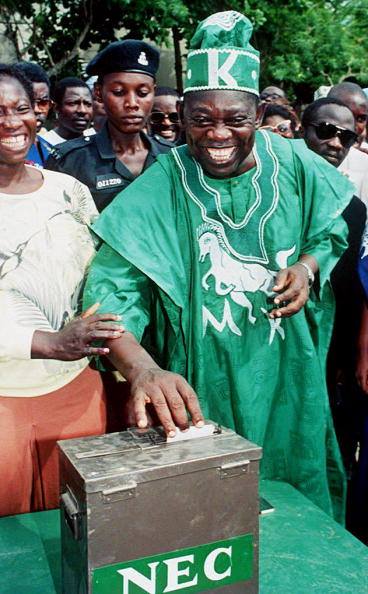
But MKO was wrong. Even though his presidential bid was real, he underestimated IBB’s capacity to destabilize things. IBB would do everything possible to throw spanner in the works and sustain himself in power for as long as possible. On the 10th of June, 1993, just 48 hours before the election, the Association for Better Nigeria, ABN, put in place by IBB’s man, Arthur Nzeribe, got an interlocutory injunction from Justice Bassey Ikpeme of the Abuja High Court that the election be stopped! The mischievous ruling was given in the middle of the night.
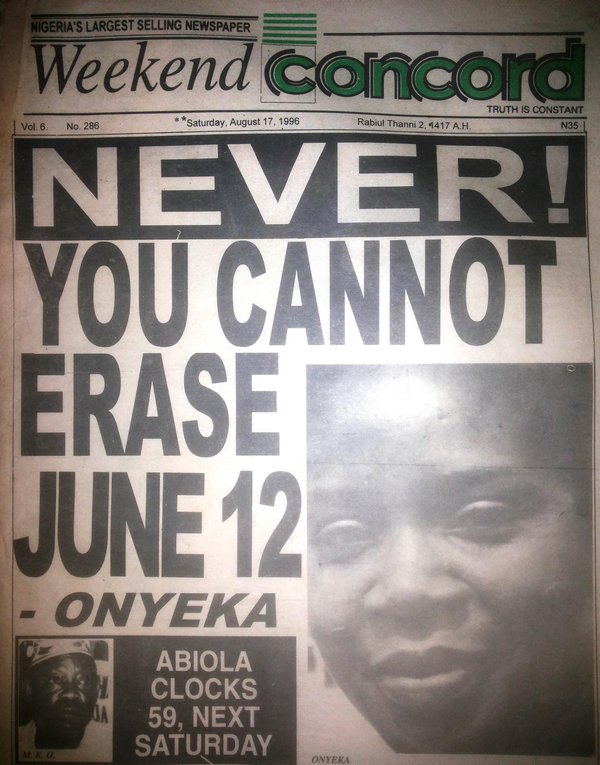
The struggle was so real.
The nation woke up to hear of the obnoxious ruling, no one was really shocked as they merely saw it another of IBB’s maradonic attempts to die in office. The Nigerian media criticized the ruling and the NEWS blared in its pages that the American spokesperson has made it very clear that the United States would not ‘tolerate further postponement in the presidential election. ’
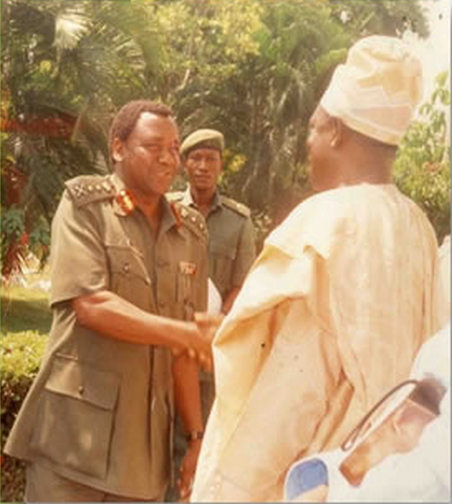
General Sani Abacha Welcoming Chief Moshood Kashimawo Olawale (MKO) Abiola To The Aso Rock Presidential Villa.
The National Electoral Commission (NEC) set the ruling aside and went ahead with the elections, following Decree 13 of 1993 which was guiding their decision. IBB’s attempt to derail the elections at this stage failed and it later became the freest and fairest elections in the history of Nigeria. In the video below, MKO Abiola Dares Nigerian Military Rulers Over June 12 Elections
MKO Abiola launched an unprecedented media campaign and popular broadcasts ensured that his message was heard in all the corners of homes across the nation. One of the popular campaigns then went thus:
Nigeria on the march again, on the march again,
Searching for Mr. President, on the march again.
(MKO speaking):
Nigerians have began to express doubts about the future of our dear country. We all know that. That is why I am stepping forward to renew hope. That is why I and all progressive people of Nigeria are determined to banish poverty and replace our hopelessness with prosperity. There shall be more food to eat, I shall provide houses for sale to heads of households in each local government. I shall make teaching attractive again, and education tuition-free and heavily-subsidized. I shall introduce National Health Insurance Scheme, modernize all hospitals and above all, improve service conditions of medical personnel. On June 12, all Nigerians should vote for me. We shall make our country great again.
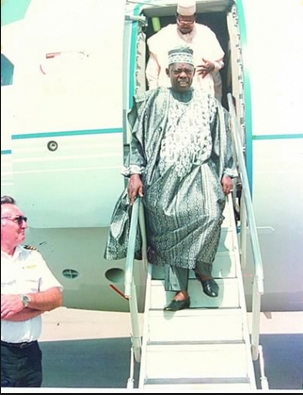
-In April 1993, he released his manifesto and hope was written all over it. See his manifesto below:
The optimism all over the nation was palpable. The late Chief Gani Fawehinmi stated:
June 12 is a rebirth of Nigeria. June 12 is more spiritual than physical, more providential than mundane. It is a judgment delivered by God based on activities in society since 1914 and 1960. God used it to unite Nigeria. –Tell, September, 13, 1993.
IBB on the elections:
It is true that the presidential election was generally seen to be free, fair and peaceful. However, there was in fact a huge array of election malpractices virtually in all the States of the Federation before the actual voting began even if the Commander-in-Chief was not ready or willing to relinquish power.
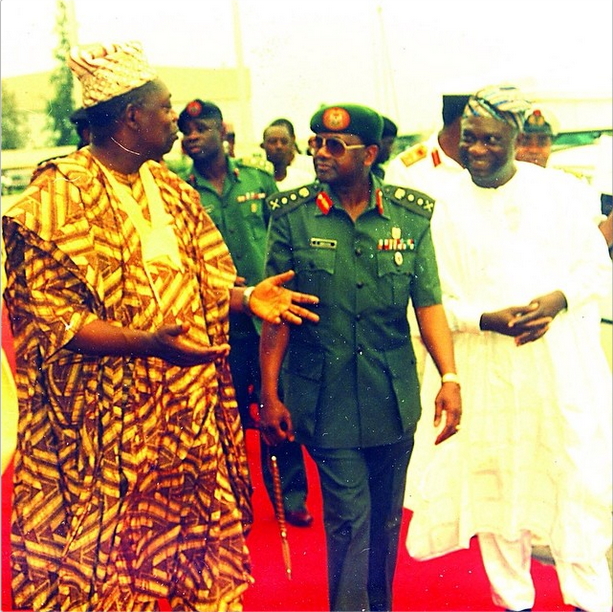
DANGEROUS GAME OF POWER: MKO Abiola, General Sani Abacha, Lagos State Governor Sir Michael Otedola (January 1992 – 18 November 1993), he is the father of billionaire Femi Otedola and Kwara-born late Major-General Abdulkareem Adisa is just behind them.
THE ANNULMENT
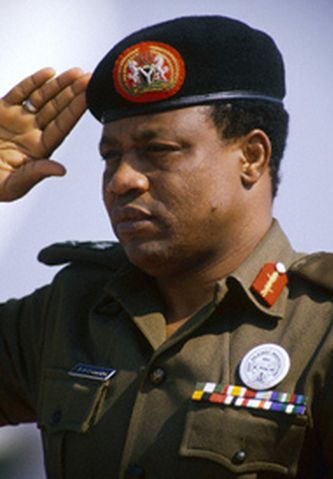
General Ibrahim Badamosi Babangida (aka IBB, Evil Genius and Gap-Toothed General Who Lives On A Hilltop Mansion) is Nigeria’s only military president but till tomorrow, he remains one of the most widely-despised figures for one singular act –the annulment of the elections that were adjudged to be freest and fairest in the history of Nigeria. Some analysts believe that IBB approved the annulment because he felt the government was too indebted to MKO Abiola to allow the Ogun State-born tycoon become the Nigerian President.
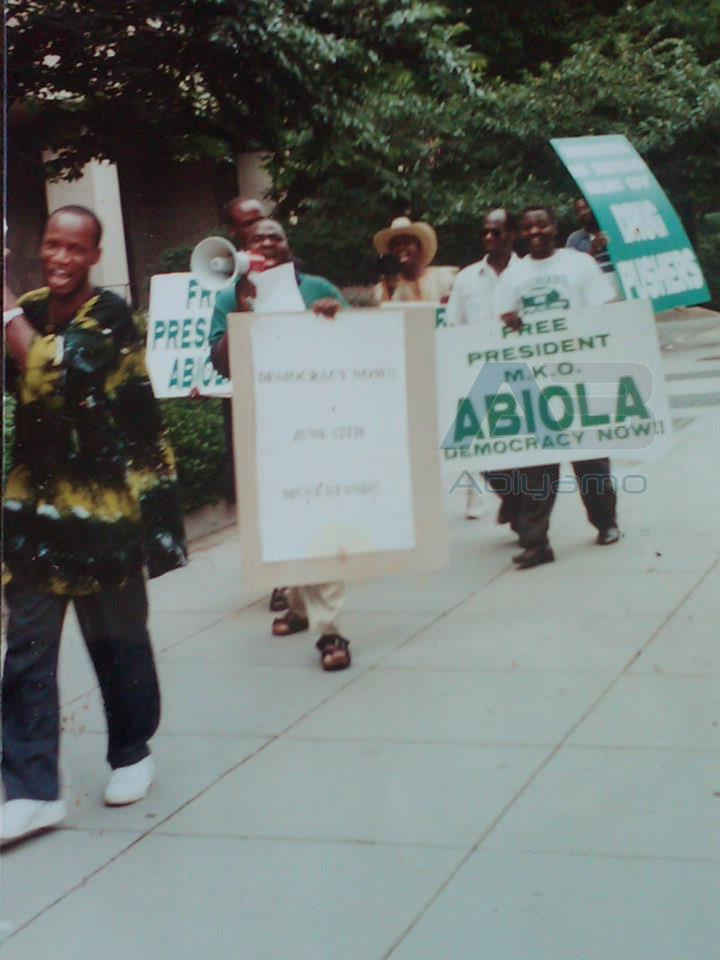
Nigerians in the United States of America protesting over the June 12 elections and Abiola’s imprisonment.
Following the annulment of the June 12 presidential elections, IBB handed over to an Interim National Government headed by Ernest Shonekan before fleeing with his family into the hands of then Egyptian strongman and dictator, Hosni Mubarak in Cairo. Like any other human being, MKO felt cheated and betrayed but it was during this period that he would make some disastrous political miscalculations. Fine, he consistently asked for the validation of his mandate, that was fine and the masses formed a solid bloc behind him. However, what would later bring about his own fall was the underground schemings and plot he got himself involved in.
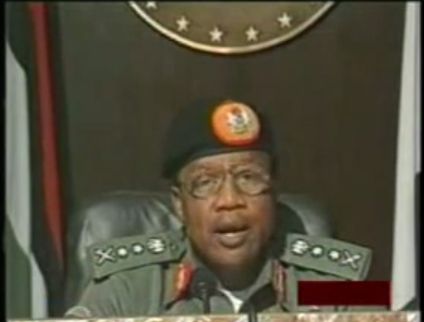
Babangida announcing the annulment of the elections.
At this stage, we will have to welcome a man named Sani Abacha aka Khalifa. The dark-goggled Kanuri General was known for his stealth and brutal efficiency. During the long eight years of the IBB horrendous regime, Abacha was the silent commando, always quiet and working in the shadows. When a terrified IBB was almost killed by coup plotters in 1990, it was Abacha who saved the life of the Commander-in-Chief and fought the coup plotters to the very end. That sealed the pact of friendship and IBB made him a full four-star General, something that had never happened before in the history of Nigeria, for someone else to be a full General with the Head of State.

SLY: Abacha welcoming the Sultan of Sokoto, the same man he would later ruthlessly deal with.
Although cunning, smart and evasive, Abacha did not hide his disdain for Abiola, someone with whom he maintained a somewhat aloof relationship with even while Abiola continued his warm friendship with IBB. Abacha had his own ambitious plans to rule Nigeria but because he was a man who played his cards very close to his chest, it was very difficult to decipher what was on Gumsu father’s mind. Many even underestimated his sagacity, and that included Abiola, who gave his support to the overthrow of Shonekan hoping that an military junta would not even last a year then he would reclaim his mandate. Unknown to MKO, Abacha himself was gunning for the top position in the land and would ultimately outsmart Abiola. But for the meantime, Abacha played the meek lamb and gentle dove until it was time to overthrow Shonekan even if he was blatantly disobedient to Shonekan on numerous occasions.
A grave mistake that MKO made but that later turned out to be a masterstroke for Abacha was that MKO nominated some of his cohorts to be in Abacha’s government not knowing that Abacha was merely using his gullibility to consolidate his own grip on power. In no time, Abacha began to show his real stuff and his body language announced boldly that he would not only stay in power for as long as possible but he would also not tolerate any dissent in any form. For a man that Abiola had underestimated, Abacha’s maiden speech to the nation was fiery and showed that he was in no mood for a Nite of a Thousand Laughs. Abacha came in with a plethora of ‘this has been banned, that has been proscribed or abrogated’ and that ‘offenders will be decisively dealt with’.
MKO Abiola knew there was fire on Mount Aconcagua when his own vice-presidential running mate, now a member of Abacha’s cabinet, Baba Gana Kingibe (a very ambitious guy, he likes calling himself ‘King I Be’) wrote an open letter to MKO Abiola that they forget about the June 12 elections and join hands with Abacha to move the nation ‘forward’. That is what I call ‘lobatan’ of the day. MKO’s troubles started to multiply as even his close aides began to decamp to the Abacha side of the grass which I guess was greener. But MKO Abiola was a fighter who believed in his right and till the very end, he fought for it. With his vivaciously beautiful and elegant wife, Alhaja Kudirat, MKO Abiola transverse the length and breadth of the country seeking assistance for his mandate to be restored.
At a point, MKO had to leave the country to seek the help of foreign governments and international organizations. Some of his supporters became really angry at this point querying why he would leave them during the heat of the struggle to junket all over the globe all in the name of ‘seeking foreign assistance’. A very well-connected man with diverse international contacts, Abiola got promises of support from the various places that he went to. MKO even took his appeal as far as to the doorsteps of President Bill Clinton in late March 1994. In the Capitol Hill’s Roll Call newspaper he sponsored an appeal to Clinton and the US Congress to help return him to office, he even lobbied a US Congressman, Republican Donald Payne of New Jersey to sponsor a bill that would return civilian rule to Nigeria and thanked the US lawmaker for introducing the legislation. By the time he would return to Nigeria, he was clearly more energized. But he would step on the tail of the scorpion in the process.
Abacha had become very aggressive at the point and he was indiscriminately clamping down on all pro-democracy groups, especially those who posed the greatest threat to his militocracy. But Nigerians too fought back and on October 25, 1993, a group of four men from the Movement for the Advancement of Democracy hijacked a Nigeria Airways plane and diverted it to Niger Republic. Restoration of Abiola’s mandate within 72 hours was one of their key demands. Abacha’s response to the hijack was not nice at all.
In Lagos, a spate of bombings ripped the state apart while many activists lost their lives in some really bizarre assassinations. Some lucky ones got long vacations in prison.
ABACHA SITS TIGHT
Before he came to the throne of Nigeria, the agreement between the duo of Abacha and MKO was that Abacha would come, stay briefly and organize Abiola’s path to the presidency. In fact, when the staff and management of his Concord Press paid him a solidarity visit on the 23rd of February, 1994, MKO Abiola was so full of optimism that he was thinking that by March 1994, Abacha would have handed over to him. Unknown to him, the Khalifa had some other sinister plans.
MKO DECLARES HIMSELF PRESIDENT AND COMMANDER-IN-CHIEF
Exactly one year ago, you turned out in your millions to vote for me, Chief MKO Abiola, as the President of the Federal Republic of Nigeria. But politicians in uniform, who call themselves soldiers, but are more devious than any civilian would want to be, deprived you of your God-given….
Edged on by supporters, sycophants and praisesingers, MKO Abiola decided to bite the bullet by declaring himself as the duly elected President of Nigeria. He said at the declaration:
We are sickened to see people who have shown little or no personal achievement, either in building up private businesses, or making success of any tangible thing, being placed in charge of the management of our nation’s economy; by rulers who are not accountable to anyone. Enough of square pegs in round holes.
We are tired of the military repetitive tendency to experiment with our economy: Today, they sayno controls. Tomorrow; they say full controls. The day after, they say fine tuning. The next day, they say devaluation. A few days later, they say revalue the same naira upwards again Abi? All we can see are the consequences of this permanent game of military about turns;high inflation, a huge budget deficit and an enormous foreign debt repayment burden, dying industries, high unemployment and a demoralised populace. Our youths, in particular, can see no hope on the horizon.
THE ARREST
Eleven days after MKO Abiola made the Epetedo Declaration, Sani Abacha’s goons went into an overdrive, following Abacha’s stern commands. Fully-armed mobile policemen in a convoy of 200 vehicles stormed Kashimawo’s Lagos residence to effect his arrest. Before Abiola was whisked away by the fierce-looking, no-nonsense armed government agents, he granted an interview to the BBC as he entered the car. The following was the conversation that ensued that day in June 1994:
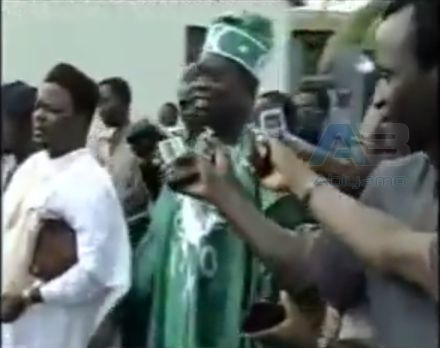
MKO Abiola speaking to reporters on the day of his arrest.

BBC correspondent: What is happening at your house? So are you being arrested?
MKO Abiola: I’m being arrested and I am just going out now with the police. There is a large crowd here. And I am being escorted out to the station by singing the National Anthem.
BBC correspondent: Why are they arresting you?
MKO Abiola: They are arresting me on an allegation of felony, namely treason or something like that. They are not doing anything, they are just taking me away. Please let me go. I am delaying them.
BBC Correspondent: And so where are you now? You in your car?
MKO Abiola: I am in my car now.
BBC Correspondent: Is it police who are with you in your car now or are they escorting the vehicle?
MKO: The Commissioner of Police is in the car with me, and my senior wife is in the car with me.
BBC Correspondent: Why are they letting you talk on the phone to the BBC while they are in the middle of arresting you?
MKO Abiola: (Laughs) They have come to arrest me, not to arrest my mouth.
BBC Correspondent: You sound very cheerful about it, Chief Abiola….
MKO Abiola: (chuckles) Of course. (Laughs heartily) It is (stammers) all part of democracy here.
BBC Correspondent: And you are happy to go to the police and await whatever charges they are going to file against you?
MKO Abiola: I am not in anyway disturbed by it. Any sacrifice is in order, if it would bring democracy, peace and prosperity to Nigeria.
BBC Correspondent: Is it possible to talk to the Commissioner of Police who is with you in the car?
MKO ABIOLA: I don’t know if the Commissioner of Police is authorized to talk. He cannot talk to the press.
BBC CORRESPONDENT: What is your advice now to your supporters many of whom we heard a moment ago?
MKO ABIOLA: Well (laughs), I told them before I left home to just stay calm. It is very very important that they stay calm.
BBC CORRESPONDENT: So you are appealing for calm, you don’t want them to take any direct action in your support?
MKO ABIOLA: No, no, no.
BBC CORRESPONDENT: You still say you are the President of Nigeria but it is not much good if you are going to be in jail.
MKO ABIOLA: Well, Mandela was in jail for 27 years, Kenyatta was in jail, I suppose that is one of the qualifications you need in this part of the world. Don’t worry yourself my friend.
Abiola told the BBC correspondent that he would not be intimidated by Abacha’s use of brute force and that he would be coming back in no time, to the same house, hale and hearty. Truly, MKO Abiola would return to the same residence, but as a corpse in an expensive, glistening, white casket.
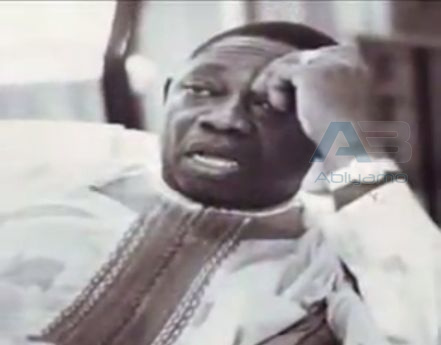
THE IMPRISONMENT
Following the arrest of MKO Abiola, Abacha clamped him into jail in solitary confinement for almost four years for having the temerity and audacity to declare himself President of Nigeria and undermine Abacha’s grip on power.

Moshood Abiola leaving a Black Maria van under heavy armed guard.
According to Kofi Annan’s accounts, MKO Abiola’s days in Abacha’s gulag was terrible. For four horrible years, he was held in solitary confinement and he had no access to radio or newspapers. His guards were on standing orders not to even say peem to the Bashorun of Ibadan. All that he was given was what he requested for: the Holy Quran, the Holy Bible and some sheets of paper to write on. Often times, Abiola would sing religious songs all to himself in his dingy cell.
THE KOFI ANNAN CONNECTION
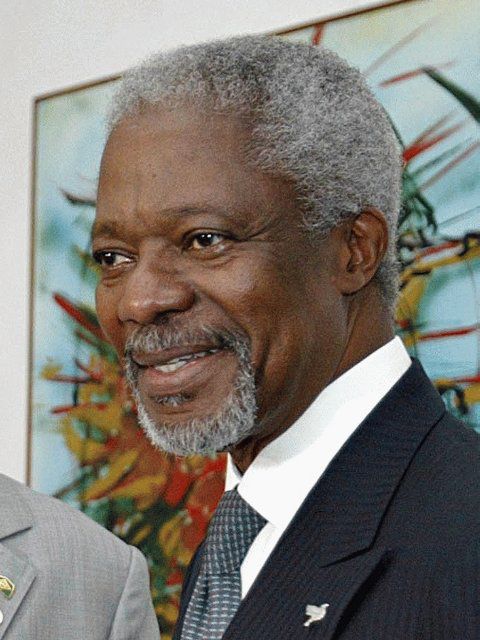
And Abacha was dead. In fact, he had been quickly buried in the tropical soil of Kano. A Gwari general in the Nigerian Army, Abubakar Abdulsalami was hastily sworn in as the new Commander-in-Chief. Abdulsalami was now in a dilemma. He knew military rule all over the globe was fast going out of fashion and it would make no sense for him to even try to entrench himself. His wife, Fati, a high court judge, had to step down in the face of the obvious clash of interests. Abubakar wanted to clean up the mess quickly and leave the bloodied scene of Nigeria’s most powerful office. Abubakar started mopping the scene with an immediate release of 26 political prisoners, one of whom was General Olusegun Obasanjo whom Abacha had flung into prison for getting on his Kanuri nerves.

Abacha’s dictatorial power was absolute.
But then, there were uneasy questions on the wagging tongues of millions of Nigerians: what of Bashorun MKO Abiola? Is he not going to be freed? Are they not going to release him ni? In addition to MKO, there were about 250 other political prisoners still left in jail but obviously, the most prominent of them all was Abiola and millions of his kinsmen in Nigeria’s southwestern region of Yorubaland were insisting that he must take over as President or at least head a government of national unity (Annan voiced this idea to Ikimi but he said it was not a feasible one). The army generals argued back that it was not feasible that even if MKO was initially given his mandate, his term would have ended in 1997. Another argument was that there was just no legal or constitutional basis to return MKO to power.
However, a tested general that he was, Abubakar knew how fluid things were at the apex of power and how quickly things could degenerate if care was not taken. He also knew that whatever that was to be done had to be done with immediate alacrity as unwarranted peregrinations would only worsen the matter. Then he hatched a plan, all in secret. Using his foreign minister, Abubakar called on the Ghanaian-born diplomat, the eternally-handsome Kofi Annan to come and mediate in the process.
Annan, a first-class envoy and gentleman, was still receiving accolades from his spectacular efforts in Iraq and Abubakar had hoped that the man once married to a Nigerian woman (Kofi Annan was once married to Titi Alakija before they divorced) would perform the same magic in the Abiola case. Annan’s visit was negotiated on phone and was kept away from the public. A presidential jet was dispatched and after six hours on the return flight from Europe, Annan was in Nigeria. According to William Shawcross, a British journalist and writer who covered all of Annan’s visit to the country, Abubakar had told Annan he was willing and ready to handover to a democratically-elected president but some of the other army generals were not too sure.

On the fateful day of the meeting, smartly-dressed Nigerian military officers ferried Annan from the Nnamdi Azikiwe International Airport to the Villa. To Annan’s consternation, the reception was low-key. Even the statement he had prepared to read had to be ditched. Annan knew that Abiola was crucial to the nation’s future and whatever had to be done, had to be with caution. Another thing was that the army generals needed some degree of assurance that they will not be witch-hunted after they willingly leave power. Annan was driven straight to the militarized fortress of power called Aso Rock.
As he entered, he saw Abiola watching the England-Argentina match but the sound of the television was turned off. Annan shook hands with him and flashed his trademark seductive smile. He asked MKO Abiola how he was doing and MKO stated that he was fine, despite his long years in prison. Then a puzzled MKO asked Annan:
‘Who are you?’
‘I am Kofi Annan, the Secretary-General of the United Nations’. Annan replied.
MKO Abiola was overwhelmed, he rushed towards Annan and kissed his hands. Then he asked:
What of the Egyptian (in apparent reference to Boutros Boutros-Ghali, Annan’s predecessor)? What happened to him?
A bewildered Annan told MKO that he took over as the UN scribe since 1997 and he also noted that MKO Abiola was almost totally cut off from the entire world and was not even in tune with the latest affairs (that was against some officials statements that Abiola had newspapers in prison). In fact, MKO Abiola did not even know that Pope John Paul II was in Nigeria to plead for his release.
Annan had met with Abubakar in Aso Rock and the general told him that he was not interested in holding on to power. Annan congratulated him on the reforms already made and advised him to speed up the transition and also called for the release of the political prisoners, especially MKO Abiola whose supporters wanted him to become the president immediately he was released. Abubakar told Annan that idea did not go down well with the military but everyone (including those in the opposition) was hopeful that Annan’s visit would produce tangible results.
After Annan met with Abiola, he held a press conference and had some really heartwarming news. He said Abiola was realistic with the issue on ground and that all MKO wanted was to go home and travel to Mecca to thank his God. He also stated that MKO Abiola told him that one does not have to be a president to live one’s life. Annan said MKO gave him a verbal assurance that he would not claim his mandate. He MKO Abiola later denied that he told Annan he would give up on his mandate.
Following Annan’s conference, an elated Abubakar told Abiola that the deal still stands and that if MKO Abiola would agree in writing and append his signature that he would not claim his mandate that he would go home the next day. That was where the problem arose. Abiola said all he could give was a verbal assurance that there was nothing to place in writing. Some reports state that MKO Abiola also stated that the mandate was no longer his own cross alone, but that of millions of Nigerians. At any rate, Annan left Nigeria with the hope that Abubakar would release all the political prisoners very soon as he had promised.
INTERESTING THINGS ABOUT THE LATE MKO ABIOLA
-Unlike many of the politicians we have in Nigeria today who have absolutely nothing to offer the people but prop up their base using divisive religious tactics or shamelessly brandishing a regional or ethnocentric ideologies, MKO Abiola was a man who loved Nigeria and was what can be described as a typical Nigerian. Although a devout Muslim, MKO Abiola was very familiar with the Holy Bible, quoting from the various Holy Books in his speeches and conversations. Still on MKO Abiola and his philosophy of religious tolerance, he was always proud of the fact that he was trained at a Christian missionary school (Baptist Boys’ High School, Abeokuta). When he was jailed by Abacha, MKO requested for the following items: a copy of the Holy Qu’ran, a copy of the Holy Bible and some sheets of paper on which to write on. He was prepared for the journey ahead. He paid the ultimate sacrifice in his struggle for what he believed was rightly his.
-MKO Abiola worked for and promoted religious tolerance all over the nation. He freely and gladly doled out millions to churches, mosques and various organizations. Not at a time was MKO Abiola accused of being a religious bigot and a vast majority of Nigerians were so comfortable with him that they massively voted for him even if his running mate, Ambassador Baba Gana Kingibe (he calls himself King-I-Be) is a Kanuri Muslim from Borno State. Today, many Nigerians cannot even think or look at any issue without the prism of religion, and that, is very sad indeed.
-Abiola died wearing a white lace, his favourite dress. And like Abacha, he was also foaming at the point of death. There are many causes as to why people foam or froth at the mouth before they die. One is poisoning, and a specific agent, called strychnine, causes this symptom. Strychnine is a highly-toxic alkaloid compound normally used as a pesticide to kill birds and rodents. It is colourless, bitter in taste and crystalline in appearance. It can be swallowed, inhaled, injected or even absorbed through the eyes or mouth and leads to spasms of facial muscles, loss of consciousness, generalized muscular contractions, foaming at the mouth and finally, death through asphyxiation. One interesting thing is also that strychnine poisoning causes the body to arch in three different ways: resting on the heels or occiput, with the body flexed to one side or bending of the body forward due to spasm of abdominal muscles. Minutes before MKO Abiola was pronounced dead, he was lying on the floor, face down.
While this is not conclusive and does not really prove anything, it is important to note that strychnine is rapidly absorbed from the gastrointestinal tract, transported by plasma and the blood cells, leaves the bloodstream quickly and is distributed to the tissues. About 50% of the injected dose enters the tissue in 5 minutes. It becomes detectable in the urine in few minutes and in someone killed by strychnine poisoning, the highest concentrations are found in the blood, kidneys, liver and the wall of the stomach. In very serious cases, the patient dies even before reaching the hospital. Almost 90% of the drug is cleared from the body within 24 hours by the kidneys and within 48-72 hours, excretion is almost 100%. It has no specific antidote but early response can save the patient. Turgut Ozal, a former President of Turkey and Alexander the Great were believed to have been killed by strychnine poisoning. Note also that coughing up and production of a pinkish, mucous foam can actually be caused by a heart failure.
-Abiola was also active with his networking outside Nigeria. He supported rebellions and coups all over the continent, especially in the Eastern, Southern and Central parts of Africa. The current President of Uganda, Yoweri Museveni Kaguta, who came to power in January 1986 via the overthrow of General Tito Lutwa Okello is one those who benefitted from Abiola’s largesse.
-Ore Falomo, Abiola’s personal physician but also a close confidant of Abacha said that if Abacha was alive, he would not have killed MKO. He stated that in fact, Abacha did not want him dead and that he was not even the one who killed Major-General Umaru Musa Yar’adua but his closest allies who also plotted to inject General Obasanjo.
-In his own words, the first place where MKO Abiola ate fried eggs in his life was at the residence of his girlfriend, Simbiat Soaga, later to become his wife.
-Abiola was very good friends with the late President Gnassingbe Eyadema of Togo who ruled the tiny nation for 38 years before his death in 2003. In fact, they were so close that Eyadema sent an official Togolese delegation to represent him when one of Abiola’s sons was conducting his wedding ceremony. See their photo below:
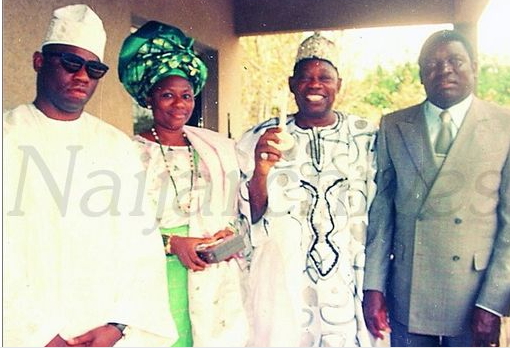
-Abiola was also a huge crusader for reparations back to Africa. He was an unrepentant Pan-Africanist. In fact, in June 1992, he was elected the chairman of the committee in the Group of Eminent Persons (GEP), a body whose aim was to achieve the goals of African reparation.
-The Federal Government owed MKO Abiola money and it is not sure if all has been repaid to his family. The debt to Abiola started piling up under the IBB regime when Babangida would approach his good multimillionaire friend MKO to give them money to buy the uniform materials, supplies and other commodities for Nigerian soldiers going to Liberia as part of the ECOWAS Monitoring Group.
IBB made repeated demands and promised that they would pay Abiola back. Abiola was not worried as he felt he was doing it for a friend and that if the effort in Liberia became successful, it would be a nice thing if his friend claimed the glory. Well, things later turned out another way. But as incredible as it may sound, it was Sani Abacha that started repaying back some of the debt to Abiola but he stopped immediately Abiola declared himself President. When Abubakar came to power, he visited Abiola’s house and told the family that he would see to it that all of MKO’s money was paid. It all becomes hazy after that.
-At a point, Abiola was running with the hare and hunting with the hound. How? When it became clear that Abacha was not going to give up power, Abiola was still holding backdoor meetings with the enemy. He even nominated members for Abacha’s cabinet and met with Arthur Nzeribe, one of the architects of the entire annulments. That was when people like the late Chief Gani Fawehinmi, Bamidele Aturu, Olisa Agbakoba and Femi Falana were risking their lives fighting for Abiola’s mandate.
-At a point, MKO Abiola had received chieftaincy titles from 260 traditional rulers from almost every single state in the country, from various ethnic groups. No Nigerian has been able to replicate that feat.
-A very patriotic man, MKO Abiola set up newspapers in Nigeria’s three major languages and distributed all over the country. No one had ever done that before him and no one has done that after him.
-An incident happened at the Commissioner of Police’s office in Abuja during Shonekan’s time. As narrated by Ore Falomo, Abiola’s physician, they had given Abiola a newspaper to read and one police officer wanted to snatch it from him. Abiola refused and a scuffle ensued. Abiola was pushed to the pillar and there were fears that his spinal cord might have been damaged. There were no CT scan available for imaging and he wanted to fly out. But because he once travelled out and Shonekan refused him entry, they thought he would be barred from entering again.
But interestingly, Abacha intervened and allow him fly out for the necessary treatment. When he was returning, it was the same Abacha that arranged it. Sani Abacha changed the presidential guard at the airport, replaced them with his own cronies and ordered them to fly to Cotonou, Benin Republic to bring Abiola in after his treatment. But once Abiola entered the nation, things fell apart o. Abacha kicked out Shonekan at gunpoint and he tricked everyone that he had to remove Shonekan to prevent a return of Ibrahim Badamasi Babangida.
A deal was struck and it was believed (even by Abiola) that Abacha would restore MKO’s mandate by March 1994. It was a total disaster. Because Abacha operated with so much stealth, he was underestimated by many. Even Abiola underestimated Abacha’s powers of strategic planning with devastating consequences.
HIS PHILANTHROPY
One thing that Nigerians fondly remember MKO Abiola for is his philanthropy. He gave and gave until he even gave his life. He was a relentless giver. The following are some of his best-known philanthropic gestures:
1990: He gave the sum of N1 million each to state university in the country, N500,000 to every federal university and N25o,000 to every polytechnic. I think that feat remains unbeaten.
LOVE AND ROMANCE: HIS LOVE CHILD, MARRIAGES AND MANY WIVES
MKO Abiola’s unbelievable appetite for women remains a very interesting aspect of his colourful life. Although his first love was Alhaja Simbiat Atinuke, he had already impregnated another lady while he was still dating Simbiat. The other lady, whom Abiola did not marry, later gave birth to his first child, the well-known politician, Lola Abiola-Edewor. The following are some of the most prominent of Abiola’s wives, said to number between 25-40.
- SIMBIAT ABIOLA.
- KUDIRAT ABIOLA:

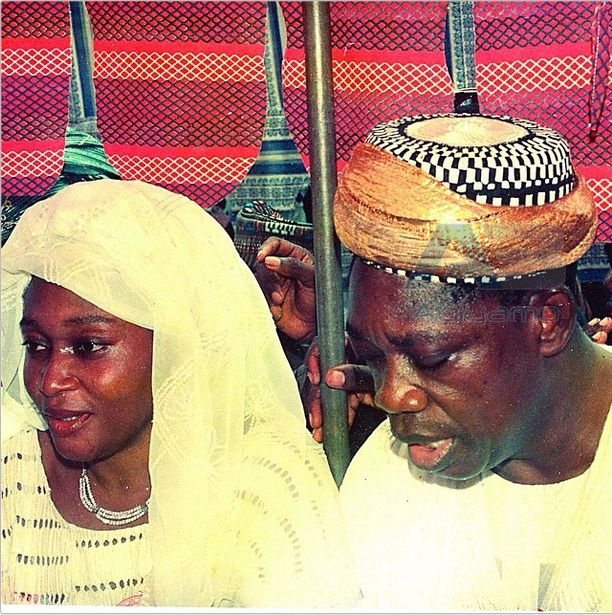
MKO Abiola & wife, Kudirat Abiola.
- DOYIN ABIOLA:
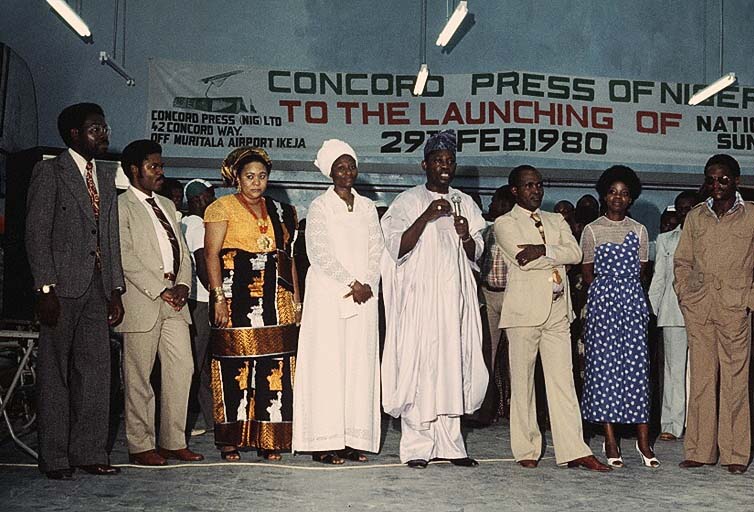
THE SUPPORTIVE WIVES: At the launching of Concord Press in 1980, Simbiat (in white) flanks her husband, other people in the photo are the late Dele Giwa, Laila Dogonyaro and Dr. Mrs. Doyin Abiola, one of the most respected wives of MKO.
- ADEBISI ABIOLA
- DUPE ONITIRI ABIOLA
In an interview with Tribune in 2013, she said that she constantly warned her husband of the sly tactics of IBB but MKO told her that Babangida had already promised him and swore to an oath that he would leave power and hand over to him. Onitiri said she knew that all IBB wanted was to be a life president like the late Gnassingbe Eyadema who ruled Togo for 38 years and that when the results were annulled, MKO was shocked and he could not believe it. She said he told him: But I told you.

MKO with wife, Dupe Onitiri.

With Dupe Onitiri Abiola.
6- SITI-BIOBAKU ABIOLA, she was his cousin’s daughter and youngest wife of Abiola, see their photos below: 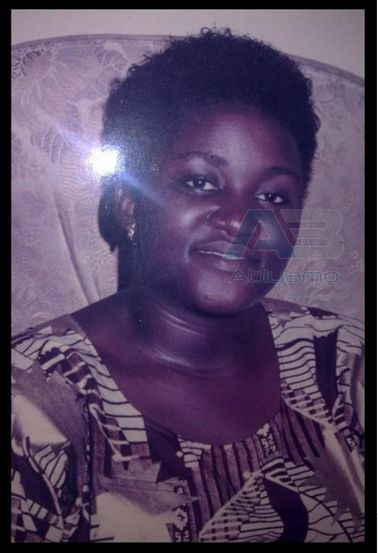

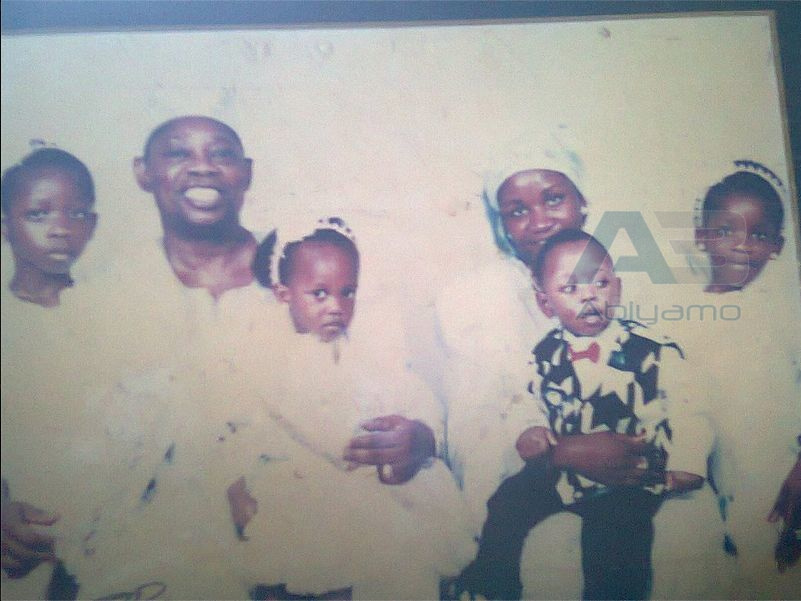



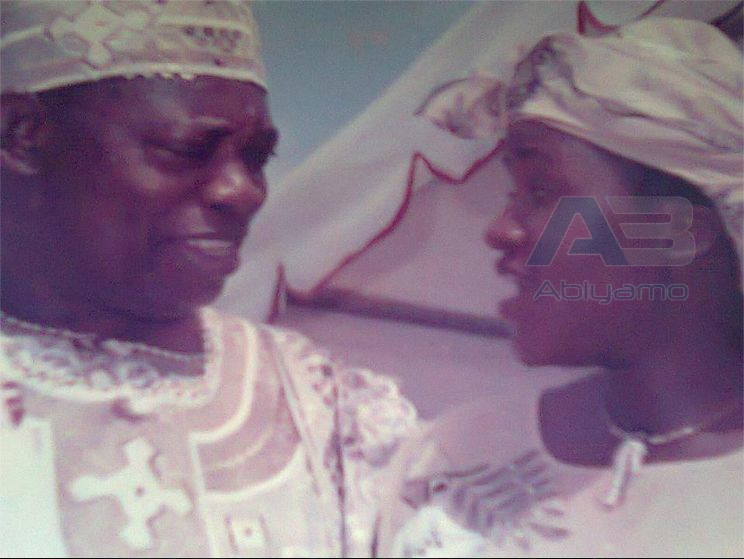
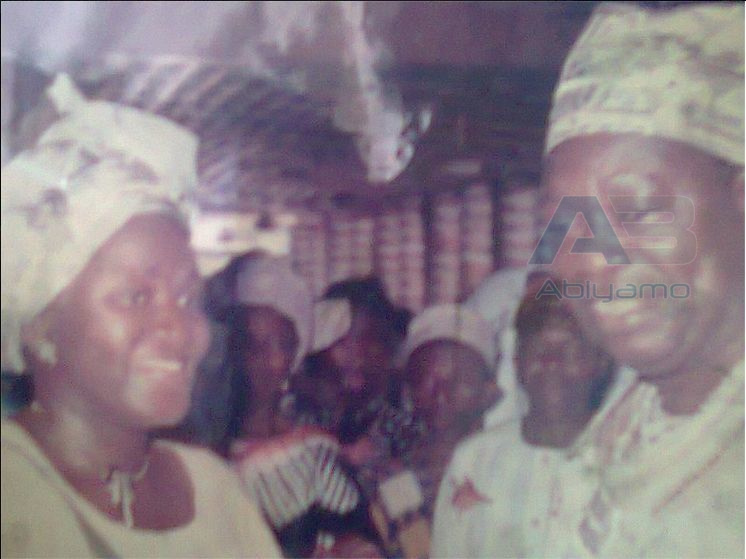
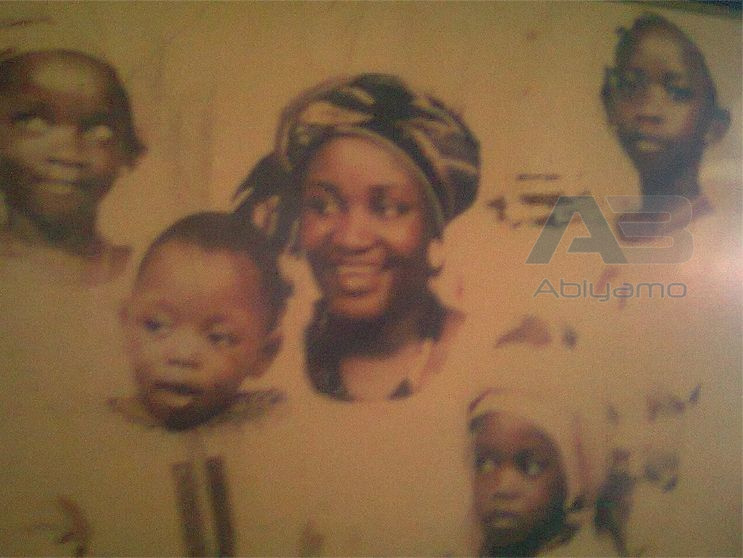
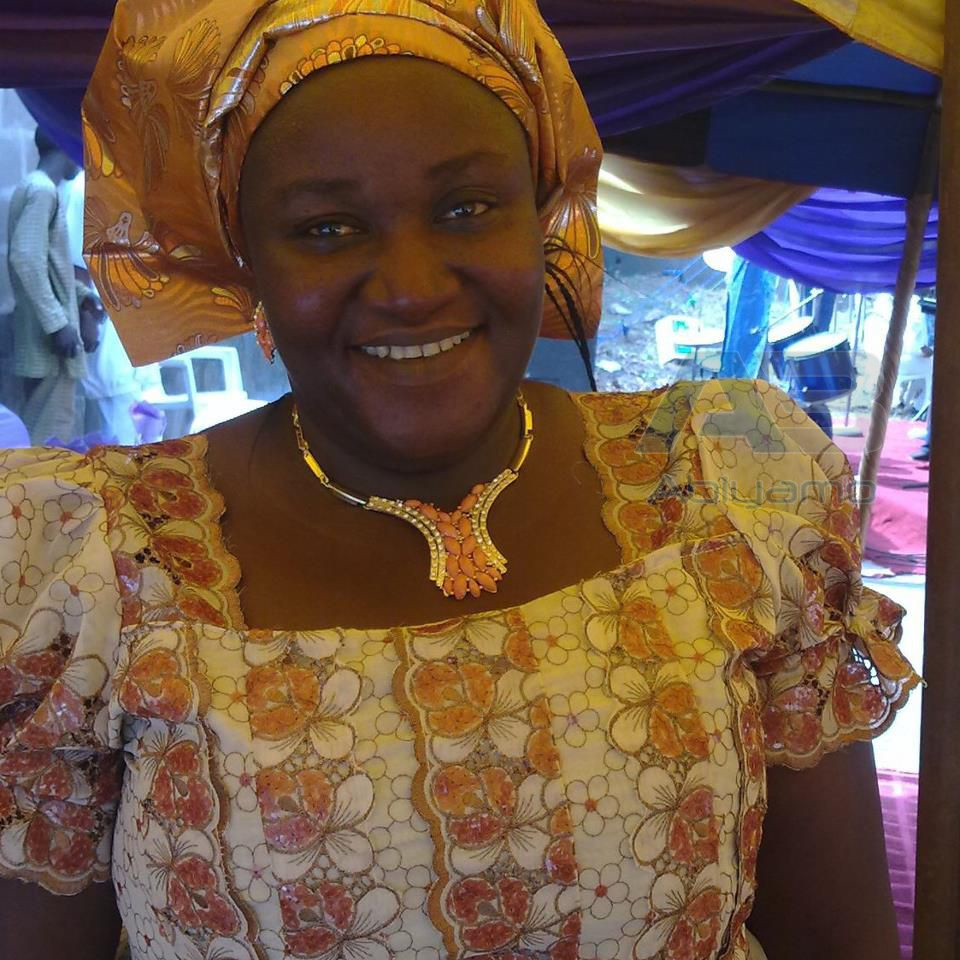
HIS WORDS
These assurances were given, in some cases from the highest level of government, I consulted the President himself. And he gave the assurance himself. That this time around he was serious. I was therefore convinced that the commitment to civilian rule come August 27, 1993 was firm, settled and irrevocable. –MKO Abiola on the assurance he received from Babangida concerning the elections.
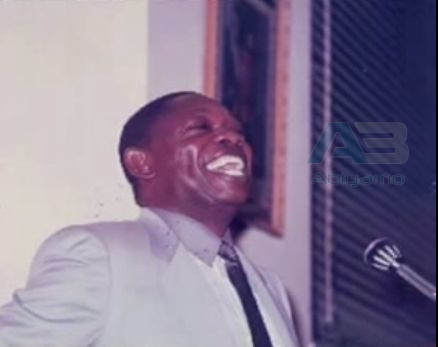
Both of us (Babangida and Abiola) are over 50 years old. We should not be afraid to die, why are you afraid? –MKO Abiola to IBB as quoted in the Tempo magazine in June 1993. It was on negotiations over the June 12 elections and the formation of an interim government.
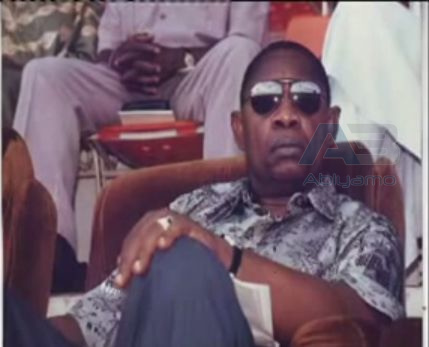
HIS LAST WORDS TO HIS FAMILY:
‘Shame on ye that can kill the body and not the soul.’
ON WOMEN: ‘We have all been guilty of the ill-treatment of the womenfolk, and as I said yesterday, that there are times, I sat throughout that session yesterday glued to my seat with all the speeches, one after the other. I felt sorry for some of the things I’ve done and I live the rest of my life in making amends for them. Every man in our environment has got a lot to apologize for, to our women, and if you have a conscience, if you are an African man, probably one of the enlightened ones, there are some things that were said, particularly when Museveni (Ugandan President) was speaking. But thank God I have given my daughters equal opportunities with my sons.’

MKO Abiola with wife, Kudirat.
ON FELA’S ALLEGATION THAT HE WAS AN INTERNATIONAL THIEF THIEF (ITT):
Fela had nothing against me per se except the business problems we had, with Decca. I am Chairman of Decca, I was Chairman of Decca, he felt that Decca should have paid him some money, and we felt Decca was not liable. I was expecting to take the matter to court where issues of business and contracts are resolved. Instead, he assembled all his queens together and invaded the premises of Decca, you remember that time? All of them were there for 77 days, destroyed everything we had in there. People said I should take him to court, I laughed, I did. Then he made this record again out of vengeance, fine. You see, if there are no Felas, I would have had to buy someone to play that role. Things are so good for me that there has to be some elements like that. No, it is not a stormy time, it is just a storm in a teapot. There is no problem. You see, people said I should sue him, BBC asked whether I should sue him for damages, I said damages? It is like you are having your bath in the river, then a mad man came and took your clothes and ran away with it. If you follow the mad man, nobody will know, who of you is mad. So just let him go.
24th August, 1992
-ON CORRUPTION ALLEGATION LEVELLED AGAINST HIM IN THE PUBLICATION ON SUNDAY, AUGUST 17TH, 1980 OF THE LOS ANGELES TIMES:
In this publication, MKO Abiola was accused of his involvement in questionable business deals and financial impropriety. He was accused of being central to the receipt and payment of kickbacks to Nigerian officials through ITT Standard SA of Switzerland in order for ITT to gain huge telecommunications contracts in Nigeria for which he was paid ‘lavishly’. In a presidential candidate debate/interview, a female member of the audience raised this issue with Abiola who then responded:
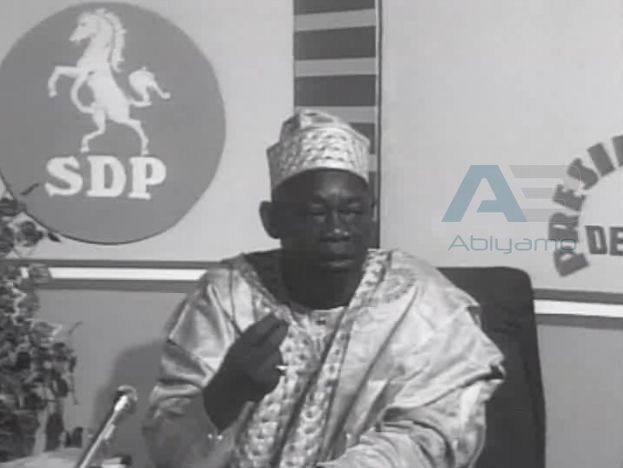
MKO Abiola during the televised presidential debate speaking as the SDP candidate.
Well, I haven’t seen that article. I don’t know where it came from, this is the first time I am hearing about it. I have never taken part in questionable kickback in 1980 or at any time at all. Ehmmm, the last contract we got, the one I was talking about earlier on very recently, was in 1976. There was never any kickback involved, it was by competitive tender, it must have been the product of a jaundiced mind, I didn’t read the Los Angeles magazine or whatever it is but definitely if I get more facts about it, I will go into it because there is no statute of limitation on that type of nonsense.
WHAT OTHERS SAY ABOUT HIM
-Prince Bola Ajibola, former Minister of Justice and Attorney-General of the Federation described MKO as the true father of our democracy.
–Abiola lived a life that was ‘paradox of pain and pleasure, a parable of poverty and plenty.’-Newswatch
I was deeply saddened to learn of the sudden and untimely death of MKO Abiola, a distinguished citizen and patriot of Nigeria. –Bill Clinton, US President.
CRITICISM
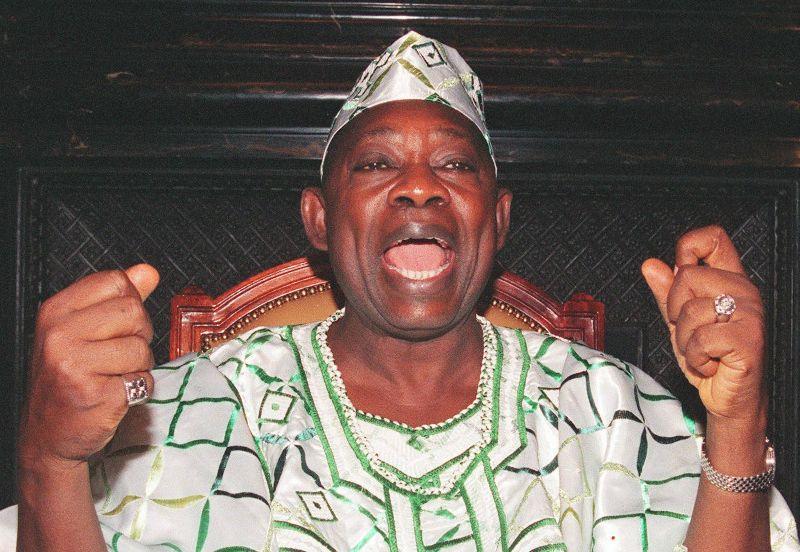
-Abiola was one of the wealthiest men in Africa when he was alive. By the late 1980s, he was recognized as the richest man in Nigeria (but he constantly denied that he was a billionaire even if he was already flying all over the world in his own private jet). And like every other moneybag, he was assailed on various sides by attacks from critics who loudly denounced him as a corrupt capitalist who manipulated an entire populace via a sophisticated network of bribery and sleaze, especially when it was time to run for the Presidency.
-Some people also nurse a grudge with MKO Abiola for eternity because they believe that as a contractor working closely with brutal military dictators, he remains one of the architects of the problems we are facing in Nigeria.
-Also, the fact that he also sponsored various military coups (reportedly gave IBB a sum of $10million to overthrow Buhari, gave tacit support to Shonekan’s overthrow) and rebellions (financed the rise of Yoweri Museveni of Uganda in 1986) has drawn the ire of many who see him as nothing but a conniving and sly business magnate concerned with only protecting his own interests.
-MKO Abiola has also come under fire for his unbelievably vast of harem of wives, mistresses and women. Some joked that Aso Rock would not contain MKO and his family should he have become the President of Nigeria.
-When the sly Babangida cancelled the presidential primaries of the National Republican Convention (NRC) and the Social Democratic Party (SDP), Abiola was one of those fingered as being responsible for the plot, which was said to have been aimed at neutralizing the powerful Major General Shehu Musa Yar’adua, a mutual friend.
-MKO Abiola was also accused of launching his vast media empire and utilizing it to stage massive propaganda against political opponents like Awolowo (who also fired back with his Nigerian Tribune). The media war between the two was not funny. MKO Abiola’s Concord newspapers were launched less than a year after the 1979 general elections. His papers published the damaging story on the Dideolu Estates and Maroko land deal against Awolowo accusing Awolowo of enriching himself but masquerading to the people as a socialist.
-Abiola was also accused of being a religious bigot. In the year 1978, he walked out of the Constituent Assembly refusing to sign the 1979 constitution because people like Awolowo refused to approve the inclusion of the Sharia Islamic law at the federal level. Although, MKO’s zeal for his faith cannot be denied, there was no time that he used religion as a divisive factor. With time, he even became very tolerant to everyone irrespective of faith. At this stage, there is one incident I must chip in.
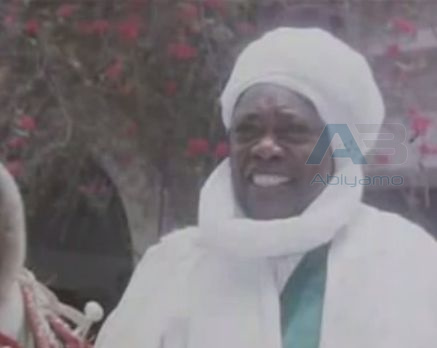
MKO Abiola with the turban.
In 1993, against the expectations of millions of Nigerians, General Babangida annulled the elections. Abiola was stunned. As the Vice-President of the National Supreme Council of Islamic Affairs, he approached his northern Muslim allies to assist but he got the shock of his life. The Sultan of Sokoto, a friend of IBB, announced that the annullment was the will of Allah meaning Abiola should sempe with a satchet of cold pure water. On the other hand, the leaders of the major Christian bodies blasted IBB and told him that he had no right whatsoever to cancel Nigeria’s fairest and freest elections.
The church did not only criticize IBB’s senseless decision but also refused to fall in line and instead called for the military dictator to honour the will of the electorate. A disappointed Abiola was told by his friends that the northern Fulani oligarchs did not trust him, a southwestern Yoruba, with such immense political power.
Some of the northern powerbrokers (especially the northern army generals who were afraid MKO would probe and jail of them should he come to power, one of them even said Abiola would become president over his dead body) even cried out that giving the Presidency to a southerner would be nothing but a political harakiri. At the end, they made calls to pull of of the NSCIA and form their own parallel southwest Yoruba faction. That all southern Muslims should withdraw from the NSCIA and establish their own body for what they considered a stinging act of betrayal.
CONTROVERSIES AND MISCONCEPTIONS ABOUT MKO ABIOLA
For a man who was immensely successful as MKO Abiola, he also had a horde of very powerful enemies who actively spread propaganda about MKO Abiola. While not entirely dismissing the fact that the late MKO Abiola might have gotten himself involved in some controversial deals especially being an executive tycoon, there are some allegations against him that do not hold any water and cannot stand even the flimsiest scrutiny. We take a look at these one after the other.
- DID MKO REALLY SINK A SHIP LOADED WITH THREE MILLION COPIES OF THE HOLY BIBLE? Although this is an incredible piece of nonsense, it is amazing how such fables gain ground and how people hold on to flimsy tales without demanding for concrete proof and evidence. If Bashorun or anyone else on earth tried such stupidity, it would make global headlines and spark trouble of unbelievable proportions. This fable should be left as it is. It is not worth sweating over.
- DID MKO ABIOLA REALLY MARRY HIS COUSIN’S DAUGHTER?
Yes.
2-WAS ABIOLA BEATEN TO DEATH?
According to Abiola’s personal physician, Ore Falomo, this is a mere fabrication.
3-WAS ABIOLA IN THE KNOW ABOUT SHONEKAN’S OVERTHROW BY ABACHA?
Yes, MKO Abiola was aware and supported it. He knew about the plot and the idea was that Sani Abacha would later hand over to him. When Abacha took over, he sent General Oladipupo Diya as an emissary to the Ooni of Ife, Oba Okunade Sijuade, Olubuse II, the Oba of Lagos, the late Oba Adeyinka Oyekan and the Oba of Benin, Erediauwa I, Omo N’Oba N’Edo Uku Akpolokpolo to seek their opinion on the matter. The monarchs told him to handover to MKO Abiola but Diya returned and told Abacha to brush the advice of the kings aside that once a soldier gets to power, that is it.
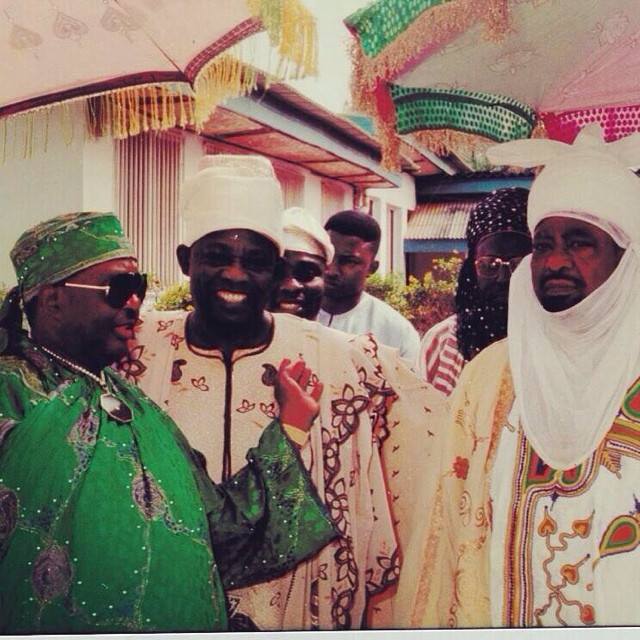
ALL DEAD: The then Ooni of Ife, Oba Okunade Sijuade; Chief Moshood Kashimawo Olawale and Emir Ado Bayero of Kano.
HIS WEALTH
Yes. Abiola was stupendously wealthy and he is easily one of the greatest philanthropists that Nigeria has ever seen. But exactly how much was the legendary MKO Abiola worth? He owned the Sierra-Leone Airline, Summit Oil, Concord Press, Concord Airline and even had his largest farm in Dakar, Senegal in addition to some of the vast farms he had in Nigeria.
HIS CHILDREN
For a man who maintained such an expansive harem, it comes as no surprise that, he is said to have around 120 children. Below are some of them:
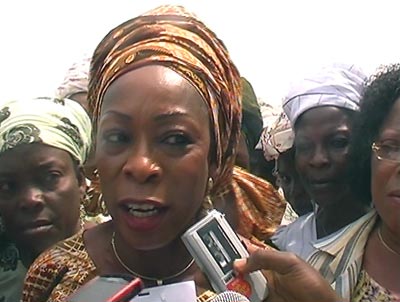
Lola Abiola-Edewor
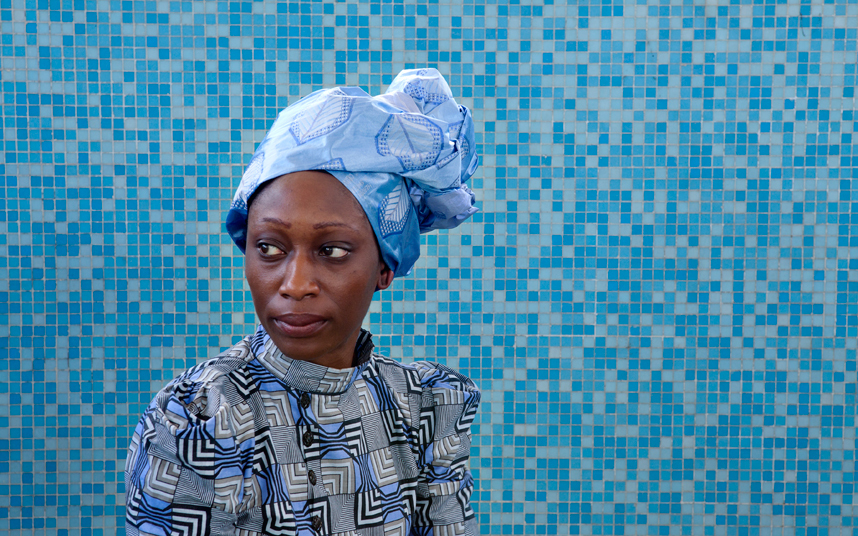
Hafsat Abiola

MKO Abiola and some of his children in an old photo.
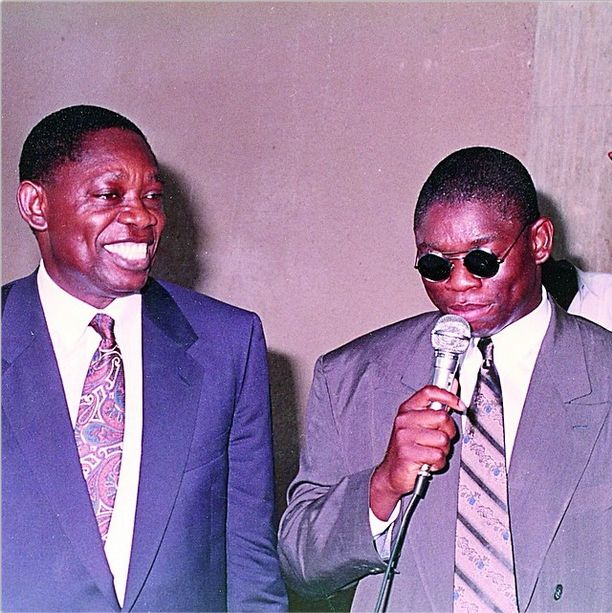
MKO Abiola & his heir Kola Abiola.
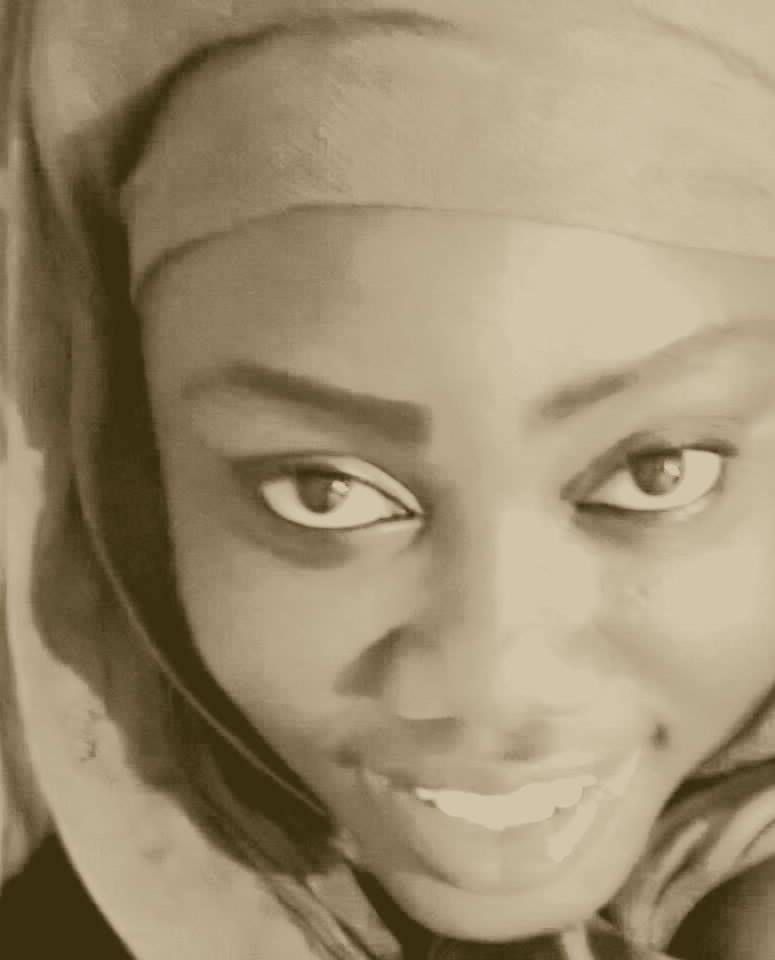
Rinsola Abiola.
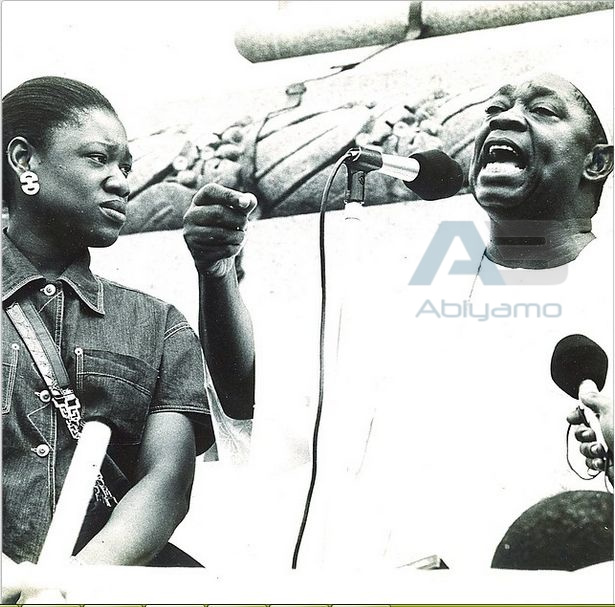
POWERFUL GENES: Wuraola Abiola and her father MKO Abiola.
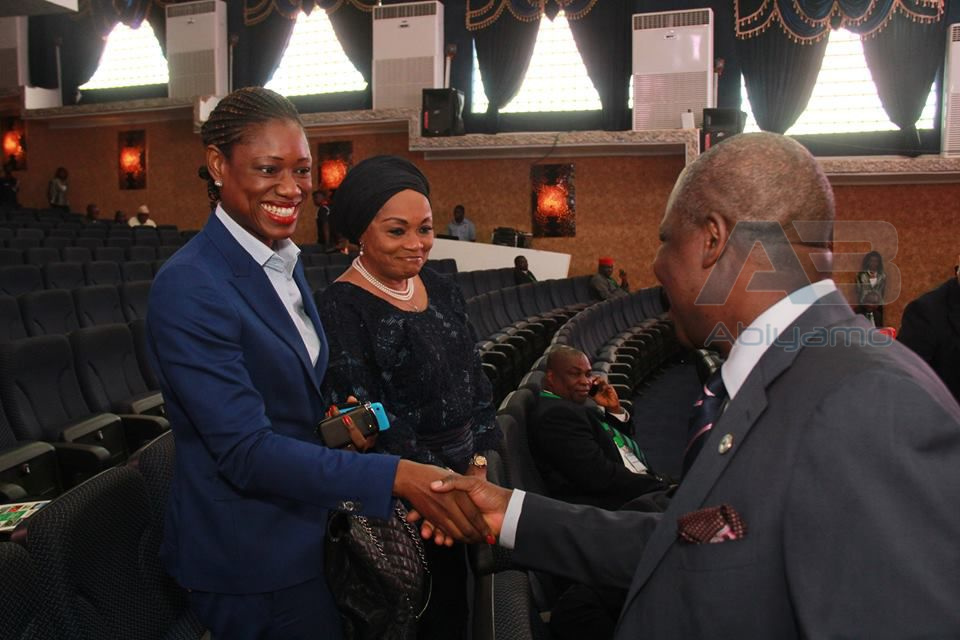
Wuraola Abiola and Ogun State Governor Ibikunle Amosun.
AND DEATH CAME CALLING
On Tuesday, the 7th of July 1998, the Nigerian Presidential Villa received some special guests. A delegation from the United States made up of Ambassador Thomas R. Pickering and Susan Rice arrived at the Akinola Aguda House (official residence of the Nigerian Vice President) at 3pm. They were in the country to plan and strategize on how the nation would transit to a civilian regime. What would later follow that day remains one of the most mysterious happenings in the annals of Nigerian history.
MKO Abiola was sleeping where they held him and he was not aware of the delegation’s visit. They just woke him up and then informed him he had to see some ‘important persons’. He stood up and brushed his teeth. He had not even taken his lunch when he followed them.
An enthusiastic Abiola met Rice and they exchanged pleasantries. He even reminded her of the dress she was wearing the first time he met her. The petite American lady let out a warm smile to Chief’s kind words. Then Ambassador Pickering remarked that Abiola must have had a very outstanding brain for him to have remembered all the details, and they all laughed. In one corner was Death in his dark robes, lurking patiently.
After a few minutes of exchanging banters, the group proceeded to start the meeting. But what the American delegation telling MKO Abiola? They were there to convince him to denounce his earlier mandate and run for another election in future. Since Abacha was already dead, the problem was becoming less complicated. But MKO Abiola had already told everyone in clear terms that was not going to happen. He had flatly refused the offer even before the American delegation came leading some to believe that Pickering and his team came for something else.
What happened next is still the stuff of fiction. Just 10 minutes to the meeting, Abiola was said to have demanded for a cup of tea. He was a great lover of the beverage but there was something quite strange that afternoon. One, his chief guard, who was assigned to him was not present as no one had told MKO he would be meeting with any visitor. Two, according to Major Hamza al-Mustapha, the Chief Security Officer to the late Sani Abacha, the American delegation with their own tea of flask. Al-Mustapha described the flask as ‘multidimensional’.
The American delegation poured Abiola some tea. They also poured some for themselves. But where in the world does the guest bring tea for the host? To cut a long story short, Bashorun Moshood Kashimawo Olawale Abiola took some sips of the tea. That would be his final gargle.
In a matter of minutes, Abiola’s countenance changed. He complained of pain in his chest and grabbed his chest. He then told the delegation to give him some minutes. He approached the toilet and by that time, he was already feeling very uncomfortable. He was having trouble breathing. Abiola did not come out of the toilet on time and they called him (why were doctors not called at this time?). He told the American delegation he was coming. By then, his voice was already weak and life was slowly ebbing out of his tired body. He was already fatigued and one can only imagine what was on his mind in those final moments of anguish. The delegation called out again if they should call a doctor. MKO told them to tell the guard to get him his painkillers and cough medication.
By the time Bashorun emerged from the toilet, he was soaked in his own sweat and was holding on to life by the thread. He sat on the couch and according to Ambassador Pickering, MKO Abiola was sweating profusely and had to remove his clothes. He also asked for the room to be properly ventilated. At that stage, Susan Rice called on one of the guards to get a doctor (but why would such an important personality be left totally with a foreign delegation, all alone without his guard or anyone present at the so-called meeting?)
Pickering said in 10 minutes a doctor had arrived but there was no ambulance so they helped carry a traumatized MKO into the car and followed him to the Aso Rock Clinic where he eventually died. For 90 minutes, doctors had tried to jerk his heart back to life but it was all unsuccessful. It was all useless. Abiola had already journeyed far. Far beyond the confines of his mortal body. Pickering stated:
Clearly, the entire team of the doctors made all possible efforts to save his life but tragically all their efforts were in vain and he died.
According to Ambassador Pickering, Abiola died between 3.20 and 3.40 pm. Their meeting had started 3.00 pm. Pickering, Rice and their delegation then extended their meeting till Wednesday before leaving the country. Following Abiola’s death, Ambassador Pickering spoke to the BBC and stated that there was the need for Nigeria to find the exact cause and nature of Abiola’s death and that his family has demanded for an autopsy conducted by a team of international specialists. Then Pickering added that there was no evidence of a foul play in MKO’s death. Hmmm…
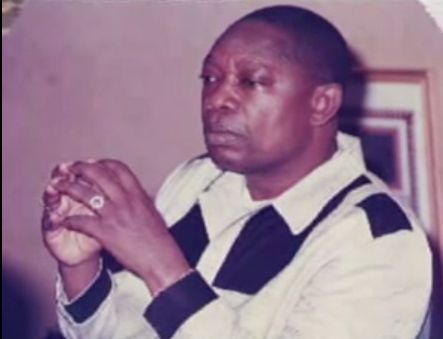
Here is some background information on Ambassador Thomas Pickering, who is now 82 years old: He was the United States Ambassador to Nigeria from the year 1981-1983 under the regime of President Shehu Shagari. He was the 17th US Undersecretary of State for Political Affairs from 1997-2000 and was in Nigeria in this capacity. He had served in the United States Navy before joining the US State Department where he worked at the Bureau of Intelligence and Research.
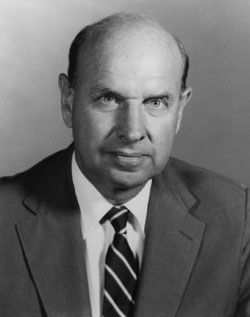
Pickering.
While US Ambassador to El Salvador in 1983, he was marked down for assassination by some politicians in the country. The same year, a US Senator urged that Pickering be dismissed from his position for helping in the manipulations of elections in El Salvador. He is regarded as one of the best American diplomats in history. The New York Times even called him ‘’arguably the best-ever U.S. representative to that body’’ in reference to the United Nations while Time magazine called him a ‘five-star general of the diplomatic corps.’
SUSAN RICE:
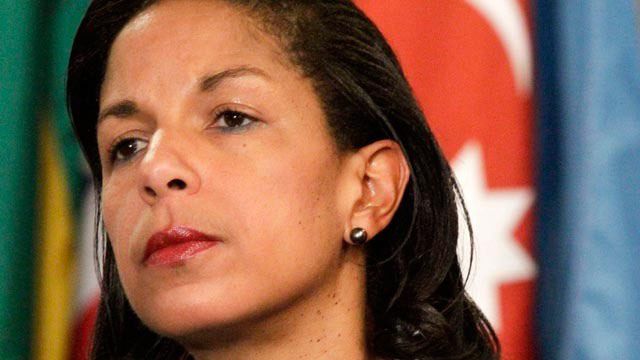
Susan Elizabeth Rice was the 12th Assistant Secretary for the Bureau of African Affairs from 1997 to 2001. In that role, she was the head of the Bureau of African Affairs within the US Department of State and her responsibility was to guide the operations and activities of the American diplomatic establishment in Sub-Saharan Africa. Another function was also to advise the US Secretary of State and the Under Secretary for Political Affairs.
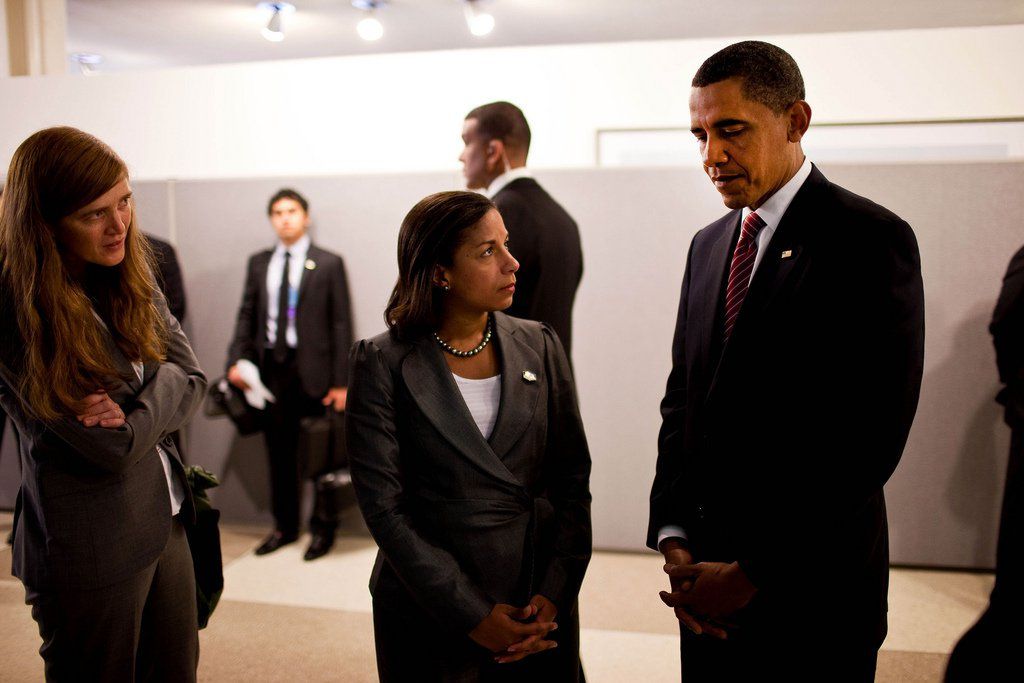
Rice and Obama.
That explains why she was part of the delegation. She was among those pencilled down by President Barack Obama to replace Hillary Clinton as the Secretary of State in 2013 but following the controversy of the Benghazi attacks in 2012 in Libya following Muammar Gaddafi’s death, her name was withdrawn. Obama later appointed her as the National Security Advisor (Assistant to the President on National Security Affairs), a role that did not need the confirmation of the US Senate.
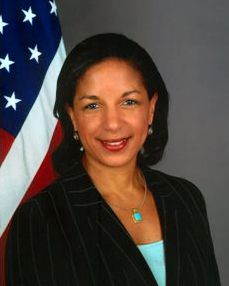
Susan Rice.
Nigerian military history is full of twists, plans, attempts, secrets and conspiracies. MKO Abiola’s death stand out as one of the most spellbinding conspiracies in the annals of the nation’s records (same goes for Abacha’s death too). There are various versions and Abiyamo will take one after the other.
THE THEODORE BETHNEL ZADOK THEORY
-While MKO Abiola was incarcerated in Abacha’s gulag, the last two years he spent in jail was under the watch of an Assistant Superintendent of Police named Theodore Bethnel Zadok. Zadok was in charge of Bashorun’s welfare while in prison. In 2001, during a petition filed by Kola Abiola, MKO’s scion and his personal physician, Ore Falomo, Zadok stated that MKO was taken away from him only to be handed over later, dead. He said MKO was dead minutes after he was offered a cup of tea. Zadok, reading from paper, narrated as follows:
PICKERING THEORY: http://news.bbc.co.uk/2/hi/africa/128491.stm
THE ORE FALOMO THEORY:
Dr. Ore Falomo was the personal physician and confidant of the late MKO Abiola and in June 2013, he stated in an interview with Punch that General Abdulsalami and the United States knew precisely what killed his late client and friend. He explained that the last time he saw and met with MKO Abiola was two weeks before his sudden death, and by that time, the Nigerian atmosphere was already saturated with rumours that Bashorun had died in detention. Ostensibly to dispel the rumours, the military arranged for him to meet with MKO. For the penultimate meeting, an army captain from the Presidential Villa was dispatched to tell Falomo that he was needed urgently at Aso Rock. He was a bit surprised why an army captain was sent because the previous meetings were arranged by the Commissioner of Police of Abuja under whom was MKO. Falomo said that when he got to Abuja, he was driven all over the city to waste time and to ensure that by the time it got dark, he would not even know the destination they were taking him to. Eventually, they came upon this bungalow.
It was a new place that they had moved Abiola to. The duo hugged warmly and Abiola seemed quite excited and forlorn at the same time. Then they started conversing in Yoruba and the military guards interrupted but later allowed them to keep talking even with the guards listening to all they were saying. Falomo told him that there were dark rumours all over the place that he had died in detention. Then, Abiola took a deep breath and told Falomo:
‘I know that I’m dead. They have dug the grave. They have put me in the grave except that they have not closed me up.’

MKO Abiola’s tomb.
Falomo was alarmed. His eyes lit up and asked his friend:
‘What happened? Have they injured you? Have they injected you?’
With another sigh, Abiola responded that none of the above was done but he just knew that the end was near, nearer than they all thought. Then all of a sudden, MKO’s mood switched and he said that he had forgotten all those that jailed him and murdered his wife and all the evils they had done to him. With eyes slowly welling up with tears, Abiola then said that it was now left to them to seek for God’s forgiveness. But as for him, he had forgiven all of them because he wanted God to forgive him too.
Falomo narrated that this was very strange and unusual of Abiola that in their previous visits, all they discussed were national matters and other issues not all these philosophy that MKO was now waxing. At that point, MKO Abiola started singing a song:
‘Nearer to my God to Thee, nearer to Thee…’
(For those who do not know, Abiola used to Christian songs even though he was a Muslim and while in Abacha’s jail, he would sing various songs all to himself).
When he finished singing the song in English, he switched to the Yoruba version. Then he stood up, hugged Falomo and both of them broke down in tears. It was a spontaneous flood of emotion as both grown-up men wept like babies. Falomo, through his own steaming tears too, tried to calm MKO down and reassure him because he did not even have any idea of what MKO saw that he was behaving so strange all of a sudden.
Surprisingly, the overzealous guards did not even tell them that time was up. Perhaps they were also touched by the heart-wrenching display of emotion by a man on whose life many had pinned their hopes. After the sober encounter, Falomo left, promising him to tell the story to the world. Falomo would see him briefly one more time to change his toiletries and he stated that all through this period, MKO did not show any signs or symptoms of any illness or disease and spoke with a very sound mind. Days later, MKO Abiola was gone, to the Great Beyond.
While in jail, Abiola was visited by Chief Emeka Anyaoku, the former Secretary-General of the Commonwealth who also stated that he was in good health and in high spirits. By then, rumours were all over the nation that Abubakar would release MKO, Falomo told him of this rumour but what did Abiola do? He sneered at the gossip and declared that he did not believe that the military would just release him like that. Not even the hearsay that he would not be charged to court (Chief Rotimi Williams had said that the government had any evidence against him) could convince him.
Throughout his time in Abacha’s gulag, MKO Abiola was prevailed upon to renounce his mandate and regain his freedom. But Bashorun refused. He would rather die than bow his bemedalled head before some men simply because they wore the uniform and carried guns. After Abacha’s death, the same offer came up. MKO was told to forget about his mandate and be free and then wait till a future election. But again, he held fast to his dream.
THE POSTMORTEM
After Abiola’s death, the Nigerian Head of State sent a presidential jet to the Presidential Wing of the Murtala Muhammed Airport, Lagos through Buba Marwa, the military administrator of Lagos to ferry Ore Falomo, Abiola’s personal physician to Abuja. He refused to fly to Abuja and blasted Abubakar’s personal physician who called him on phone to quickly hurry to Abuja that he was not going to come and that if they had killed Abiola that they should eat him (yes, those were his words). An angered Falomo who was already given an appointment to see MKO in two weeks then delegated Professor Oye Adeniran to represent him.
Upon telling Kola Abiola, MKO’s son, Kola said they should go to Abuja (he had already known of his father’s death before Falomo heard it on the BBC while inside Kola’s car and by the time they got to Maryland area, riots and violent protests had already broke out, they narrowly escaped with the vehicle intact), he insisted he would not fly to Abuja. Governor Buba Marwa then called him on phone again to fly to Abuja that the pilot and others were already waiting for him and that he would send a car to come pick them but Falomo must have taken after MKO with his stubbornness, he told Marwa he was going nowhere.
However, he told Kola that the family should not go ahead with a hasty burial (the military authorities were already talking to two of MKO’s wives about a quick burial in line with Islamic traditions) and left standing instructions with Professor Adeniran that Abiola’s burial be delayed. Thereafter, MKO’s body was embalmed, wheeled into the morgue where it waited for the probing dissections of a team of international pathologists.
The autopsy carried out the late MKO Abiola showed that his gastrointestinal tract was clear indicating that he had not eaten for hours as at the time of death. At the end of the autopsy, the team concluded that Abiola died of natural causes, that his heart did not get enough blood supply as a result of some vascular troubles. However, his personal physician, Falomo, would have none of that. He insisted that for someone like Abiola who was well to suddenly die of a heart attack was very suspicious. He stated categorically that something must have triggered the malformation in the rhythm of Abiola’s heart.
Falomo has called for the government to probe deeper into the mysteries surrounding Abiola’s death. Well, in medicine, there are various agents that can affect the activity of the heart. They can make it beat faster, reduce the rate, modify the strength of each beat or even stop it totally. These agents can be drugs or poisons depending on the dose. Some leave traces in the system while some others disappear quickly depending on their bioavailability, rate of elimination and other pharmacokinetic factors.
THE BURIAL
After his sudden death, an entire nation was thrown into grief. A dark cloud over Nigeria refused to drift away. At 8.03am that fateful morning, a vehicle of the Diplomatic Corps marked CD 140 drove into MKO Abiola’s sprawling home. Inside the car were the remains of the owner of the house but this particular day he would not be sleeping in his own house, he would be sleeping outside, underground. The War General had come home from battle, to finally rest. The Bashorun was home, Aare Ona Kakanfo was finally back, just as he has said.

MORTALITY: MKO’s corpse in the burial shroud ready for interment. A cleric prays for the repose of his soul.
Just as his death was an uneasy one, his burial was also a hectic event. For a man who received over 14 million votes from Nigerians all over the country, not a few were determined to give MKO Abiola a most befitting burial, the kind the nation has never seen before.
On the day of his burial, the Nigerian government was evidently not going to take chances and allow the event in Lagos to snowball out of control. Thus, there was an unprecedented display of force and military might. Scary-looking and menacingly-armed mobile policemen filled 22 vehicles of the Operation Sweep and they were strategically positioned to control any spontaneous outburst of anger from a thoroughly disenchanted populace. To back up the Operation Sweep vehicles was an armoured tank and a military helicopter that kept hovering overhead like the Sword of Damocles.
However, all the braggadocio of the military apparatus could not deter determined Nigerians who would face anything to give their hero and martyr a most memorable exit ceremony. Over 5,000 students from the University of Lagos, Lagos State University (LASU) and the Yaba College of Technology (YABATECH) poured out on the streets with defiance.
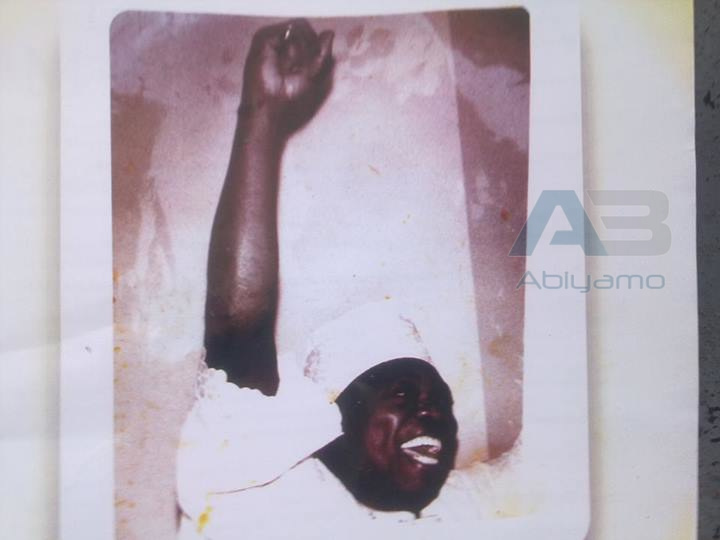
Millions of Nigerians consider MKO to be the most remarkable martyr of democracy in the country.
The hearse bringing Abiola’s corpse to his house in Lagos below:


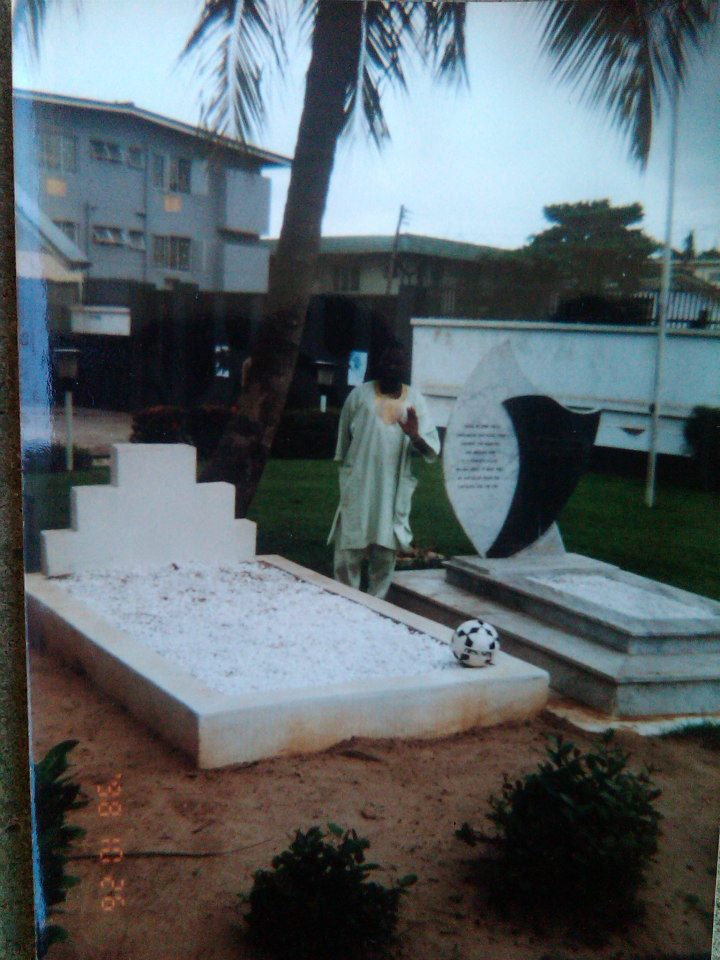
The graves of MKO Abiola and his wife, Simbiat.
HONOURS, TITLES, AWARDS AND LAURELS
Now, this is where MKO beats them all. It is quite difficult to think of any other Nigerian that is as bemedalled as MKO Abiola. Even Leonid Brezhnev would have sneered in envy…lol! The following are some of the honours bestowed on the late in-law of the Gbaguras.
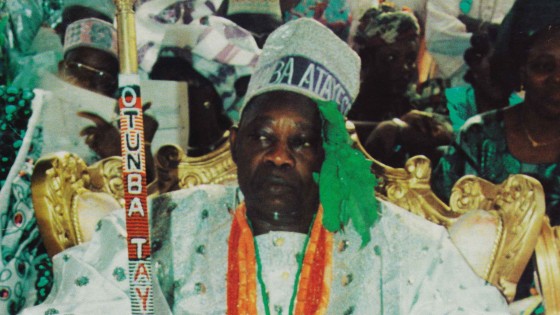
-The Aare Ona Kakanfo of Yorubaland and the Bashorun of Ibadan. This is a very rare feat but MKO Abiola held these two titles simultaneously. They remain two of the most revered titles in Yorubaland.
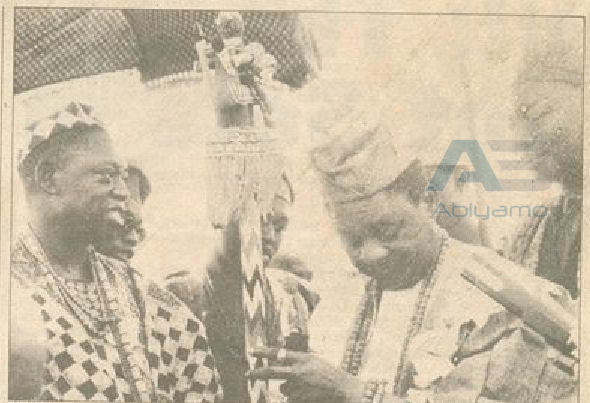
MKO Abiola during his installation as the Aare Ona Kakanfo of Yorubaland.
The Aare Ona Kakanfo is a military title given to the head of the Eshos (the Alaafin of Oyo’s special military force) who also doubles as the Field Marshal, Generalissimo, or War Commander of the Yoruba Army. In the days of old when the Old Oyo Empire commanded a lot of relevance, the Aare Ona Kakanfo was given only to the greatest military strategist and tactician.
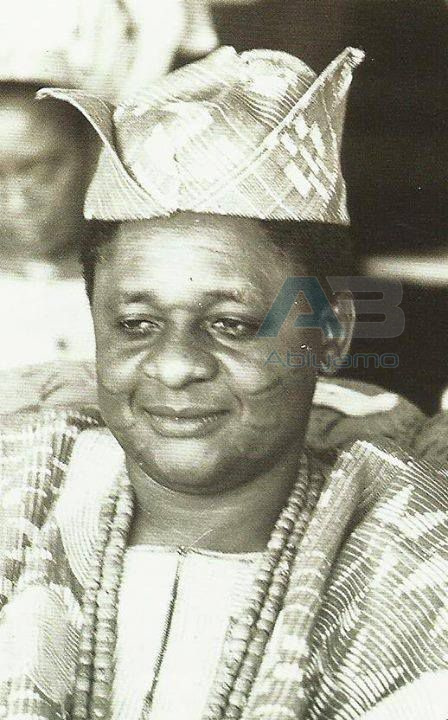
The Alaafin of Oyo had nothing but undying love for the late MKO Abiola. He crowned him the Aare Ona Kakanfo of Yorubaland.
For a man in charge of a well-trained military force, the post is one that came with a lot of responsibilities. The post also came with rigorous initiation rites. Before MKO, the late Chief Samuel Ladoke Akintola was the Aare Ona Kakanfo, he was assassinated in 1966 and it was not until 22 years later that MKO Abiola was given the title in 1988. Since MKO Abiola’s death in 1998, Yorubaland has remained Aare Ona Kakanfo-less. Former President Olusegun Obasanjo was said to have surreptitiously worked for the title but for now, Yorubas simply have no Field Marshal. The Aare Ona Kakanfo remains the single greatest honour that can be bestowed on a man in Yorubaland.

DYNAMIC RIVALS: MKO Abiola and Chief Olusegun Obasanjo
Before anyone would fully take on the garb of the Aare Ona Kakanfo, he would be made to pass through some really interesting stages. One, the head is cleanly shaven to ensure that not even a single strand is left. Once that is done, 201 incisions are made on the shiny scalp of the prospective Field Marshal. Please note that these incisions are made with 201 DIFFERENT blades. Once the cuts are made, specially-prepared mixtures and ingredients from 201 DIFFERENT containers or pouches are rubbed into the cuts. The belief then was that the infusion of these ingredients would make the Aare Ona Kakanfo bold and fearless, the painful process is also expected to embolden his heart and toughen him up (and why am I suddenly thinking of transdermal patches?). Tenacity of character and an endless courage were features identified with the Aare Ona Kakanfos. They were even regarded as stubborn and heady by some.
Historical records have it that residents or citizens of Oyo Empire were never made the Aare Ona Kakanfos because an Aare Ona Kakanfo as the supreme military commander was expected to over-ride the decisions of the Alaafin of Oyo if the need be (something like the Chief of Defence Staff over-riding the orders of the President, just that in this case, the President, i.e the Alaafin is not the Commander-in-Chief of the Armed Forces).
In order to add to the tasks of the Aare Ona Kakanfo as the Commander of the Alaafin’s Army and all of Yorubaland, he is expected to go to lead all the cavalrymen and soldiers to battlefield at least once in three years on the direct orders of the Alaafin. Within three months of reaching the battlefront, the Aare Ona Kakanfo has only two options: to return as a victorious war general or be returned home as a corpse, killed on the warfront. In short, the post was not for the faint-hearted. While in Abacha’s jail, MKO was aware of his role as an Aare Ona Kakanfo and remained incorrigibly focused on regaining his mandate despite all of Abacha’s entreaties and later, torture. For MKO, the battle for his mandate had gone beyond personal, it was now all-out-war with Abacha and his ruthless junta. Like a true Aare Ona Kakanfo, MKO Abiola fought his battle to the very end.
He was the 14th Aare Ona Kakanfo. His predecessors were: Kokoro Gangan (Iwoye), Oyatope (Iwoye), Oyabi (Ajase), Adeta (Jabata), Oku (Jabata), Afonja (Ilorin), Toyeje (Ogbomoso), Edun (Gbogun), Amepo (Abemo), Kurumi (Ijaye), Ojo Aburumaku (son of Toyeje of Ogbomoso), Latoosa (Ibadan) and Ladoke Akintola (Ogbomoso). Akintola mounted resistance and opened fire on armed soldiers who attacked him in 1966 before he was assassinated. Because of the often violent and tragic endings of many Aare Ona Kakanfos, some hold the belief that the title is jinxed. Some even state that the cursed Alaafin Aole placed on Afonja of Ilorin is the reason for the unfortunate deaths of the Aare Ona Kakanfos but Abiyamo does not just subscribe to this idea of curses being transferred via a gene pool or something.
Legend has it that the Aare Ona Kakanfo carries no weapon in battle, except what is known as the ‘King’s Invincible Weapon’. The war attire of the Aare Ona Kakanfo was a cap made with tufts of the red feathers of a parrot which can reach his waist and a waist band made from leopard’s skin.
-MKO was also the Bobagunwa of Egbaland.
-January 1991: First Chancellor, Oyo State University of Technology (OSUTECH), now referred to as the Ladoke Akintola University of Technology (LAUTECH). The name was changed after Oyo and Osun went their separate ways.
-July 1987: He received the Life Membership Award of the National Association for the Advancement of Colored People (NAACP), America’s biggest civil rights organization.
-September 1987: Honoured with the Golden Key of the City of Washington DC by Mayor Marion Barry.
-1998: Businessman of the Year Award, Los Angeles, California, USA. He was the first African ever to be so honoured. The award was given to him in appreciation of his ‘economic contributions to the upliftment of Africans and blacks in diaspora’.
-Order of Merit in Gold, Confederation of African Football’s highest honour. A pillar of sports, Bashorun had rendered immense financial support to the CAF, Amateur Boxing Association, the Super Eagles (which got numerous donations from him) and many other sporting bodies.
-In its August/September 2004 edition (No.432), the New African magazine named MKO Abiola as one of the 1oo Greatest Africans. Others on the list included Fela, Chinua Achebe and Kwame Nkrumah.
-Probably, MKO Abiola was sung about by Nigerian musicians more than any other individual in the nation’s history. Enjoy some of the songs below: King Sunny Ade:
[embedded content]
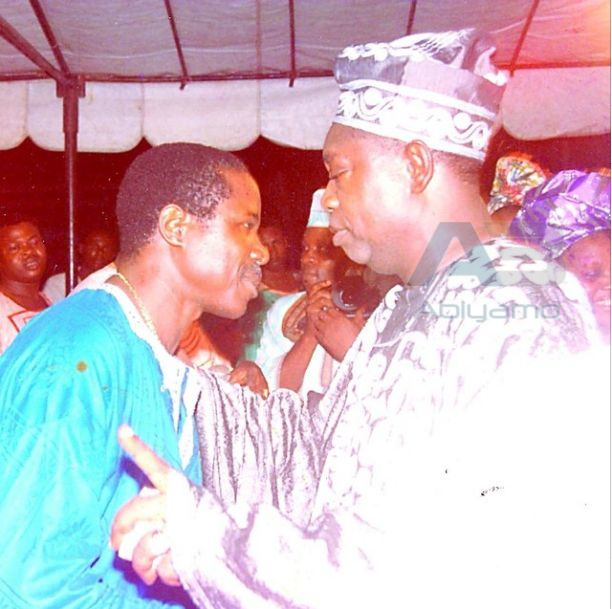
Nigerian music legend, King Sunny Ade listening to MKO Abiola.
IN HIS REMEMBRANCE
Bashorun MKO Abiola Lecture:
Organized by the Africa Studies Association (ASA), the Bashorun MKO Abiola Lecture is awarded annually to a senior African scholar who then presents a lecture at the Annual ASA Meeting. It was established in the year 1992 with a generous fund from MKO himself and it runs till today. Past winners have included the legendary Ghanaian writer, Professor Ama Ata Aadoo, Ali Mazrui and Wande Abimbola. Check out a list of all the winners here: http://www.africanstudies.org/awards-prizes/bashorun-mko-abiola
-A fiery Ewi poet, Kunle Ologundudu released an album that he titled Iku Abiola (Abiola’s Death). He had burst on the scene in June 1993 when he waxed a song Mokago June 12 (Raise The Alarm on June 12, it is not ‘Pound the Alarm’ o…lol!) criticizing the annullment of the results of the presidential elections.
-Another Yoruba Ewi exponent, Alhaji Olanrewaju Adepoju also waxed very interesting songs on MKO.
2013 JUNE 12 RALLIES:
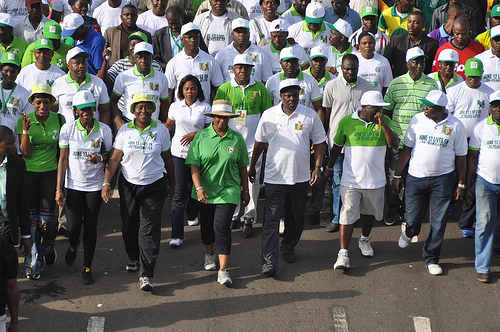
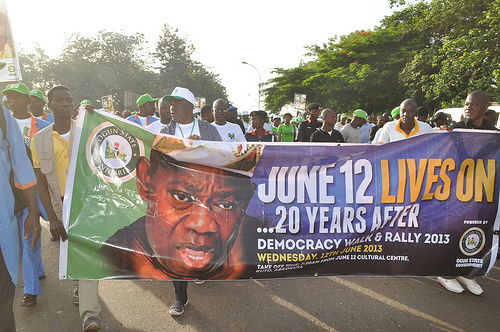
The Moshood Abiola Stadium in Ogun State was named for him. Former President Goodluck Jonathan made attempts to rename the University of Lagos after the late MKO Abiola.

MKO Abiola International Stadium, named in his honour.
-General Sani Abacha was ready to release MKO Abiola from prison and even refund him for all the expenses that went to his presidential campaign and elections. But there was just one single condition attached: MKO would renounce his mandate. And that was where the Aare Ona Kakanfo plus the Bashorun in Moshood Kashimawo Olawale Abiola showed its real face. Abiola could have betrayed his conscience, surrendered to Abacha’s crippling conditions and let down the over 14 million Nigerians who voted for him. There are also some reports that NADECO piled pressure on Abiola to declare himself president then later piled more pressure on him not to accept Abacha’s offer.
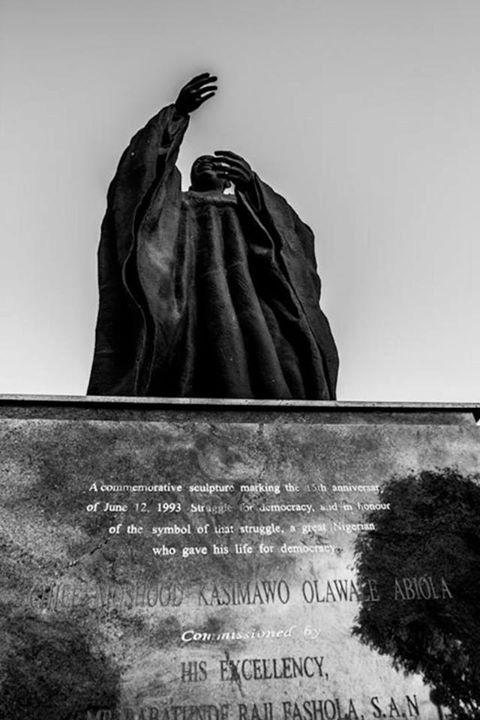
MKO Abiola Statue in Lagos State.
But MKO Abiola would not be moved by Abacha’s vituperations. Not even the brutal assassination of his lover and wife, Kudirat, could bend his unflinching will. Not even Abacha’s brutal clampdown on his octopodal business empire could crack MKO’s determination. He was a man, flawed like everyone else, made costly mistakes, but he also shone, with the light of his philanthropy, and if there was any lesson MKO taught us as Nigerians, it was believing and dying for a cause we truly hold dear.

Kudirat Abiola’s assassination is regarded as one of the most senseless killings in Nigeria’s history.
When Kofi Annan came to meet him days before he was arranged to be released, the Ghanaian diplomat told MKO that he would have to forget about the presidency if he was to go home free. MKO Abiola flatly refused. He said the mandate was no longer his own load alone, that it was now the cross of millions of Nigerians too. He died a fighter, for democracy.

MKO & Kudi Abiola. Credits: AsabeAfrika.com
I pray the current goons in power today do not make a mess of his sacrifice, and that of the countless unknown protesters killed during IBB and Abacha’s regimes or even during the Occupy Nigeria protests simply because they stood for and fought for one thing they shared with MKO: hope. Nigerian leaders should do not deprive the people of hope, for that may be the only thing they have left. Nigerian leaders, do not deprive us of the hope of a brighter future, especially when you cannot lay down your lives for such a future. Goodnight, Bashorun.

Laying wreath on MKO Abiola’s grave.
CREDITS AND REFERENCES
- http://topetempler.wordpress.com/2013/06/12/june-12-as-an-industry-in-nigeria/
- MKO Abiola on June 12 Mandate by Lai Olurode, Rebonik Publications, 1993.
- MKO Abiola, The Great Achiever by J.F Brigue, Birsill Konsell Limited, 1993.
- How MKO Abiola Signed His Own Death Warrant by Wole Adejumo http://thestreetjournal.org/2013/07/how-mko-abiola-signed-his-own-death-warrant/
- Oyo Empire: http://en.wikipedia.org/wiki/Oyo_Empire
- Who Becomes The Aare Ona Kakanfo: http://olalekanakogun.blogspot.com/2012/08/who-becomes-aare-ona-kakanfo-of_23.html
- The News, Volume 15, Issues 13-26, page 19.
- How Abacha, Abiola Died In My Hands: http://sundaytrust.com.ng/index.php/top-stories/13727-how-abacha-abiola-died-in-my-hands-former-aso-rock-chief-physician-wali
- http://io9.com/5942161/the-deadliest-poisons-in-history-and-why-people-stopped-using-them
- http://en.wikipedia.org/wiki/Strychnine
- http://www.mayoclinic.com/health/heart-failure/DS00061/DSECTION=symptoms
- Nigeria: Set Aside By God for Greatness and The Untold Story of the June 12 Annulment by Adesina Adedipe, Paramount Communications, 2004.
- Trials and Triumphs: The Story of The NEWS by Wale Adebanwi
- African Studies Association Awards and Prizes http://www.africanstudies.org/awards-prizes/bashorun-mko-abiola
- Deliver Us From Evil: Warlords, Peacekeepers and a World of Endless Conflict(2000) by William Shawcross http://www.thirdworldtraveler.com/Genocide/Political_Prison_DUFE.html
- http://en.wikipedia.org/wiki/UNSCOM
- http://en.wikipedia.org/wiki/Kofi_Annan
- Nigeria Takes First Step on Freedom Road by William Shawcross, The London Sunday Times, 7th July, 1998.
- http://www.goodreads.com/work/quotes/1492580-bhagavadg-t
- http://news.bbc.co.uk/2/hi/africa/128491.stm
- http://www.punchng.com/feature/interview/us-abubakar-knew-what-killed-abiola-dr-falomo/
- http://www.timeanddate.com/calendar/?year=1998
- http://en.wikipedia.org/wiki/Thomas_R._Pickering
- http://history.state.gov/departmenthistory/people/pickering-thomas-reeve
- http://www.academyofdiplomacy.org/members/bios/pickering.htm
- http://en.wikipedia.org/wiki/Susan_E._Rice
- Owners of Nigeria by Seyi Oduyela: http://nigeriaworld.com/feature/publication/oduyela/092004.html
- Democratization and Islamic Law: The Sharia Conflict in Nigeria by Johannes Harnischfeger.
- http://pmnewsnigeria.com/about-2/
- http://en.wikipedia.org/wiki/Babafemi_Ojudu
- http://en.wikipedia.org/wiki/P.M._News
- DOCUMENT – NIGERIA: FEAR OF ILL-TREATMENT / POSSIBLE PRISONER OF CONSCIENCE: BAYO ONANUGA: http://www.amnesty.org/en/library/asset/AFR44/021/1996/en/98e91555-eae7-11dd-b22b-3f24cef8f6d8/afr440211996en.html
- Repressive State and Resurgent Media under Nigeria’s Military Dictatorship by Ayo Olukotun.
- The Palace Coup of 1985: http://www.waado.org/nigerdelta/nigeria_facts/MilitaryRule/Omoigui/PalaceCoup-1985II.htm
- http://en.wikipedia.org/wiki/National_Security_Advisor_(United_States)
- http://en.wikipedia.org/wiki/Assistant_Secretary_of_State_for_African_Affairs
- http://www.tribune.com.ng/news2013/index.php/en/component/k2/item/14999-how-babangida-betrayed-my-husband-%E2%80%94mko-abiola%E2%80%99s-wife.html
- Abacha: The Myth, The Man by Uche Ezechukwu
- Regional Perspectives on Labour and Unemployment by Karl Wohlmuth
- mkoabiola.org
This article was originally published by onlinenigeria.
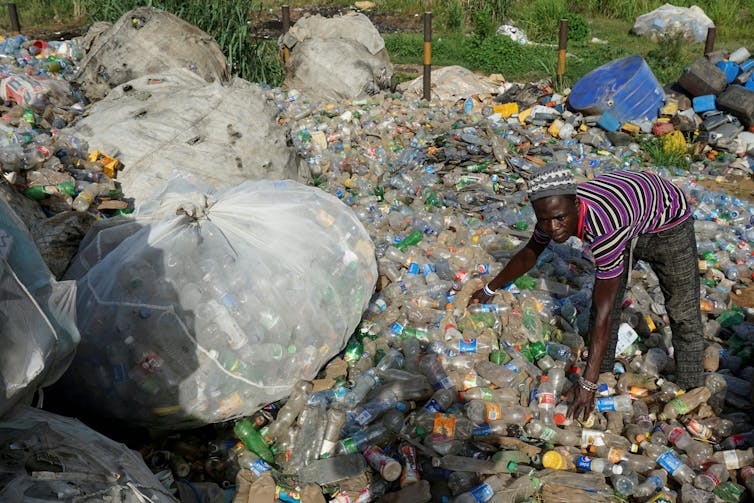
Emmanuel O. Akindele, Obafemi Awolowo University
A key theme at this year’s United Nations Environment Assembly in Kenya is plastic pollution. It will be returning to a theme from 2018 World Environment Day. The evidence for the prevalence and consequences of plastic pollution has been building up and the assembly needs to lead action on this issue.
Individuals, communities, businesses, and governments all have a part to play to reduce plastic pollution in their environments.
The 2018 World Environment Day provided much-needed impetus for some countries to launch or appraise their plastic pollution initiatives. An example is India, which committed itself to proscribing and eliminating all single-use plastics in all Indian states by 2022. Many Indian states have keyed into this initiative and a national ban on most single-use plastics is due to take effect from 1 July 2022.
Unfortunately, Nigeria hasn’t done much in this regard. Compared to other developing countries such as Kenya, Rwanda, Uganda and Tanzania, its commitments to combating plastic pollution are far below average.
Plastic pollution thrives in Nigeria
Lagos, Nigeria’s megacity of nearly 16 million people, produces between 13,000 and 15,000 tonnes of waste per day, including 2,250 tonnes of plastic, according to a local recycling business.
Nigerian lawmakers considered a bill in 2019 to prohibit the use of plastic bags. The bill is still in limbo. It is yet to undergo further reading and has not been enacted into law. Consequently, plastic bags are being indiscriminately used in Nigeria.
The evidence of the harm this does is mounting.
My research group published the first empirical finding of freshwater microplastics in Nigeria. We used snails from the Osun River in southwest Nigeria as biological indicators of plastic pollution. Snails in the river had consumed polyethylene plastic bags, which were common along riverbanks.
We have also found plastic polymers such as polyester, polypropylene, acrylonitrile butadiene styrene, styrene-ethylene butylene styrene, and chlorinated polyethylene in the Osun and Ogun Rivers. The plastic polymers recorded in our study are traceable to different sources such as textiles, biscuit wrappers, automotive tyre cords, bottle caps, and drinking straws. We also saw larger items in the rivers, such as tyres, plastic bags and plastic bottles. Studies indicate that such plastics could affect the life history, survival, growth and development of insect larvae into adults.
Our studies of plastic pollution in Nigeria, particularly freshwater and marine environments, have recorded plastics in fish too.
Effects of plastics
When animals ingest plastics, it blocks the gut and windpipe and reduces their physiological fitness. Aquatic animals can also become entangled in plastics, resulting in malnutrition and death.
Plastics degrade the aesthetic value of Nigerian landscapes and aquatic systems. This compromises cultural ecosystem services such as ecotourism.
Plastic pollution has become such a serious problem in Nigeria that it has virtually become a sign of human activity or visits to a location. People who visit beaches, riverbanks, parks and waterfalls frequently dump their plastic bottles carelessly, despite the dangers that such plastics pose to the environment.
In one case, plastic bottles were found at a natural site where an ecologically important rare insect was found.
Our studies show that plastic can affect the water-holding capacity of drains, river channels and reservoirs. This leads to flooding of adjacent lands and loss of biological diversity and livelihoods.
Losing natural sites to plastic pollution also means people don’t get the health benefits of outdoor activity.
Action to end plastic pollution in Nigeria
Combating plastic pollution in Nigeria will require action on several fronts.
The first step will be to address poor waste management practices prevalent in the country.
Also, businesses will have to stop providing free plastic bags. These bags are often discarded after a single use.
To discourage the practice, governments should levy a high fee on each plastic bag that shoppers get at malls and markets. Paying for a bag could discourage people from discarding them after a single use. Paper bags, used in Uganda, should be encouraged. Since packaging is the leading cause of plastic pollution in the environment, the Nigerian government needs to launch a campaign and crack down on plastic bags and bottles in the country. The public will need to be educated on the three Rs: reduce, recycle, and reuse plastic materials.
Water sachets and bottles have proliferated in Nigeria due to a lack of drinkable water in many homes. The government needs to educate the public about the dangers of discarding water sachets and bottles in the environment. And it must ensure access to clean water.
Whatever strategy the government employs will be ineffective unless the long-awaited “plastic pollution bill” is passed by Nigerian legislators and swiftly signed into law.
Citizens and leaders have the responsibility of bequeathing an environment that future Nigerians can be proud of. Kenya, Uganda, Tanzania, Rwanda, and other countries have taken steps to protect their environments from more plastic pollution. Nigeria can no longer afford to wait.![]()
Emmanuel O. Akindele, Senior Lecturer, Obafemi Awolowo University
This article is republished from The Conversation under a Creative Commons license. Read the original article.
Tukur Mamu, the self acclaimed lead negotiator between the Federal Government and bandits, has confirmed that “as a result of series of robust engagement on the approval of the federal government with Sheikh Dr. Ahmad Gumi’s, some victims of the Abuja-Kaduna bound kidnapped train victims have regained their freedom.”
“The abductors have initially vowed to stop feeding their victims and even threatened to start killing them if FG did not address their grievances,” Mamu, who is also the publisher of Desert Herald newspapers, said this Saturday evening, June 11, 2022.
He further confirmed that “contrary to their earlier commitment to release all the women in their custody a total number of 11 victims were released on Saturday 11th June, 2022.
“They include six females and five males that include Jessy John, Amina Ba’aba Mohammed (Gamba), Rashida Yusuf Busari, Hannah Ajewole and Amina Jibril. Others include Najib Mohammed Daiharu, Gaius Gambo, Hassan Aliyu, Peace A. Boy and Danjuma Sa’idu.
“We have succeeded in building confidence now, we will do everything to sustain it in the interest of the innocent victims that are still in captivity.
“It’s a painful and frustrating process but it must be done if we are to secure the precious lives of the remaining victims.
“The good news is our collective efforts have succeeded in securing the release of 11 of the victims so far. With the continued support of the FG all the remaining victims will be release soon Insha Allah.”
Continuing, Mamu said: “President Buhari must be commended for understanding the gravity of the crisis and for giving directives to the security agencies. The CDS, Gen. Irabor, has done excellently well under the circumstance. The Army and the DSS have played the crucial role. There is no military solution to this predicament.
“But behind the scene, Sheikh Gumi by Allah’s will made it possible. He was involved from the day I started. In fact, I accepted that role because of his directives to that effect. Even the final arrangement of how and the safest place to get the victims was arranged and coordinated by him.”
When asked by reporters whether the teenage children of the kidnappers were released in line with the abductors demand and whether money was involved, Mamu said: “I think it is the government that supposed to respond to that question.
“We are only concerned stakeholders with the privilege to compliment government efforts but I can assure you and I can confirm that no money is involved. I believe the urgent priority now for the government and us is how to safely secure the release of the remaining victims.
“Even after that is done there should be security especially on the rail lines and that can only be achieved through mediation not the use of force because it is now very clear to everybody that our roads, our rail lines are vulnerable to attacks. Using the train especially for Abuja-Kaduna travels in view of the decaying condition of that road and its security implications remains the safest way to ensure and guarantee passengers safety.”
Kaduna State Commissioner of Internal Security and Home Affairs Samuel Aruwan is yet to respond to calls and WhatsApp message sent to his number.


